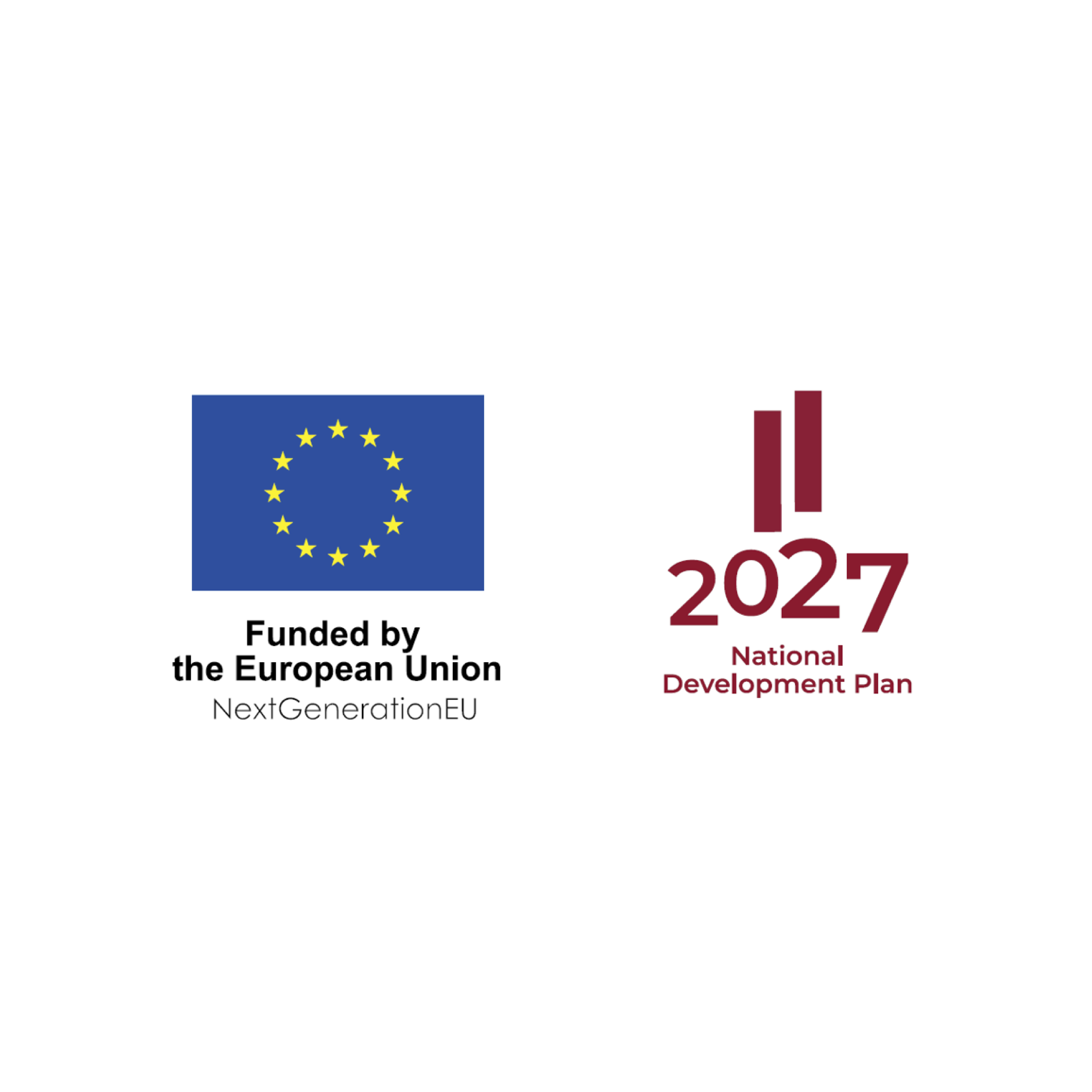December 31
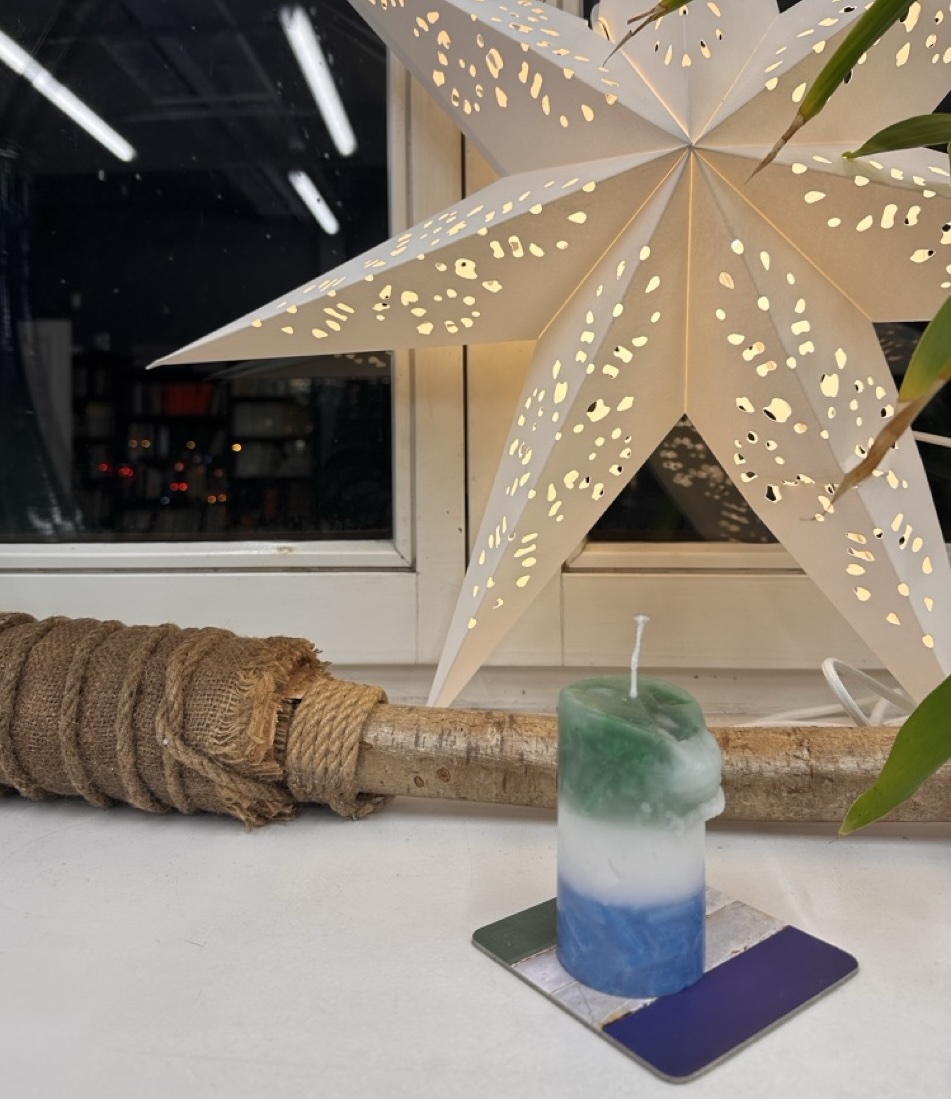
December 27
The issue of the journal “Baltic Journal of Modern Computing” has been published, with a collection of selected articles from the Baltic Digital Humanities Forum (2024).
The collection includes the article “A Balanced Vocabulary Without a Balanced Corpus: The Livonian Case” by the institute’s leading researcher and director, Valts Ernštreits. The collection is available here.
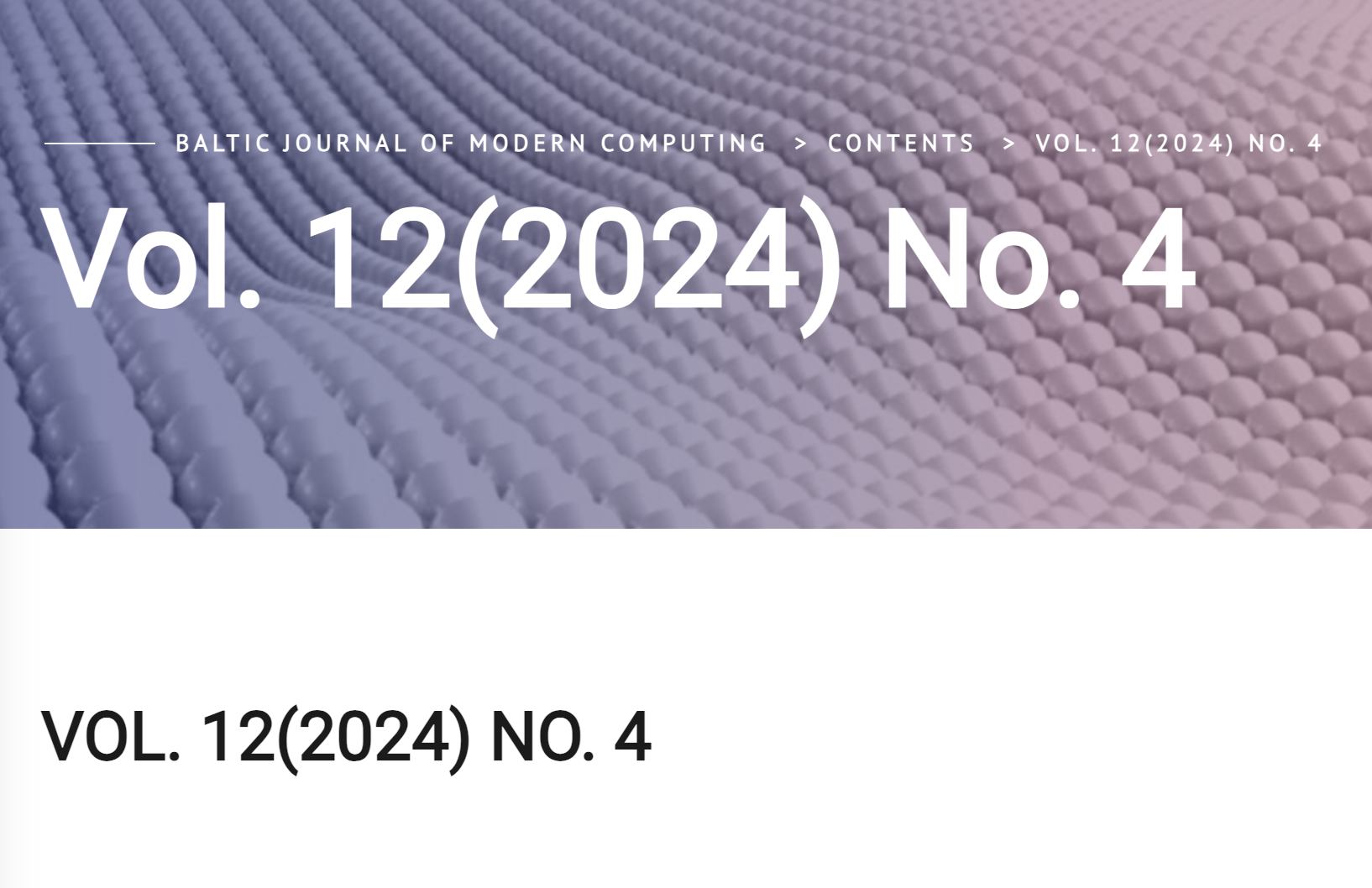
December 23
Knašīdi, armõ ja līvõ kīeldõ täuži Taļžpivḑi!
Wishing you a Christmas full of light, warmth and Livonian!
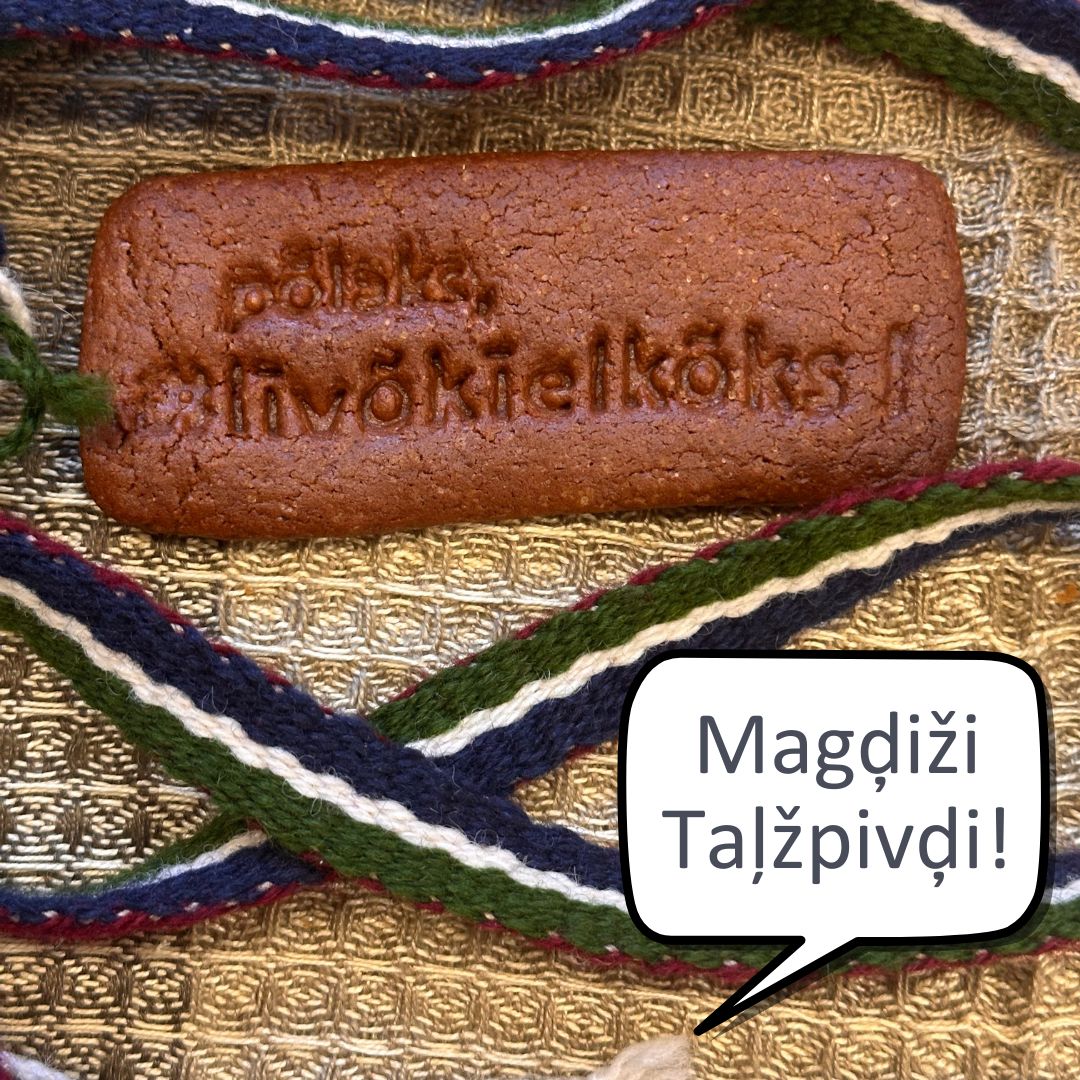
December 16
The children and youngsters from the Livonian children and youth summer school “Mierlinkizt” and the Livonian language course of the Livonian Institute of the University of Latvia, teachers and friends at the institute happily celebrated the approaching Christmas festivities.
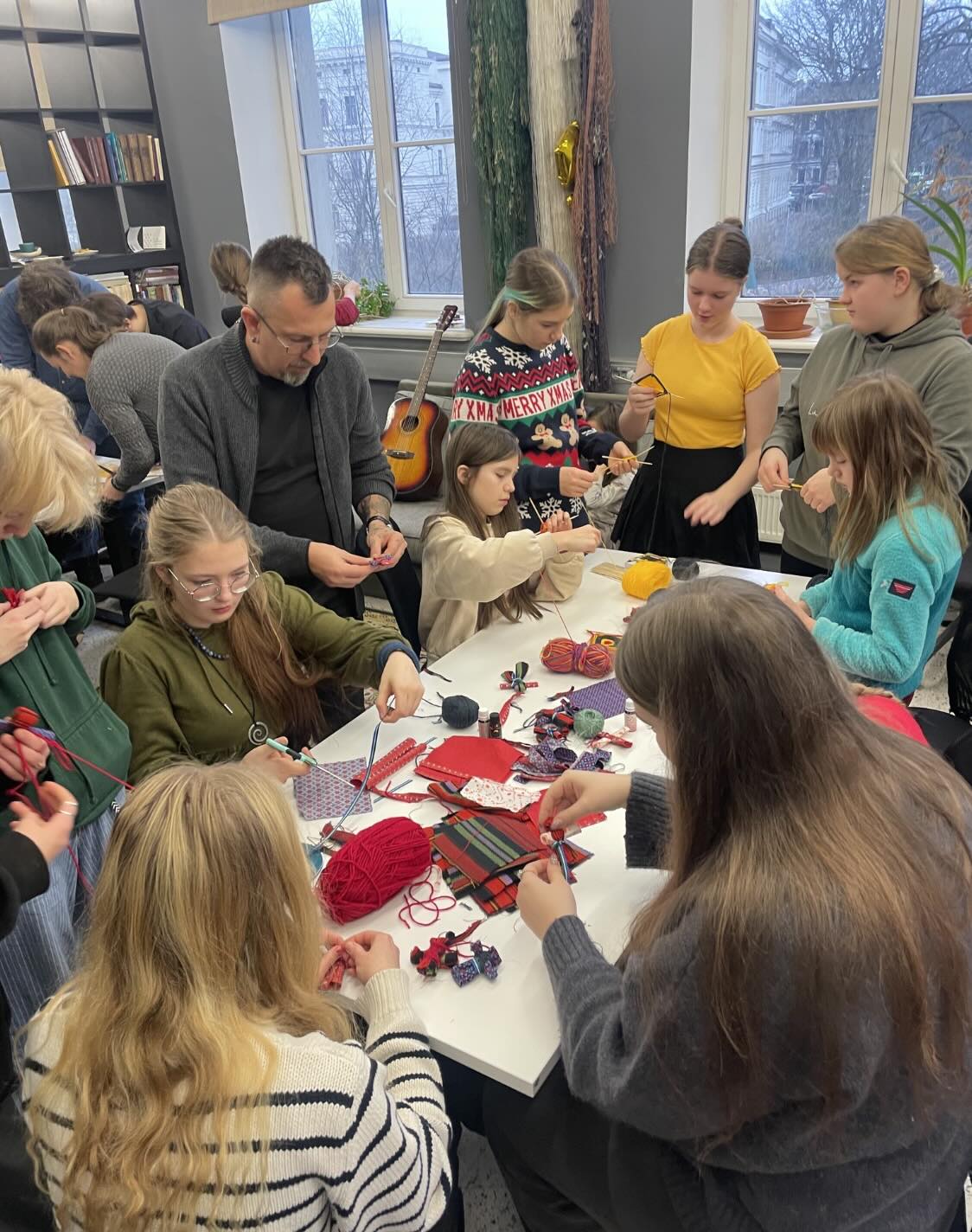
December 12
The article “Unveiling Tonal Contrasts in the Baltic Region: Exploring Stød in Livonian Spontaneous Speech” by Livonian Institute researcher Tuuli Tuisk (co-authored with Nikolai Pharao) has been published in “Linguistica Uralica”.
The article is available here.
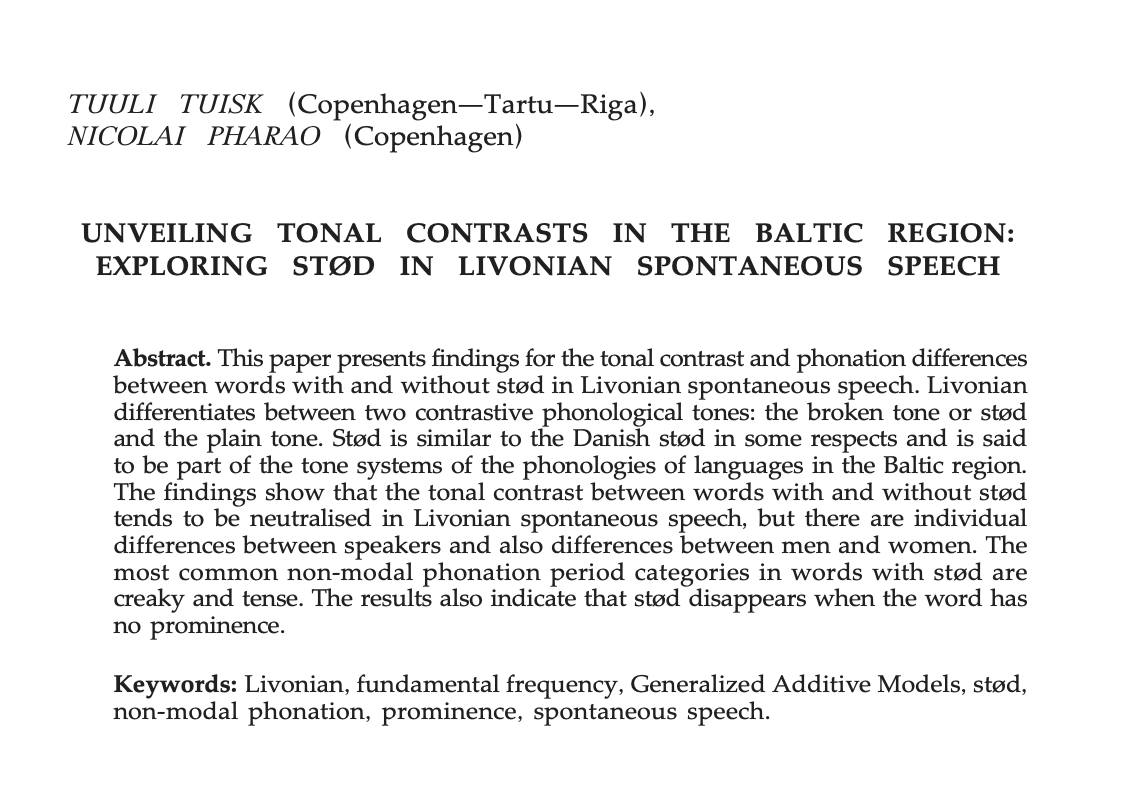
December 7
The UN Group of Experts on Geographical Names has published its 68th bulletin, “The role of geographical names in preserving cultural heritage”.
It also includes the Institute’s report on the situation of Livonian place names, “Documentation and Use of Indigenous Livonian Geographical Names (Latvia)”. The bulletin can be found here.
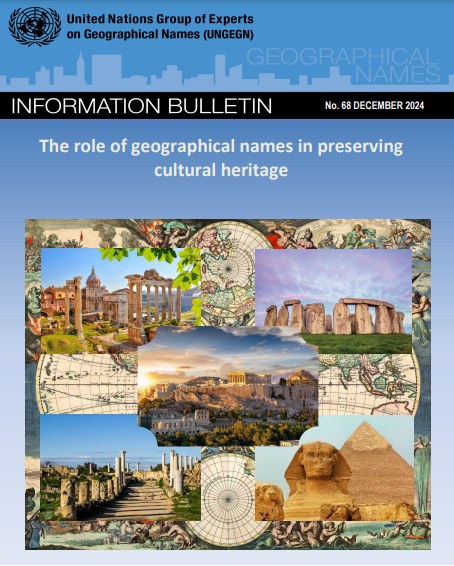
December 5
Gunta Kļava, leading researcher at the Livonian Institute of the University of Latvia, participated in the Latvian Radio 2 program “Nākotnes pietura” (“Future Stop”), where she talked about languages, the situation of the Latvian language, which is not as bleak as it is sometimes portrayed, as well as the challenges and opportunities of learning the Livonian language.
The program can be listened to here.
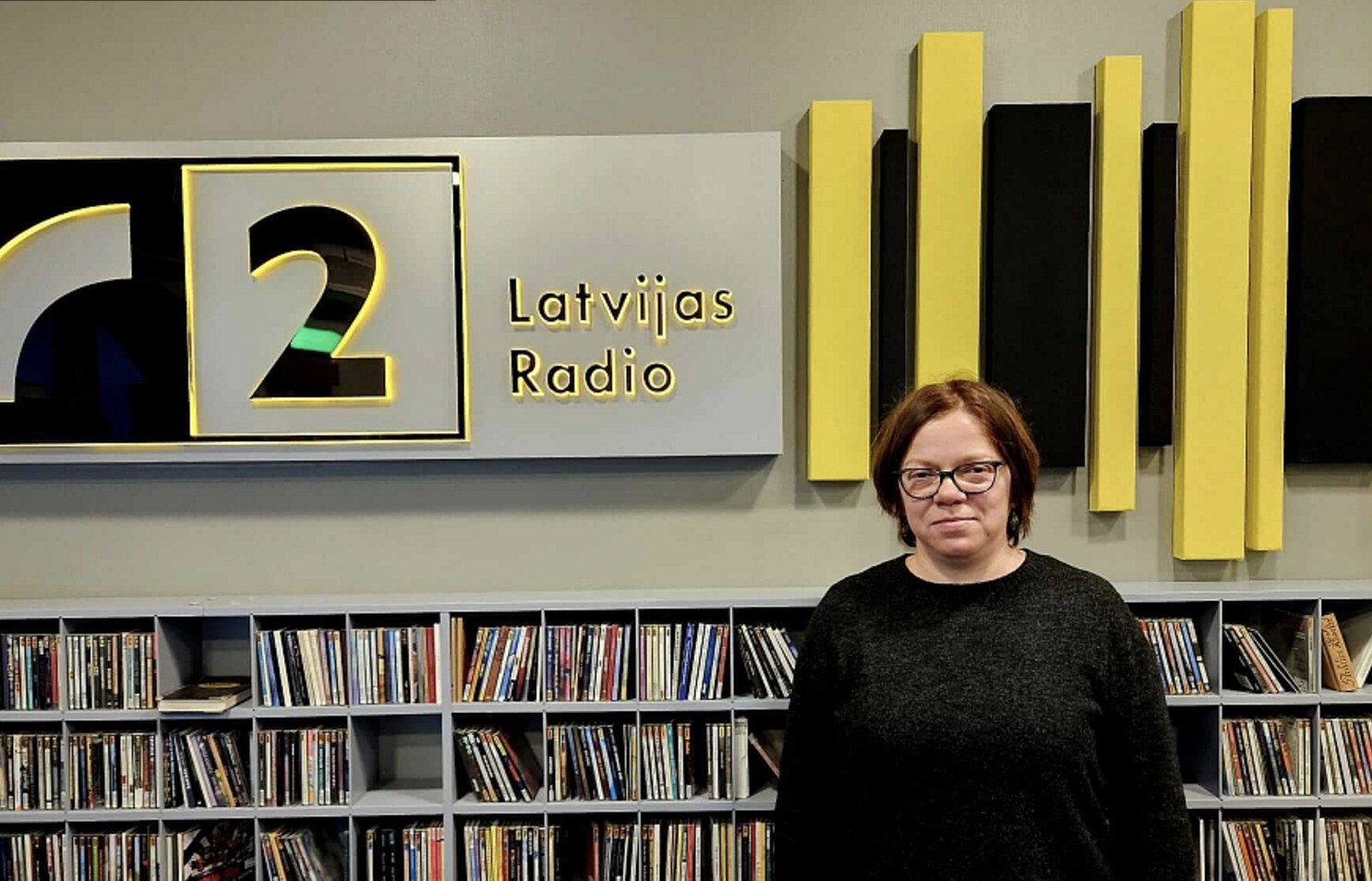
December 2
The Livonian Institute of the University of Latvia is delighted to warmly congratulate our researcher Milda Kurpniece, who received her well-deserved doctoral diploma at a ceremony at the University of Tartu on December 2nd.
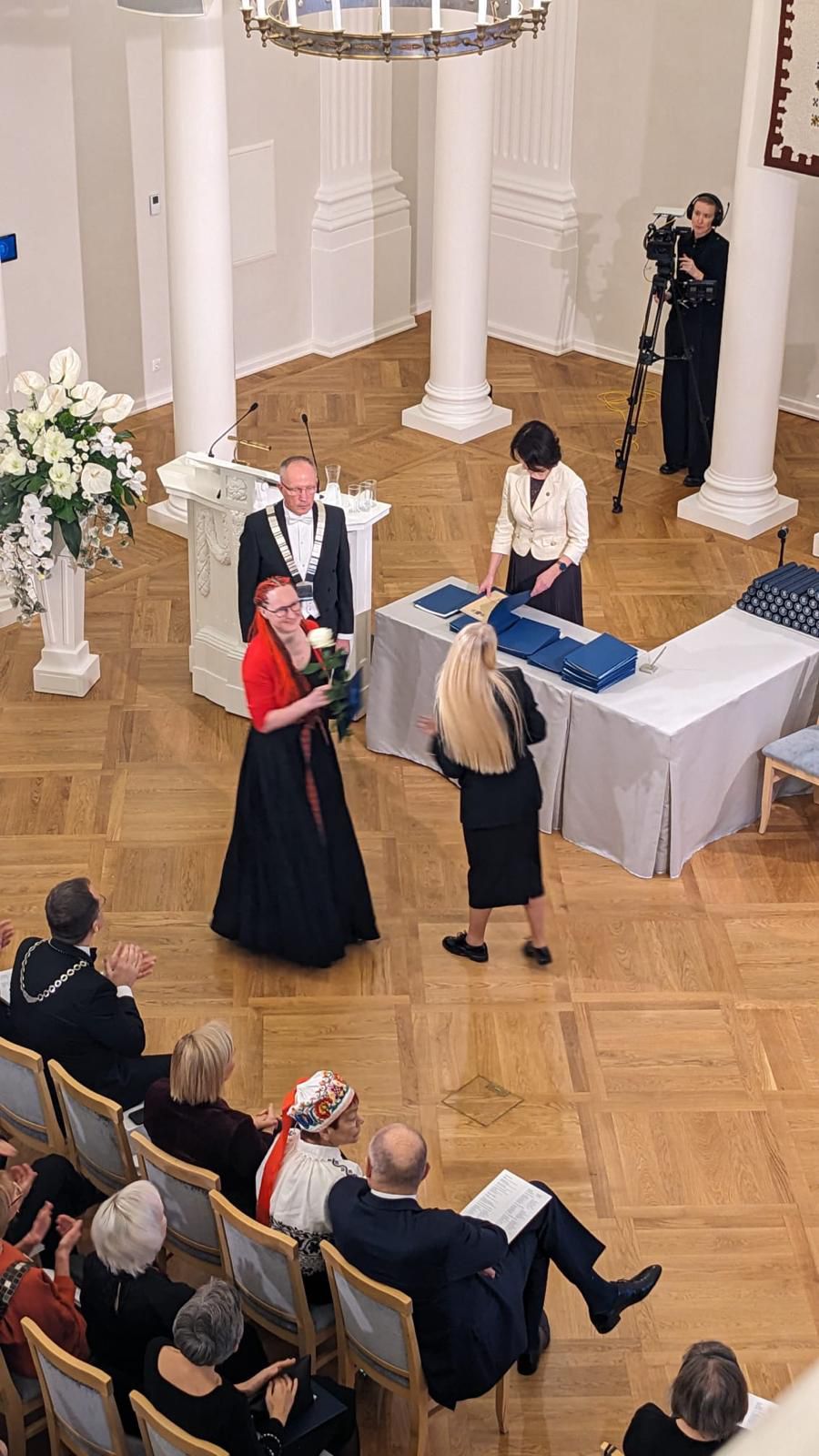
November 28-29
The director of the Livonian Institute of the University of Latvia, Valts Ernštreits, participated in the 9th International Conference on Computational Linguistics of Uralic Languages, IWCLUL 2024, with a presentation entitled “Towards speech recognition for Livonian”.
A new project implemented at the institute on the possibilities of increasing the presence of the Livonian language in aural spaces was presented at the conference.
November 26
The Livonian Institute of the University of Latvia participated in the meeting of the UN Group of Experts on Geographical Names.
The meeting was dedicated to a focus group discussion on place names in indigenous and minority languages.
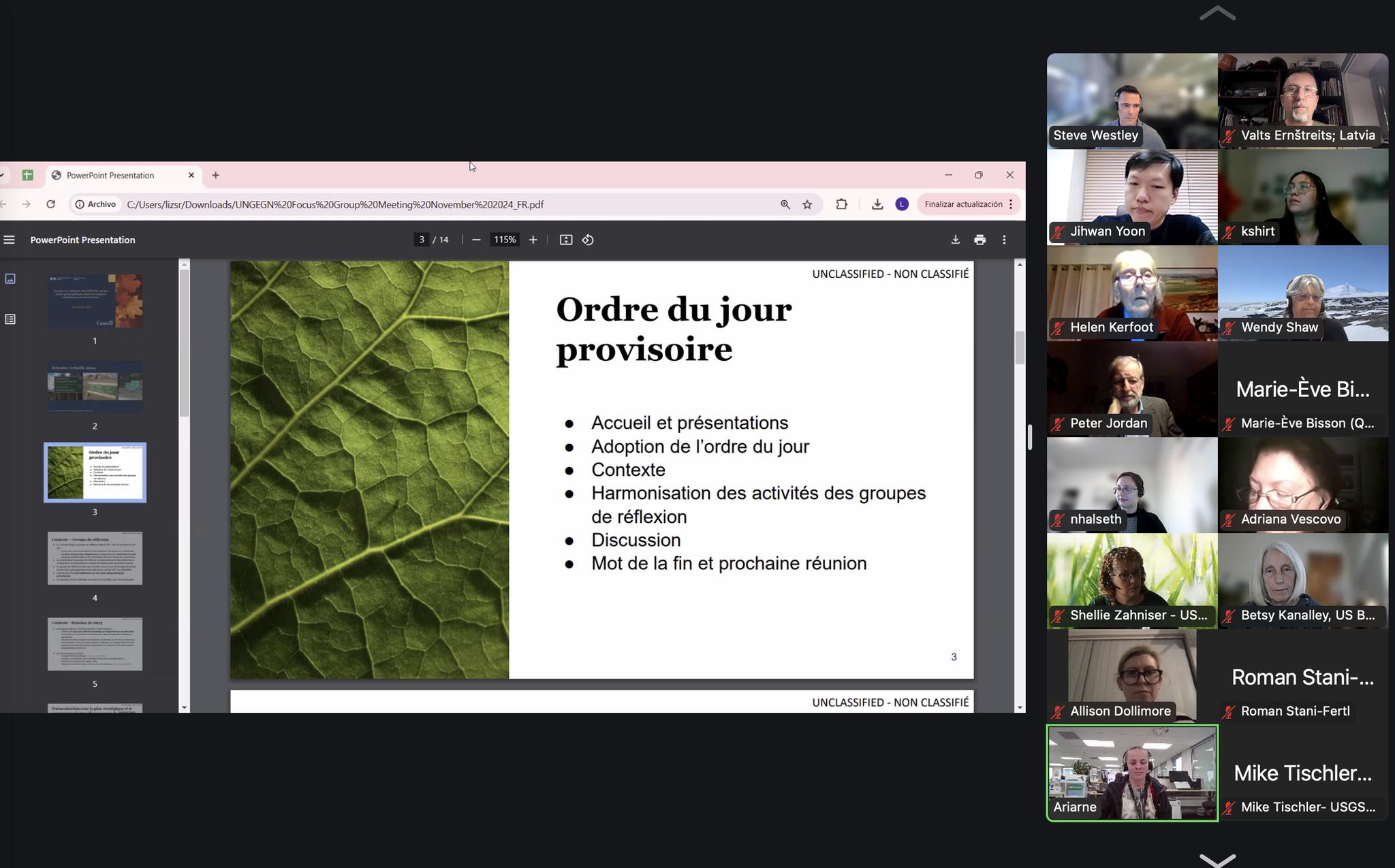
November 20
The Livonian Institute of the University of Latvia visited the Riga Municipality preschool “Pūcīte”.
The institute told the children of “Pūcīte” or “Piški būs” about the Livonians, and together we discovered that the Livonian language sounds completely different from Latvian and other languages that the children know. We also learned where the Livonians lived, what they looked like, what they did in the past, and who the Livonians are today. We told the story of the Livonian flag and also got to know one of the Livonian traditions – the bird awakening.
Each child from the large group of “Piški būs” prepared their own “wish bird” for the Livonians and the Livonian language.
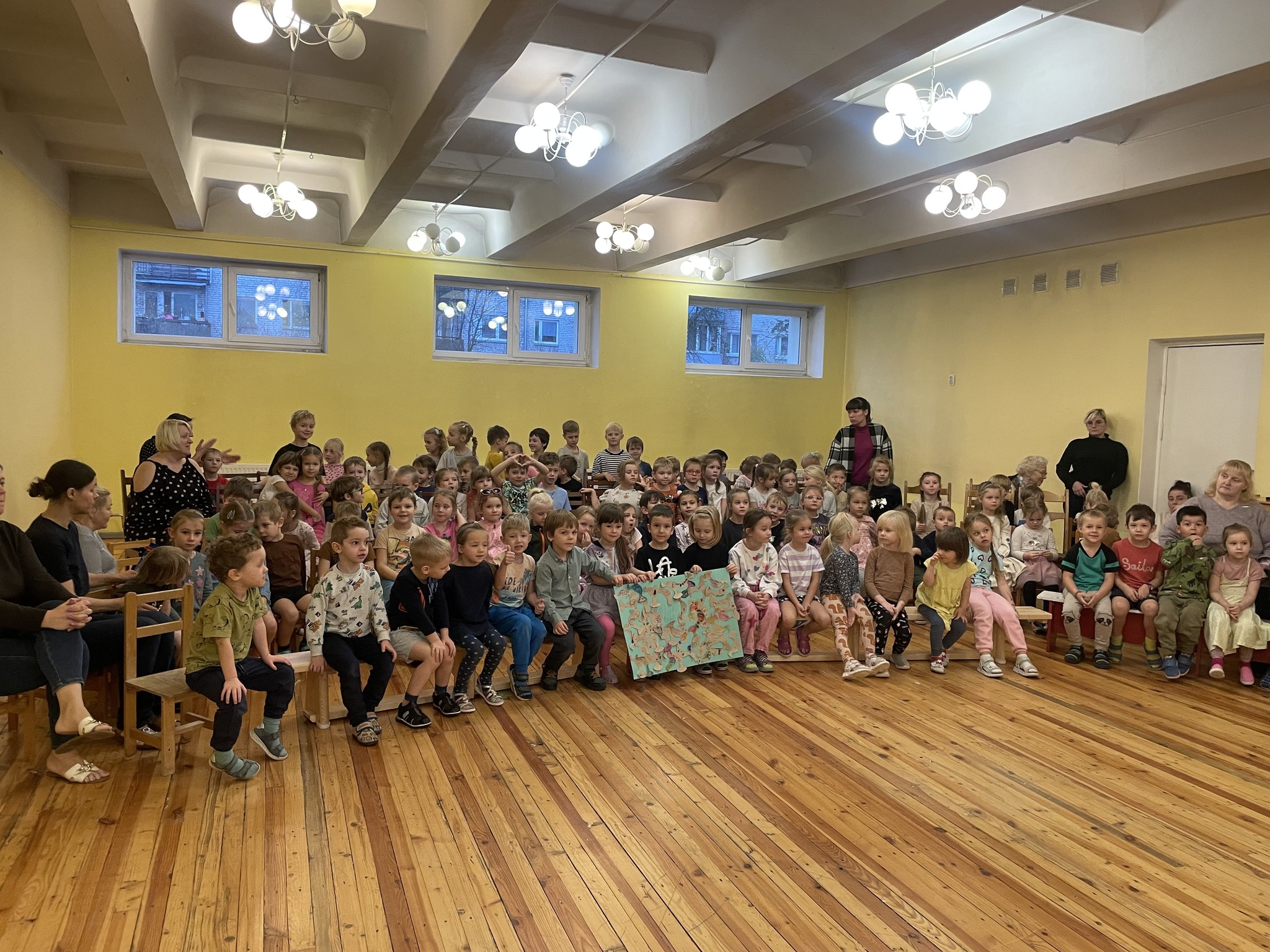
November 18
On November 18th, Riga Castle hosted a creative day “Atkalsatikšanās. Latviešu vēsturiskās zemes Rīgas pilī” (“Reunion. Latvian historical lands in Riga Castle”), organized by the Latvian National History Museum and the Latvian National Cultural Centre, where people could also get to know the Livonians, play games and sing together with Livonian youngsters.
At the end of the event, there was a multimedia performance by Livonian musicians Dāvis Stalts and Monta Kvjatkovska.
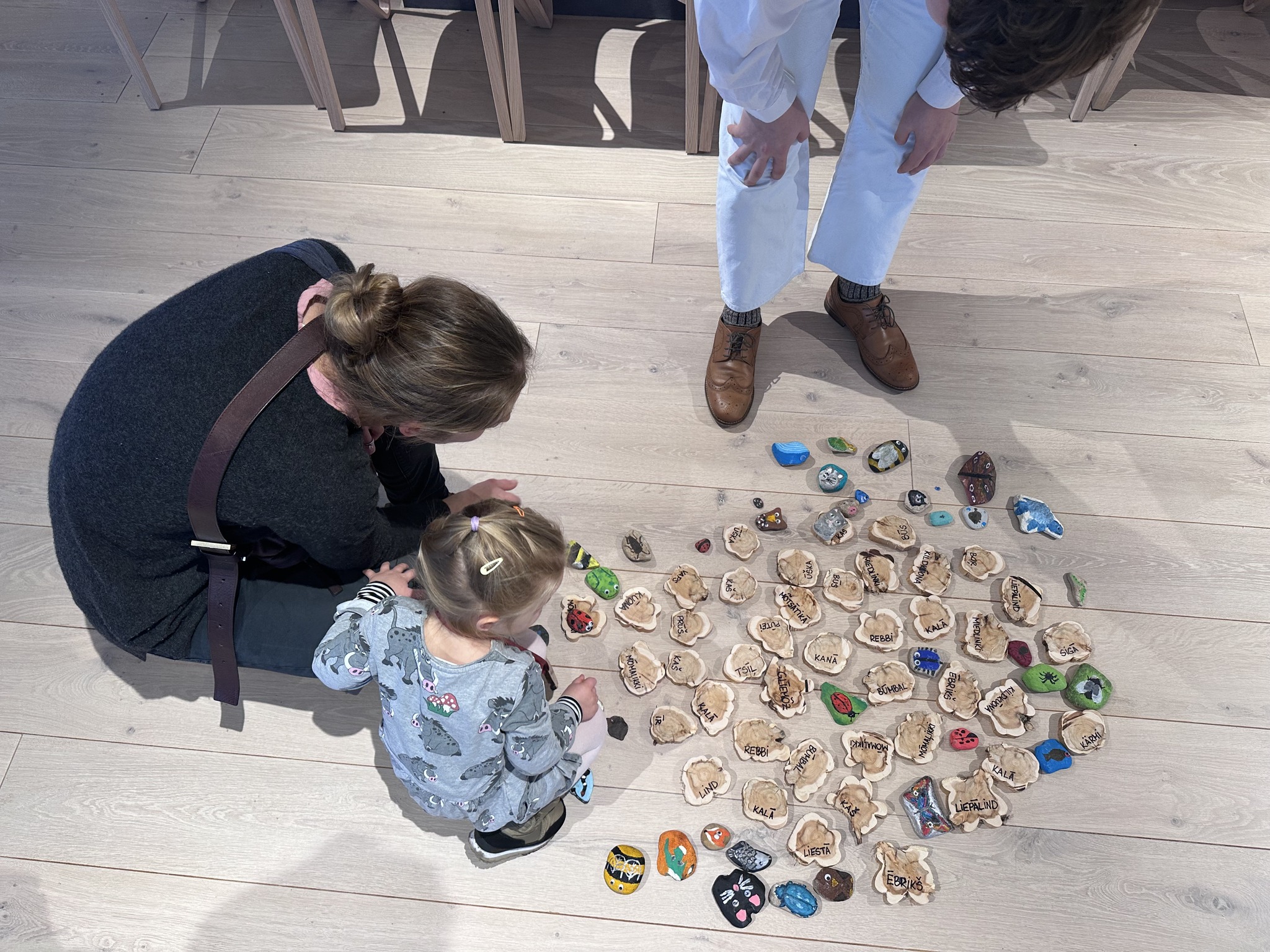
November 18
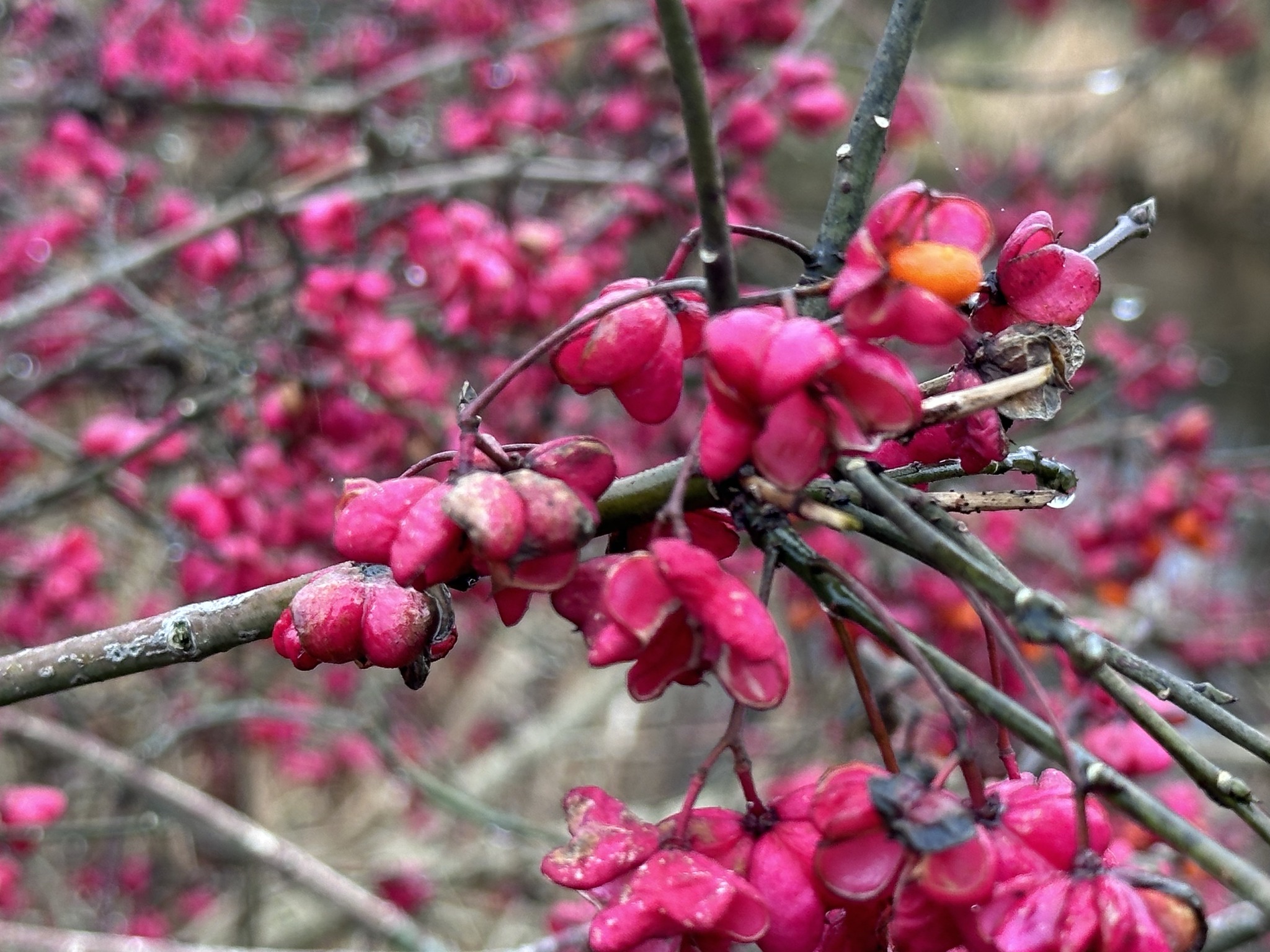
November 15
The Faculty of Humanities of the University of Latvia is hosting a conference dedicated to the 100th anniversary of the outstanding researcher of the Latvian language (and also of the Livonian language), Marta Rudzīte.
Researchers from the Livonian Institute will also speak at the conference: Gunta Kļava will speak about Marta Rudzīte’s materials in the archives of the Livonian Institute of the University of Latvia, as well as the use of these materials in the documentation and research of the Livonian language and its heritage.
Valts Ernštreits, in turn, will focus on Marta Rudzīte’s contribution to Baltic Sea Finnic linguistics and place names of Livonian origin in Latvia.
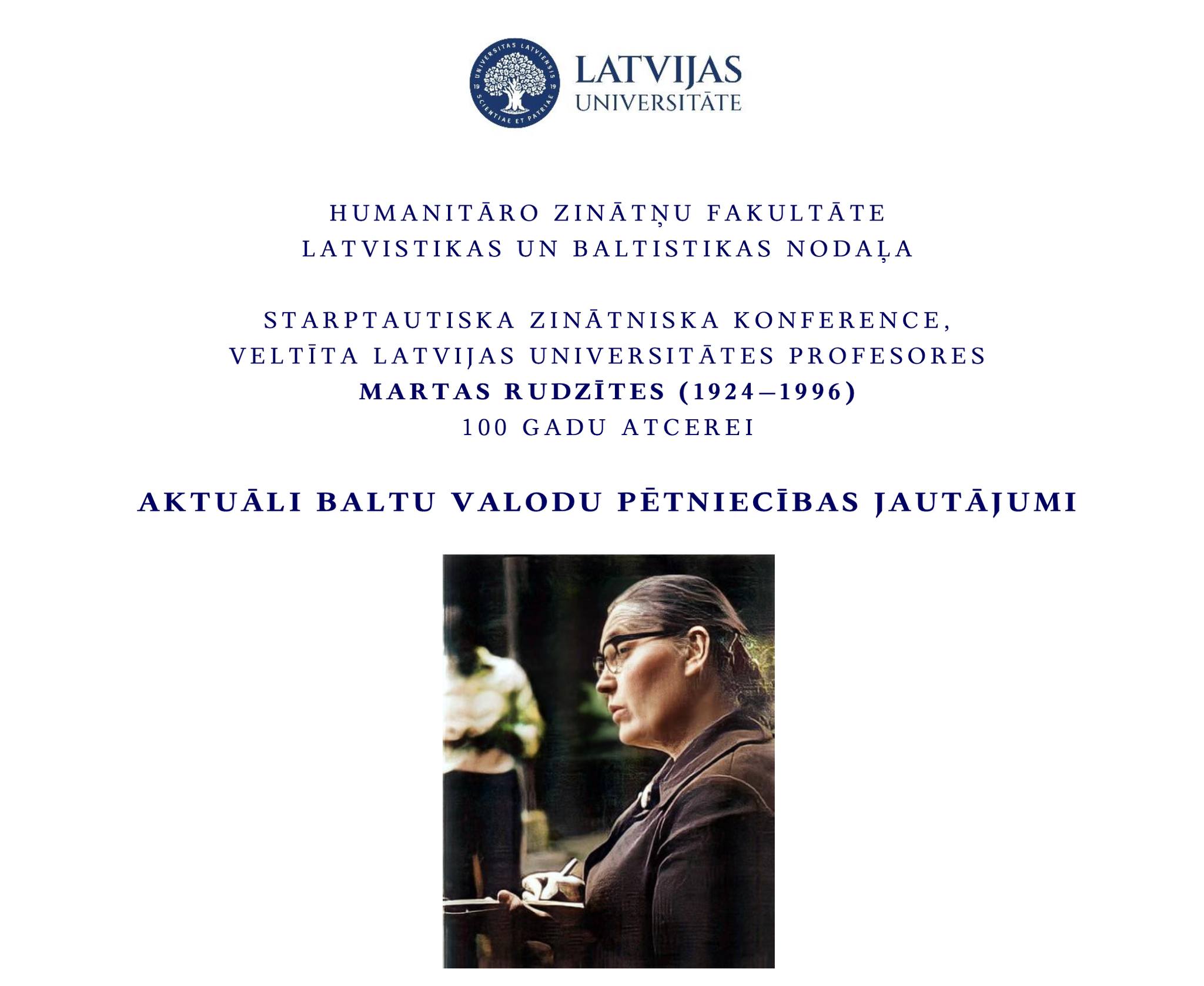
November 13
As part of the Latvian Radio 1 program series “Monopols”, you can listen to a discussion with the director of the institute, Valts Ernštreits, about Livonians in the past and today, the ability to survive and continuity, belonging to the Livonian community and Livonian roots, the digital world, and future prospects.
Listen to it here.
October 15
The photo competition “PieZīmes/PīZeimis/JūrõTǟtõkst”, jointly organized by the Latgalian cultural movement “Volūda”, the Latvian National Cultural Centre and the Livonian Institute of the University of Latvia, has come to an end.
As a Livonian research institution, we are particularly pleased that many of the participants and winners have photographed signs in the Livonian language.
Find out more about the winners here.
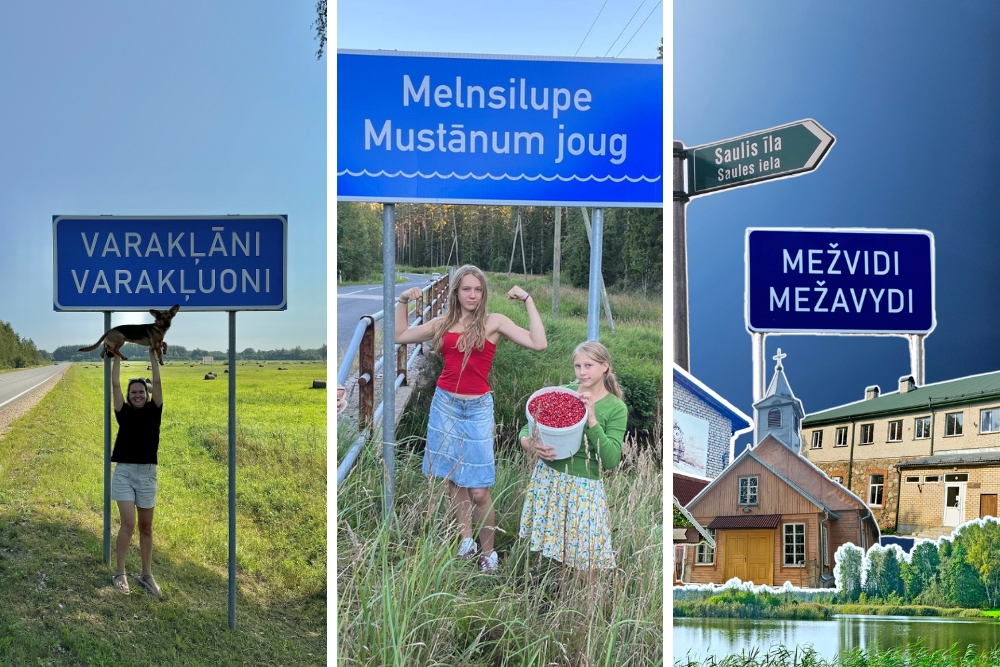
October 14
At the Institute of Estonian and General Linguistics of the University of Tartu, researchers Uldis Balodis and Bridget Moran-Nae represented the Livonian Institute of the University of Latva at the first meeting of the new Nordplus project “Documenting and supporting “Runska”, the endangered Estonian Swedish dialect of Ruhnu Island”, led by Associate Professor Eva Liina Asu-Garcia of the University of Tartu.
The project participants are from the University of Tartu, the University of Gothenburg, the Ruhnu Swedish Support Association in Sweden (Runöbornas förening) and the Ruhnu Cultural Space (Ruhnu Kultuuriruum). Uldis Balodis talked about supporting the use and visibility of Livonian and Ludza Estonian, and how this experience can be channelled to support the Ruhnu Swedish language.
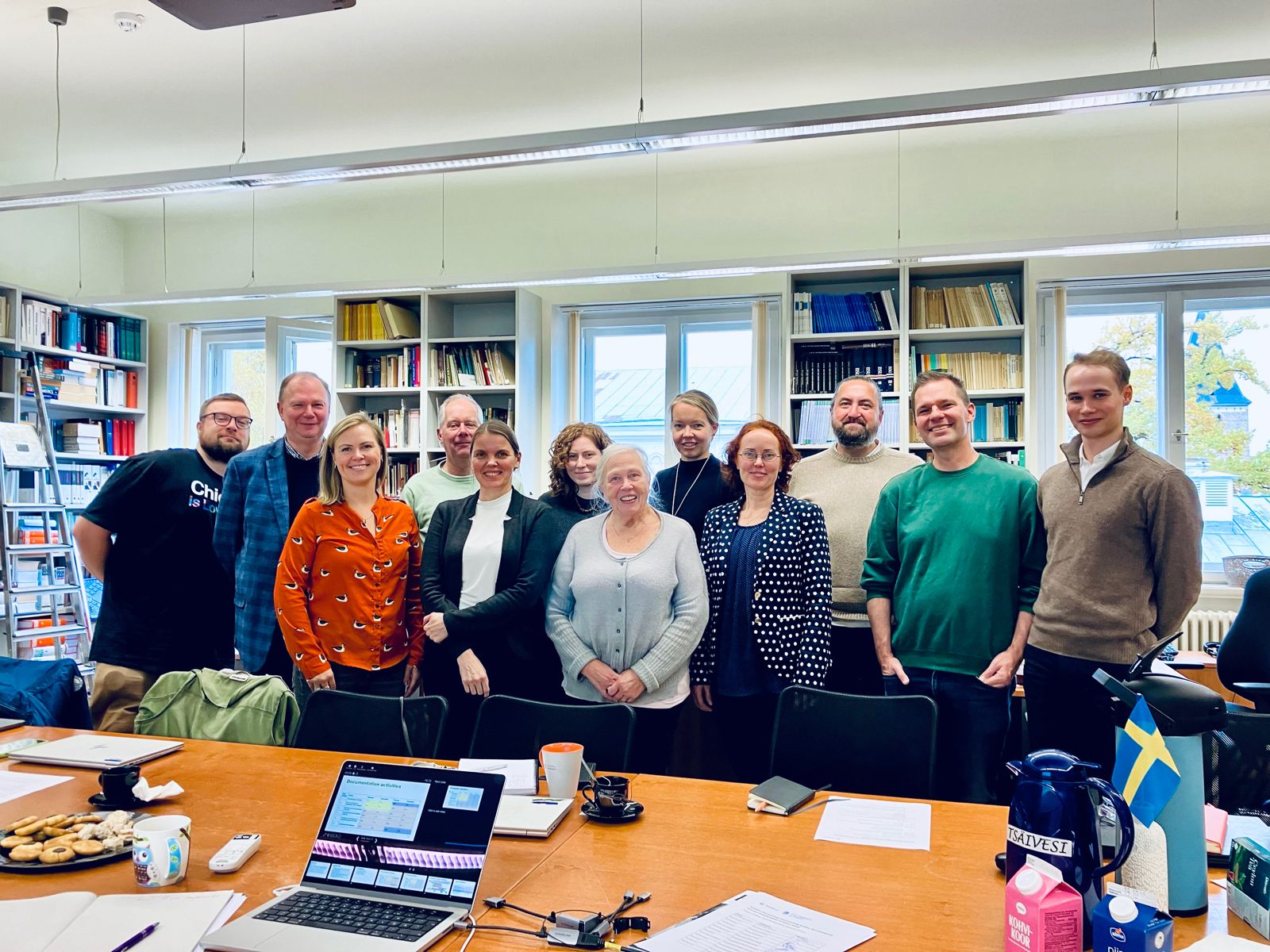
October 11-12
The Livonian Culture Days are taking place in Ventspils, where, in addition to a rich cultural program, stories about research and discoveries by the Livonian Institute of the University of Latvia and its friends were heard, and the “Catalog of Livonian Place Names” (“Lībiešu vietvārdu katalogs”) compiled by the Institute was presented.
The Livonian Culture Days in Ventspils are held every two years, and their goal is to popularize the intangible cultural heritage and modern culture of the Livonians, offering a look back at events in the past that have influenced the national consciousness of the Livonians, to get to know and document the traditional cultural expressions of the Livonians, to listen to the sound of the Livonian language and to appreciate the modern culture of the Livonians, as well as to strengthen the sense of identity of the Livonian community.
The Livonian Culture Days in Ventspils are organized by the Ventspils Livonian Association “Rānda” foundation, in cooperation with the Livonian Institute of the University of Latvia and the association “Līvõd īlma”.
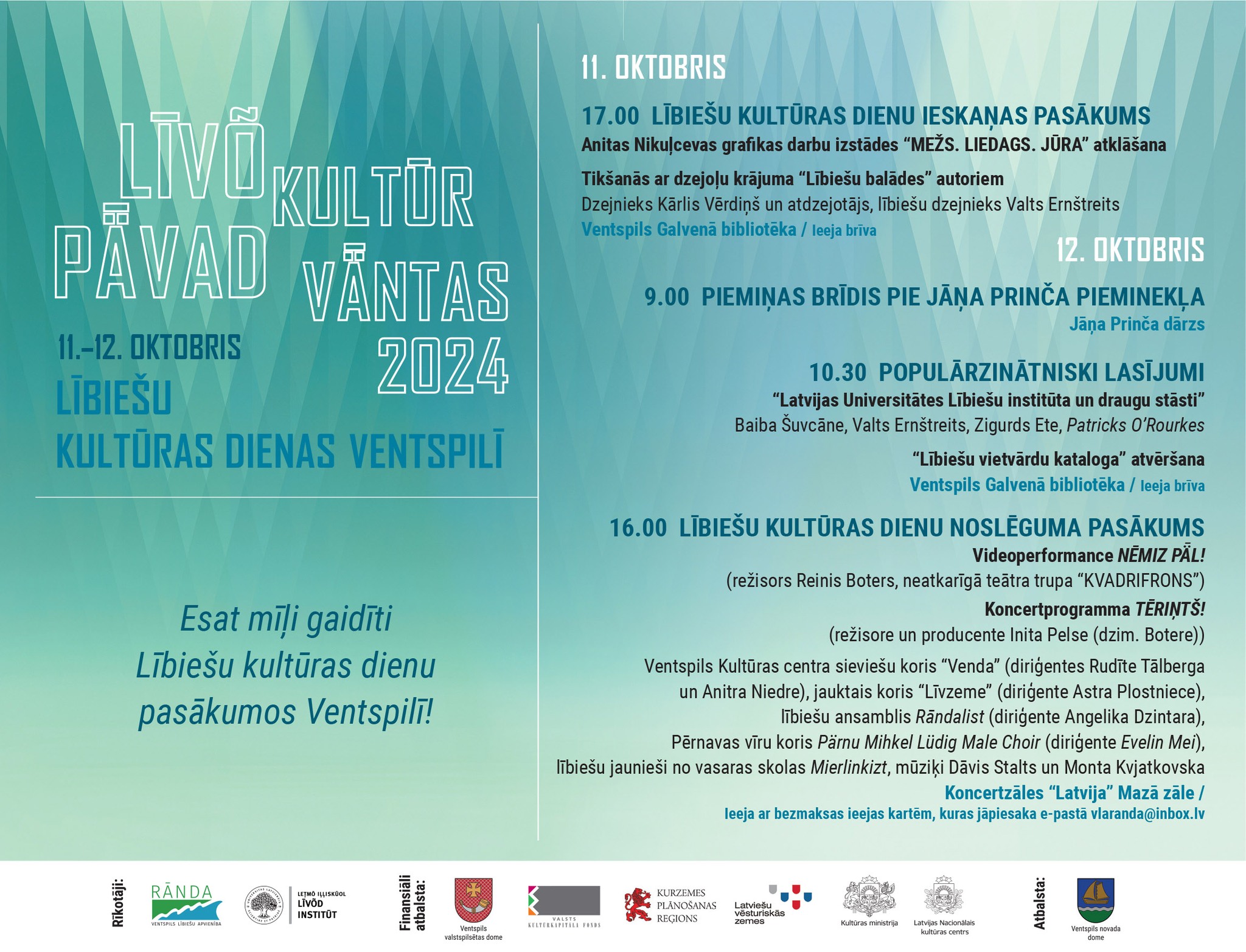
October 10
The “Catalog of Livonian Place Names” (“Lībiešu vietvārdu katalogs”) prepared by the Livonian Institute has been published.
The “Catalog of Livonian Place Names” prepared by the Livonian Institute of the University of Latvia (compiled by Valts Ernštreits, Pēteris Dambergs, Baiba Šuvcāne) contains place names in the modern Livonian language. The publication complements the Livonian place name database published on the Livonian language and culture resource platform Livonian.tech, which is regularly updated in electronic format.
The Livonian place name catalog and the associated database were created within the Fundamental and Applied Research Program project “Lībiešu vietvārdu apzināšana, kartēšana un oficiālo vietvārdu reģistra izveide” (“Identification, mapping and creation of an official register of Livonian place names”) (No. LZP-2019/1-0240).
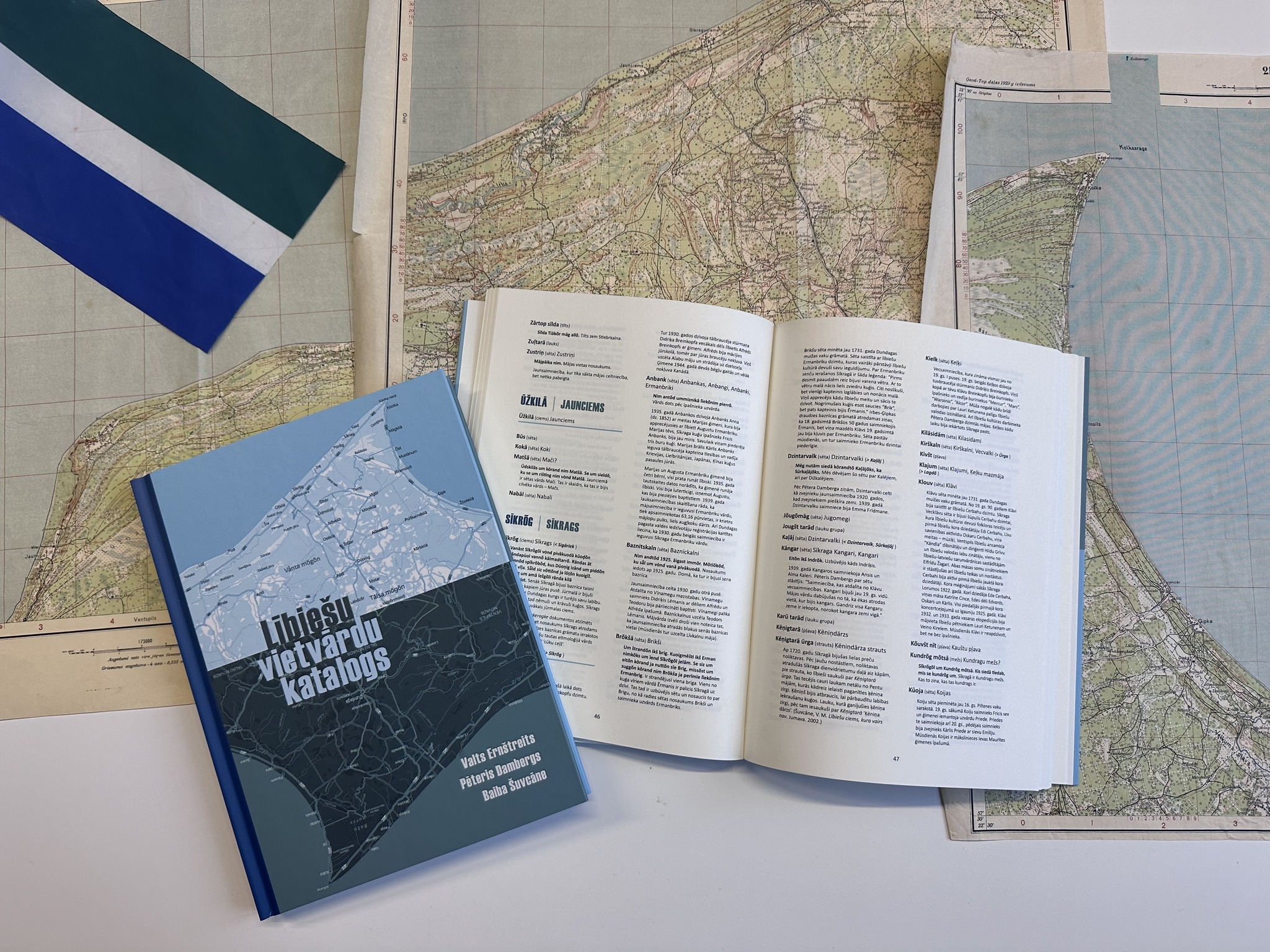
October 9
Applications are open for the conference entitled “Areal linguistics and language contact of Uralic languages. Language-specific and typological approaches”, jointly organized by the Livonian Institute of the University of Latvia, and the Institute of Slavic Studies of the University of Potsdam.
The conference will take place in Riga on June 12–14, 2025.
For more information abut the conference and to participate, click here.
October 8
The Livonian Institute is launching a Livonian language course for youngsters.
The Livonian language course is part of an opportunity to regularly study the language for anyone interested, and is being held with the support of the Ministry of Education and Science.
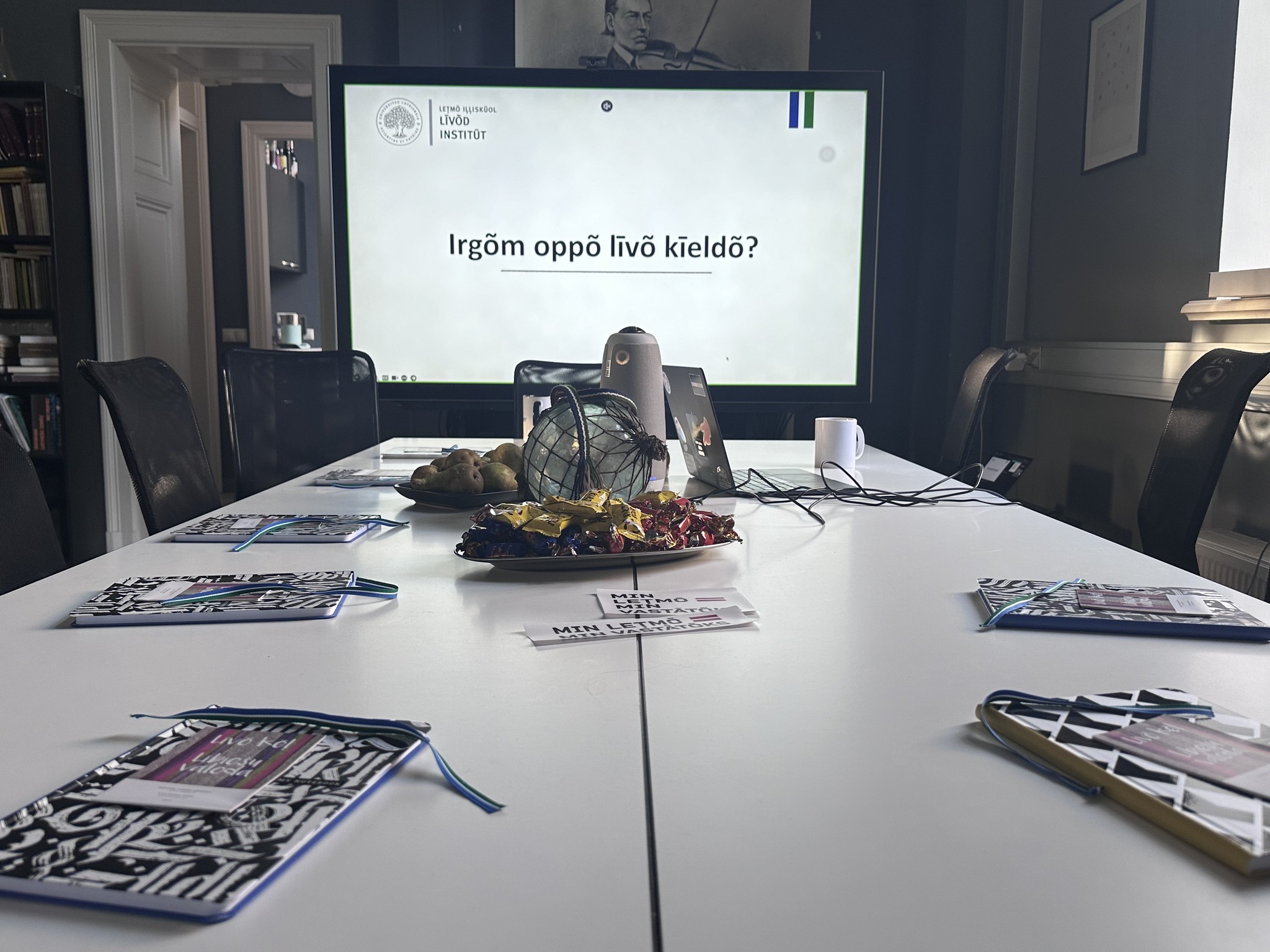
October 4-5
Vilnius University hosted the 11th international student conference “Bridges in the Baltics”, with the participation of researchers from our institute.
The aim of the conference is to unite all students whose research focus is on the cultures and languages of the Baltic States. At the conference plenary session, the director of the institute, Valts Ernštreits, gave a talk on the possibilities of endangered languages in the digital age.
Anna Sedlāčková, a researcher at the Livonian institute, presented a paper on Livonian literature, and Arnita Agrita Umalas presented a paper on the subject of Livonian poetry.
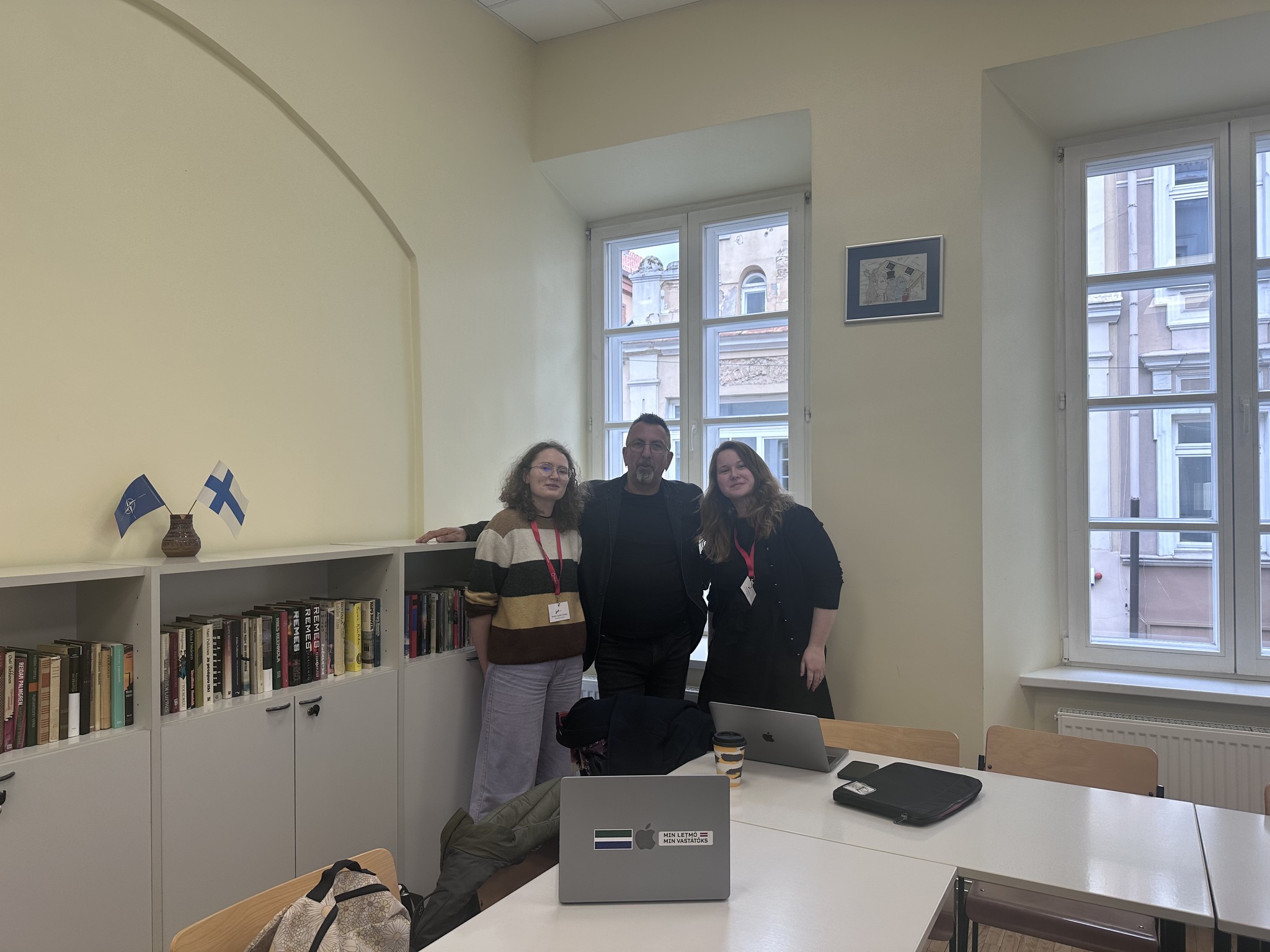
October 3
The 23rd meeting of the Baltic Section of the UN expert group on geographical names is taking place in Lithuania, with the participation of the head of the Livonian Institute, V. Ernštreits.
The Livonian Institute of the University of Latvia provides the expert group with access to Livonian place names and necessary information.
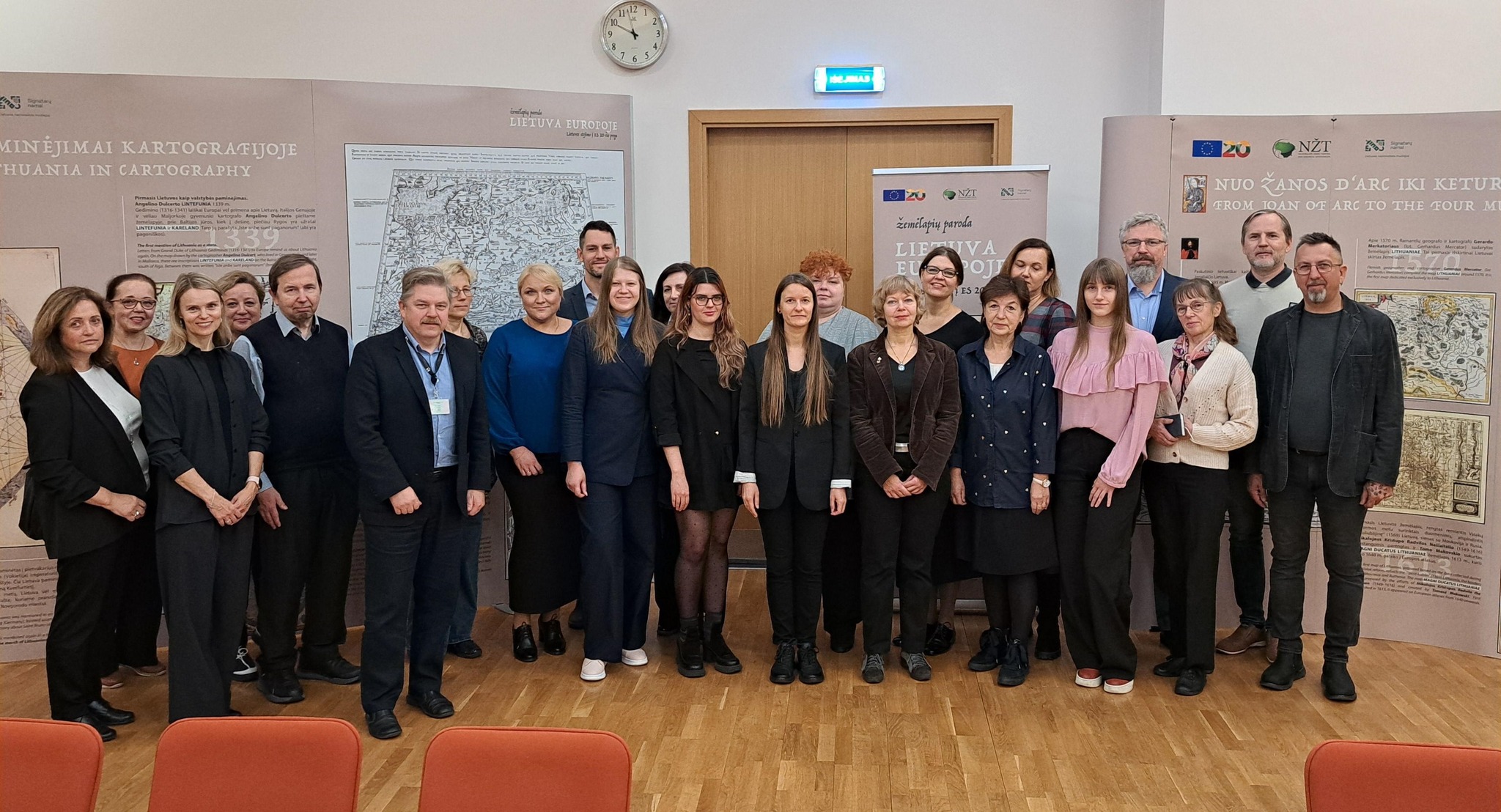
1. oktobris
Valts Ernštreits talked about the Livonian language in the digital world on the Latvian Radio 1 program “Zināmais nezināmajā” (“The Known in the Unknown”).
You can listen to it here.
September 30
September 30th is International Translation Day.
The director of the institute, Valts Ernštreits, participated in the event organized by the UN International Decade of Indigenous Languages with a speech on digital equality.
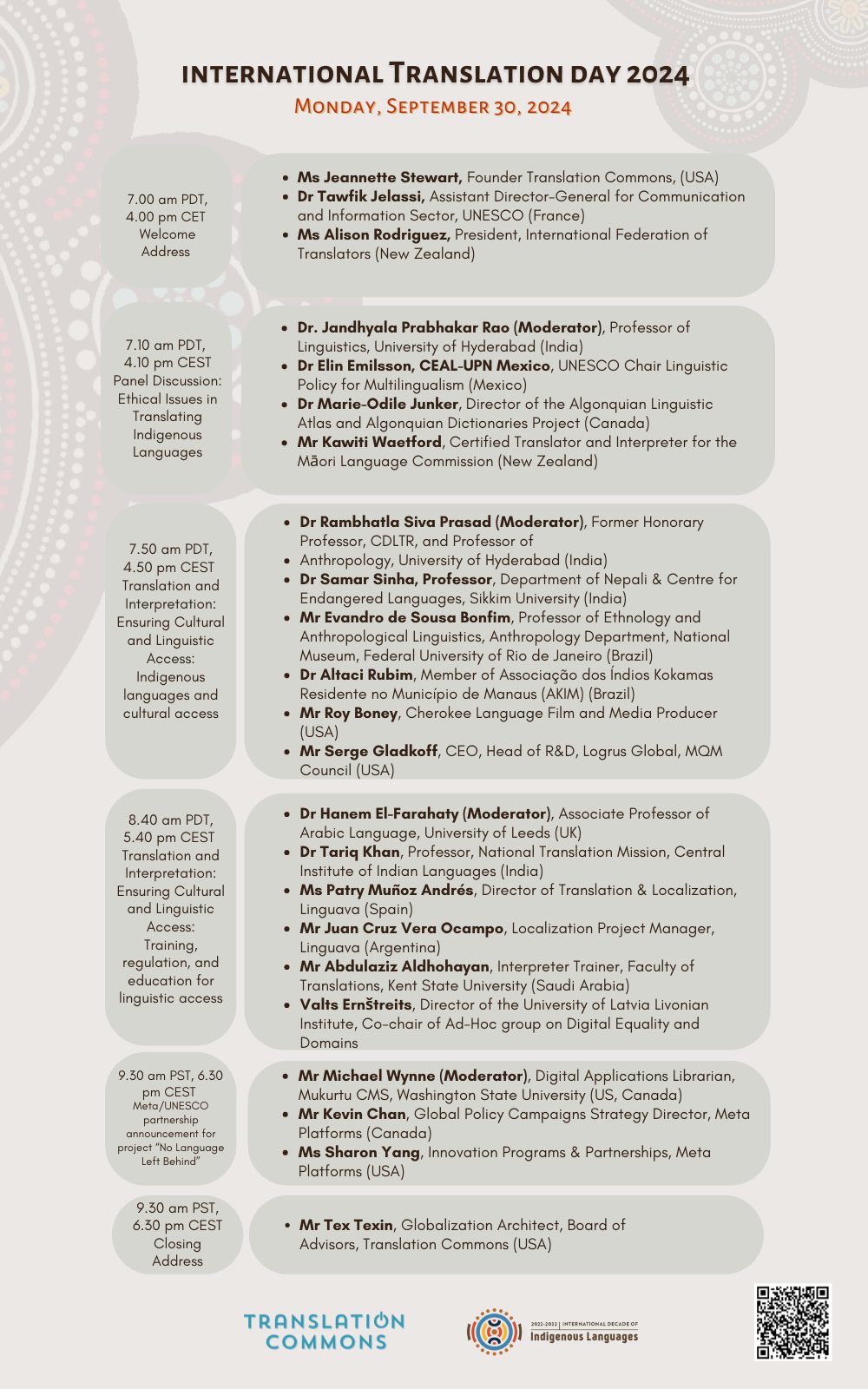
September 27
In all Latvian universities, from 17.00 to 21.00, the European Researchers’ Night will take place.
Many interested people also visited the LU Livonian Institute to get to know the Livonians and the Livonian heritage, to study and try on the archaeological dress of Livonian women, to taste Livonian kama (a traditional food), as well as to listen and lend their voice to the Livonian language and songs alongside the Livonian singers Julgī and Lelū Stalte.
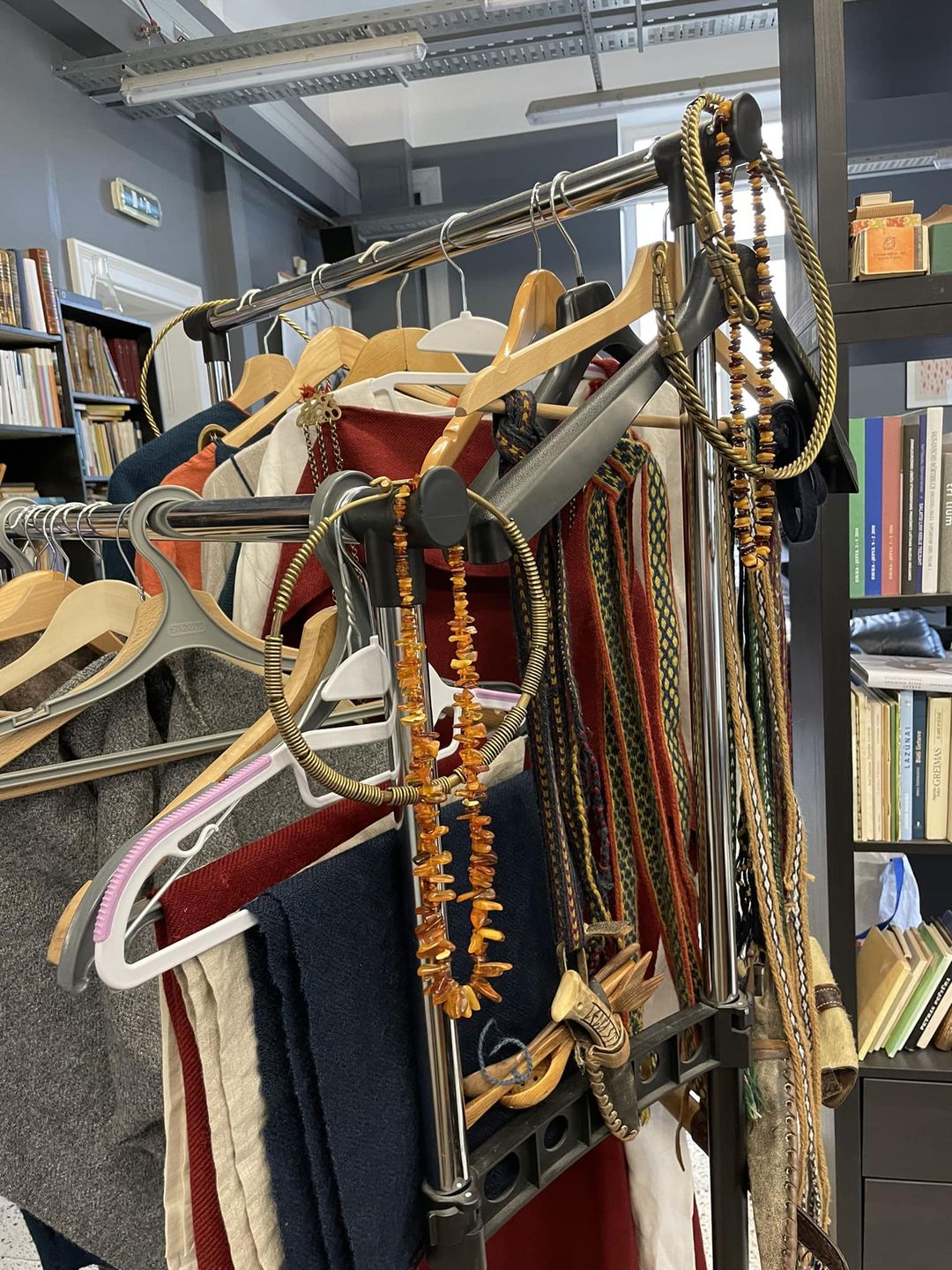
September 22
The institute hosts the first autumn class of the summer school “Mierlinkizt” for Livonian children and youngsters.
The participants are learning the Livonian language and are preparing to perform at the Ventspils Livonian Culture Days in October.
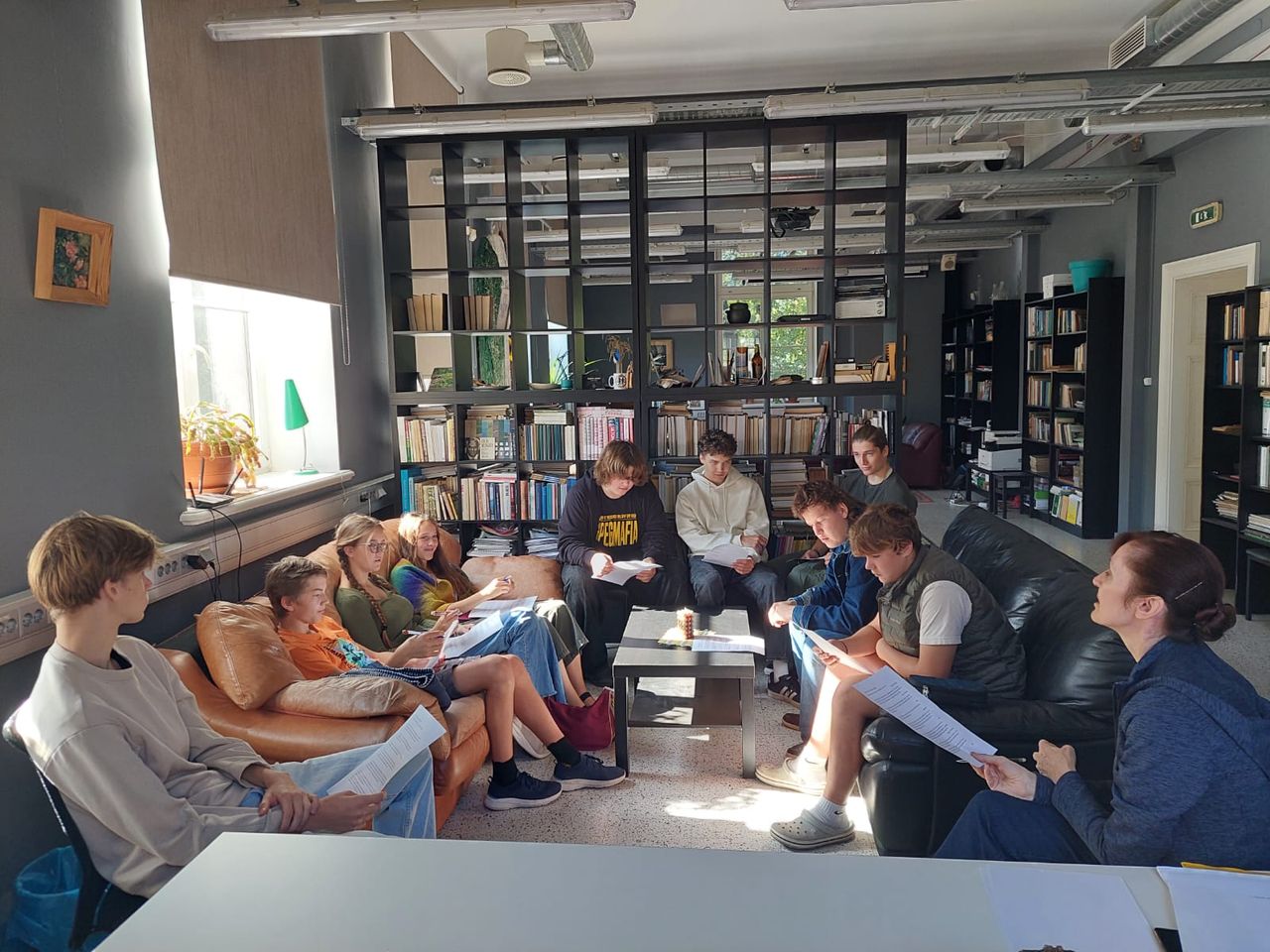
September 21
The 2nd conference of Vidzeme’s Livonian cultural space “Values of Vidzeme’s Livonian cultural space – current and discovered” is taking place in Pāle. During the conference, Anita Emse’s collection of poems “Ceļš” was presented, part of which can also be read in the Svētciemas dialect of her native Latvian Livonian dialect.
Uldis Balodis, researcher of the institute, together with Karl Pajusalu, poet and professor of the University of Tartu, spoke at the conference with a presentation about the words for the natural landscape, which have common roots in the Salaca Livonian, Estonian and Latvian languages. On the other hand, the director of the Livonian Institute of the University of Latvia, Valts Ernštreits, spoke about the traces of the Livonian language in Vidzeme.
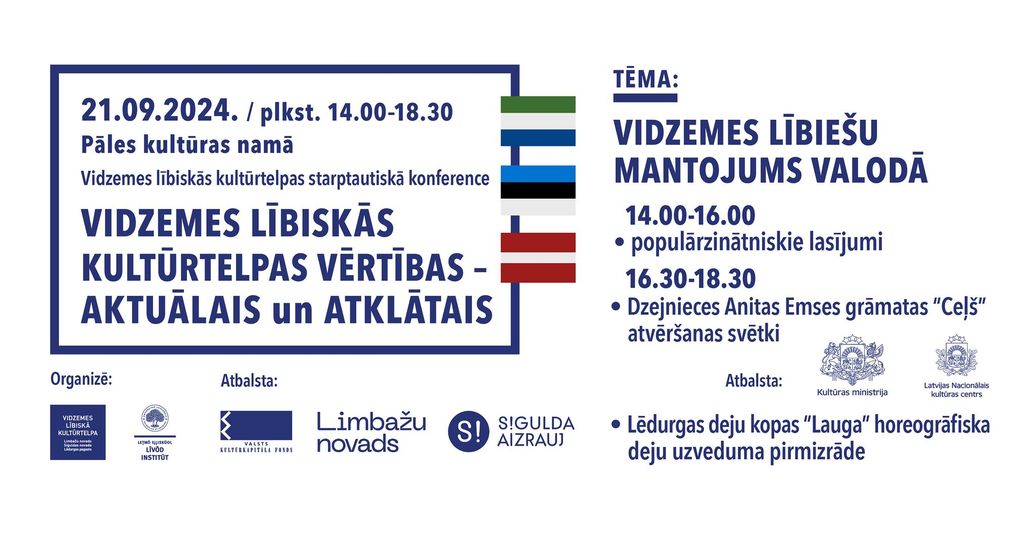
September 21
The director of the institute, Valts Ernštreits, visited Ieva Siliņa as part of the Radio SWH program “The mind will save the world” (“Prāts izglābs pasauli”).
Here is the link to the radio archive (21.09.2024. 12:00 – 13:00).
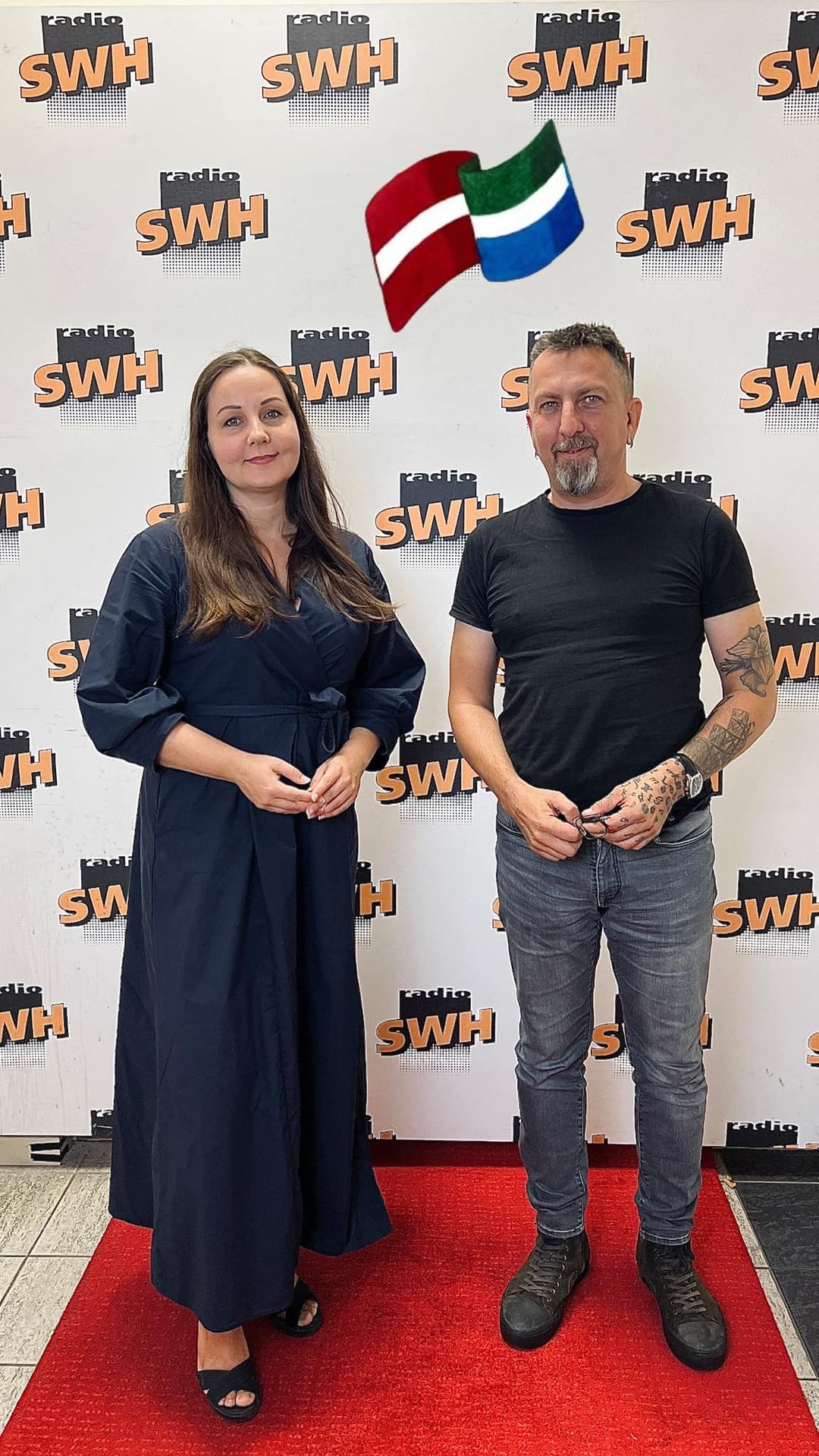
September 16
Institute researcher Bridget Moran–Nae was interviewed as part of the “Kultūras Rondo” program of Latvijas Radio.
Listen to it here.
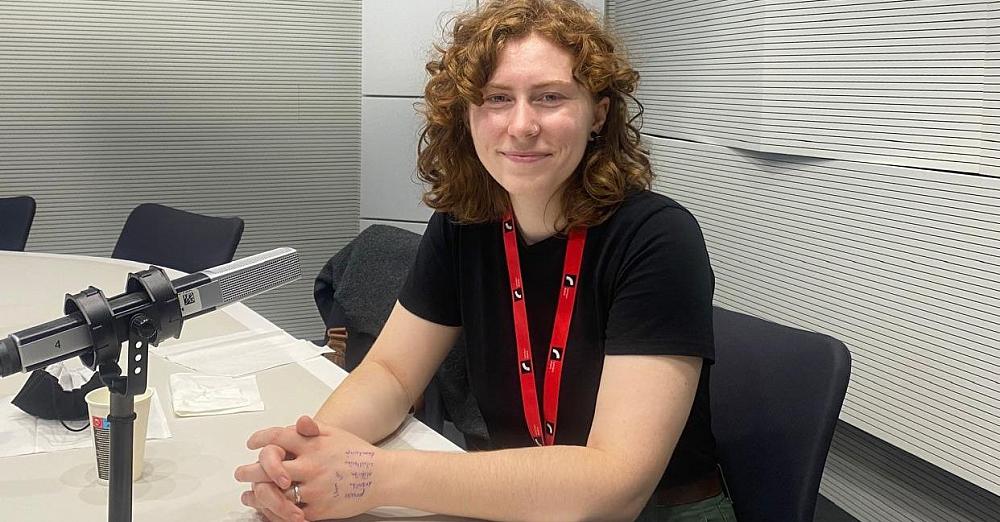
September 12-13
Institute researchers Valts Ernštreits and Gunta Kļava participate in Ad-hoc working groups of the UN International Decade of Indigenous Languages (2022-2023).
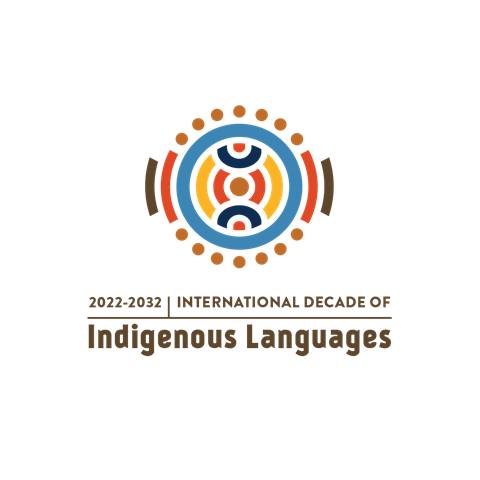
September 10
A delegation of the Estonian People’s Center (Eesti Rahvakultuuri Keskus) visited the Livonian Institute of the University of Latvia to get acquainted with the intangible cultural heritage of the Livonian people and its manifestations in Latvia.
The Estonian colleagues were particularly interested in the preservation of the intangible cultural heritage of the original inhabitants of Latvia – the Livonians, and the activities that are implemented to popularize Livonian culture for various target audiences. Lolita Ozoliņa, a guest researcher at the Livonian Institute of the University of Latvia, shared the story about the Livonian cultural space of Vidzeme, the Livonians of Vidzeme, and the manifestations of language and cultural heritage today. Estonian colleagues listened with great interest to the researcher’s presentation, which was followed by a discussion about the challenges of preserving intangible cultural heritage and the desire to continue cooperation in the future.
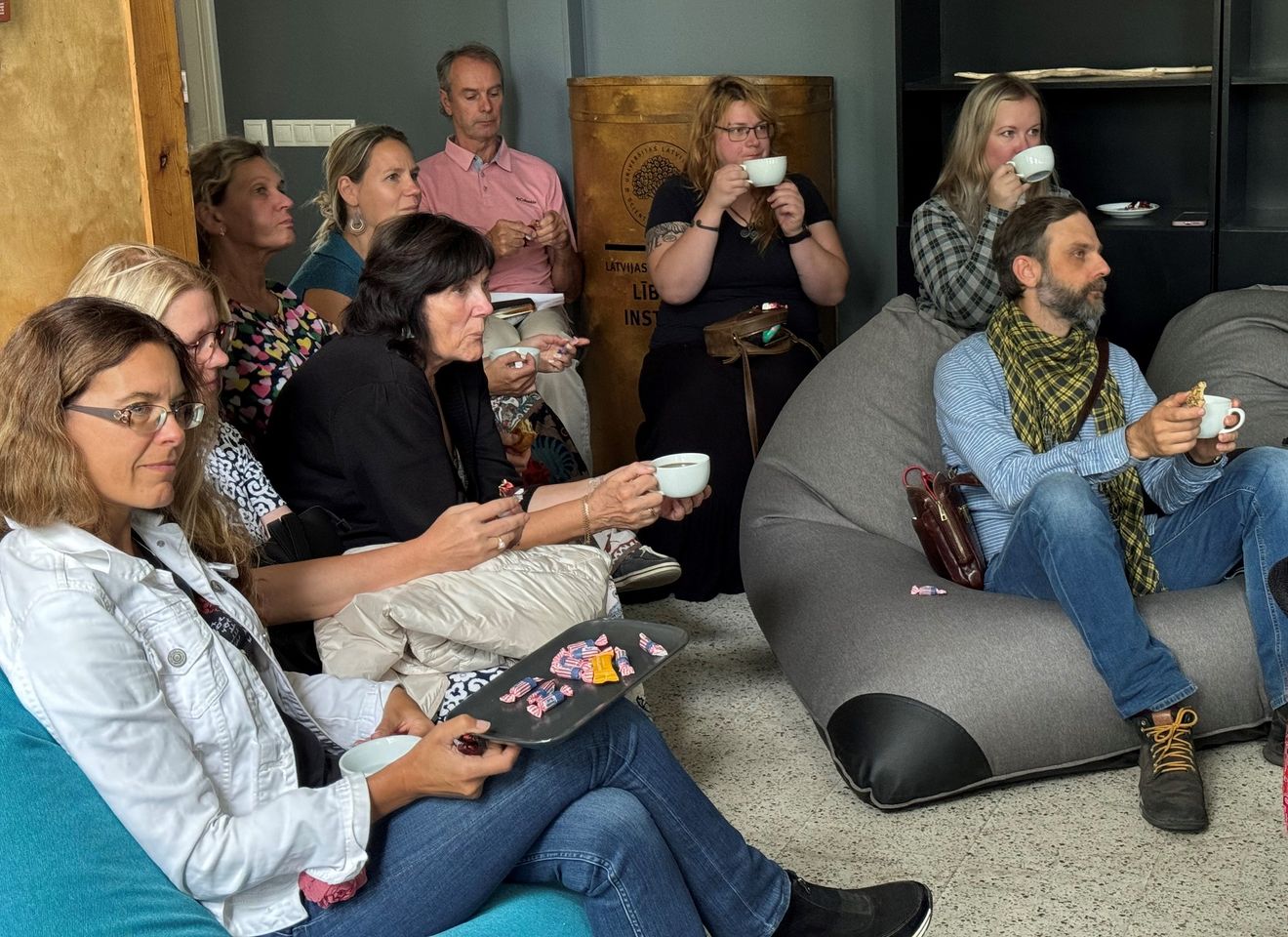
September 8-13
Institute researchers Valts Ernštreits and Gunta Kļava are participating in the 21st International Congress of Linguistics (21st International Congress of Linguistics, ICL 2024) in Poznań, Poland.
At the congress, the researchers presented a report on the language policy in the revitalization of the Livonian language.
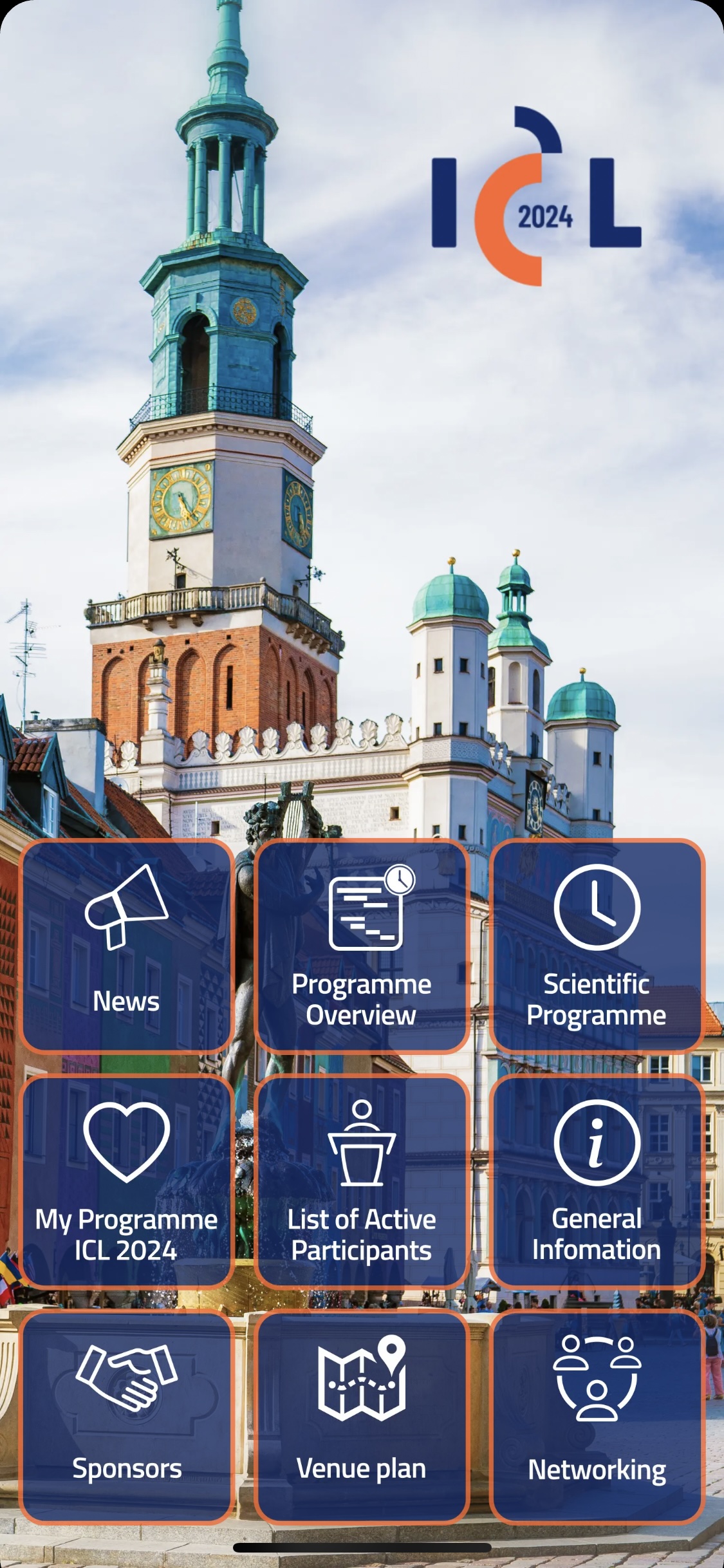
September 4
After the summer break, the Livonian book club “Vešpraiga” resumes under the leadership of Zoja Sile.
“Vešpraiga” takes place every Wednesday at 18.00 in the Livonian classroom on the premises of the institute at Kronvalda boulevard 4. The book club is a great opportunity to get to know the Livonian language every week, try out your voice in the sounds of the Livonian language and maintain your language skills.
The classes are suitable for anyone interested and you can join them at any time.
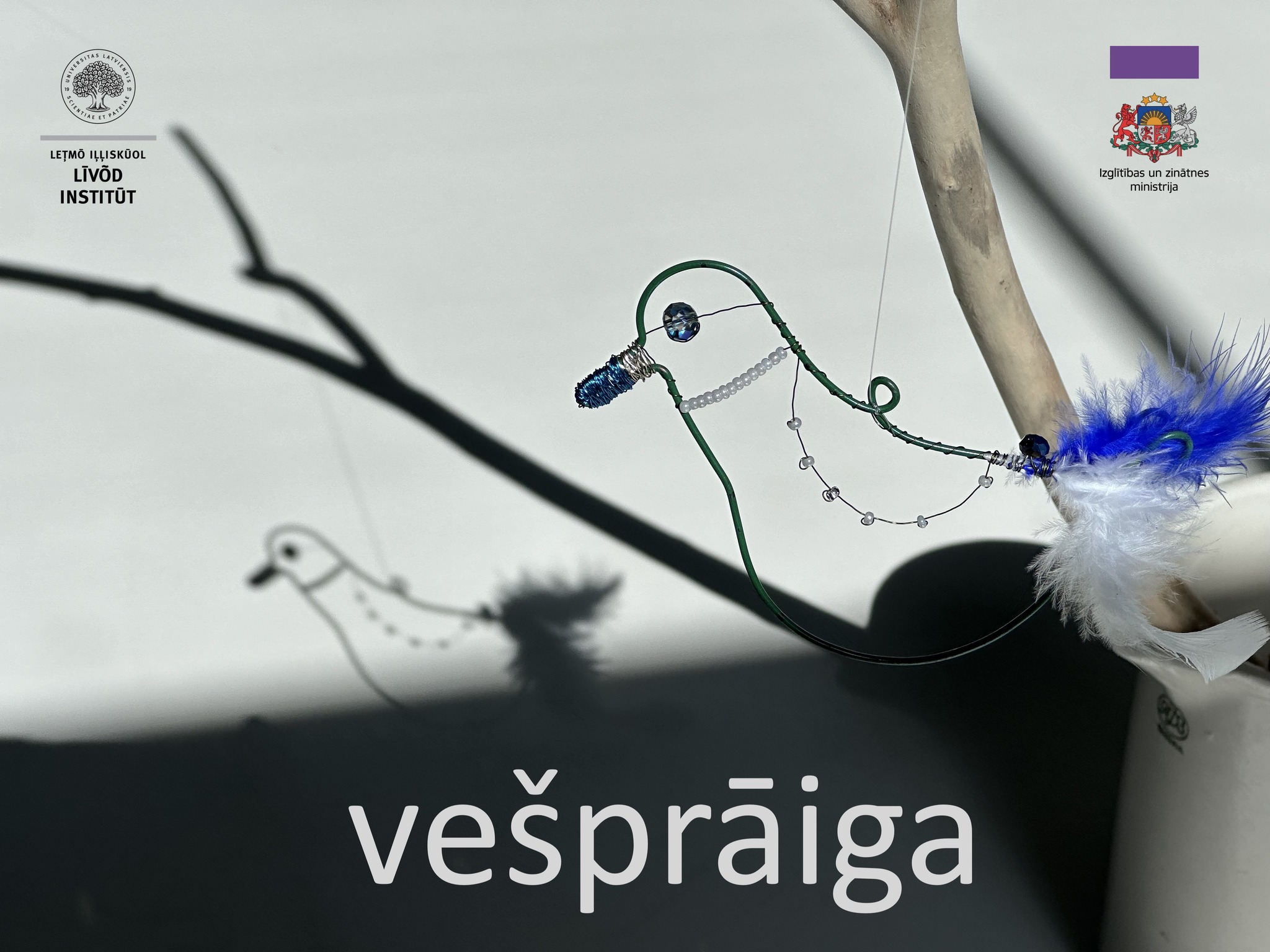
September 3-5
The director of the institute Valts Ernštreits participates in the 33rd economic forum “Time of New Leaders – Shaping the Future Together”, which is held in Karpacz, Poland.
Valts Ernštreits participated and spoke in the panel discussion “Baltic Sea Region – Heritage, Relations and Prospects for Cooperation”.
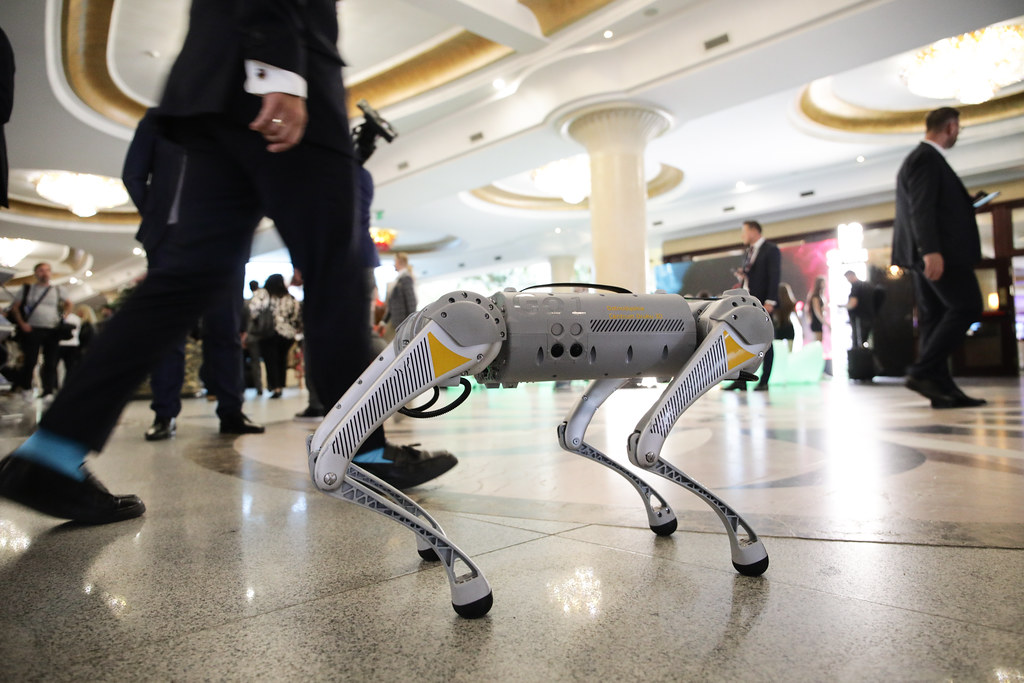
August 27
A free Livonian spell checker has been created.
The tool was created in cooperation between the institute and the specialists of the Arctic University of Tromsø. Special thanks to Sjur Moshagen, Srdan Kvrgic and Jack Rueter.
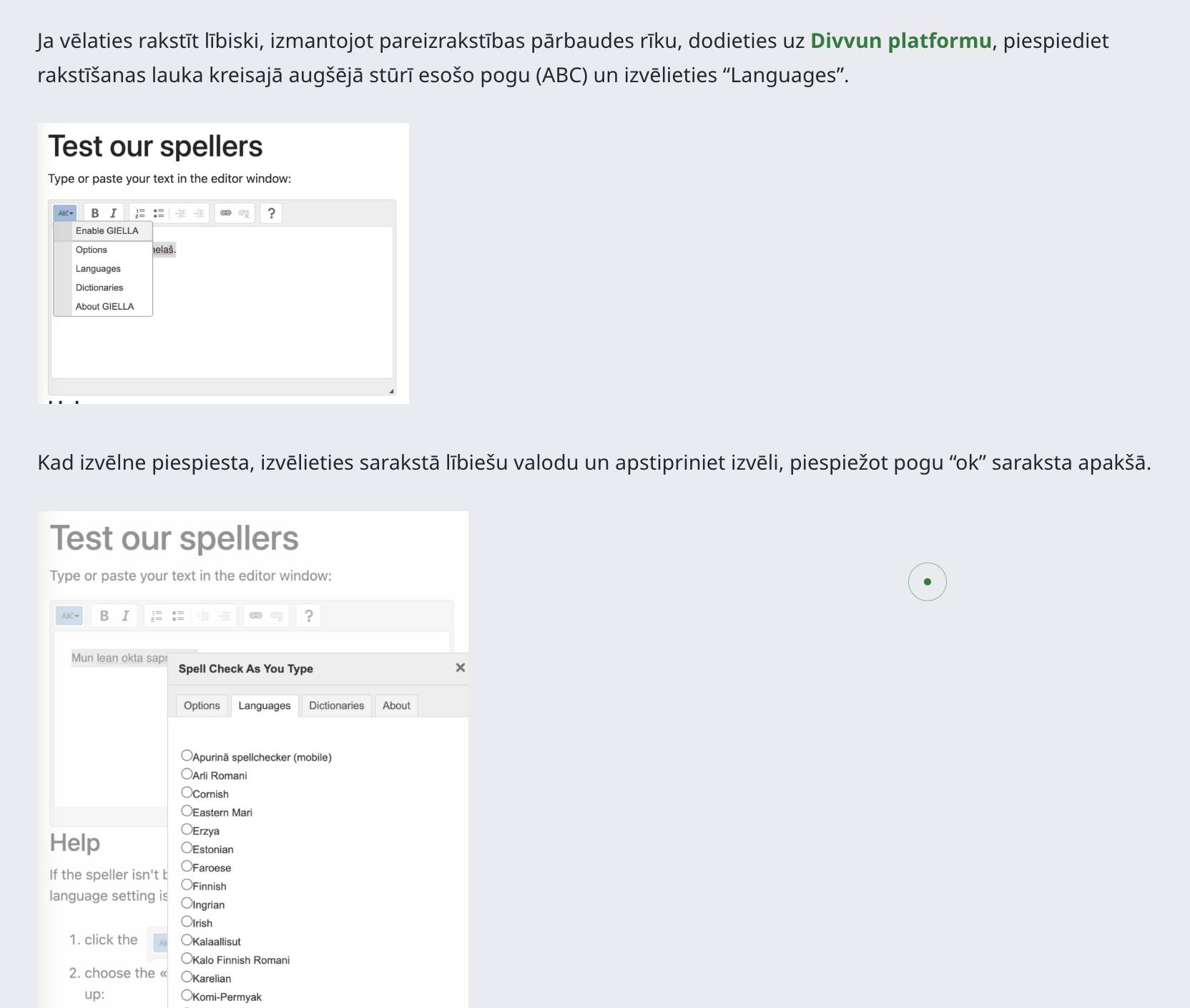
August 22
The application for the regular study of the Livonian language and cultural history at the Livonian Institute of the University of Latvia has been opened.
Children and youngsters can apply for these classes. Livonian language and cultural history lessons are possible with the support of the Ministry of Education and Science.
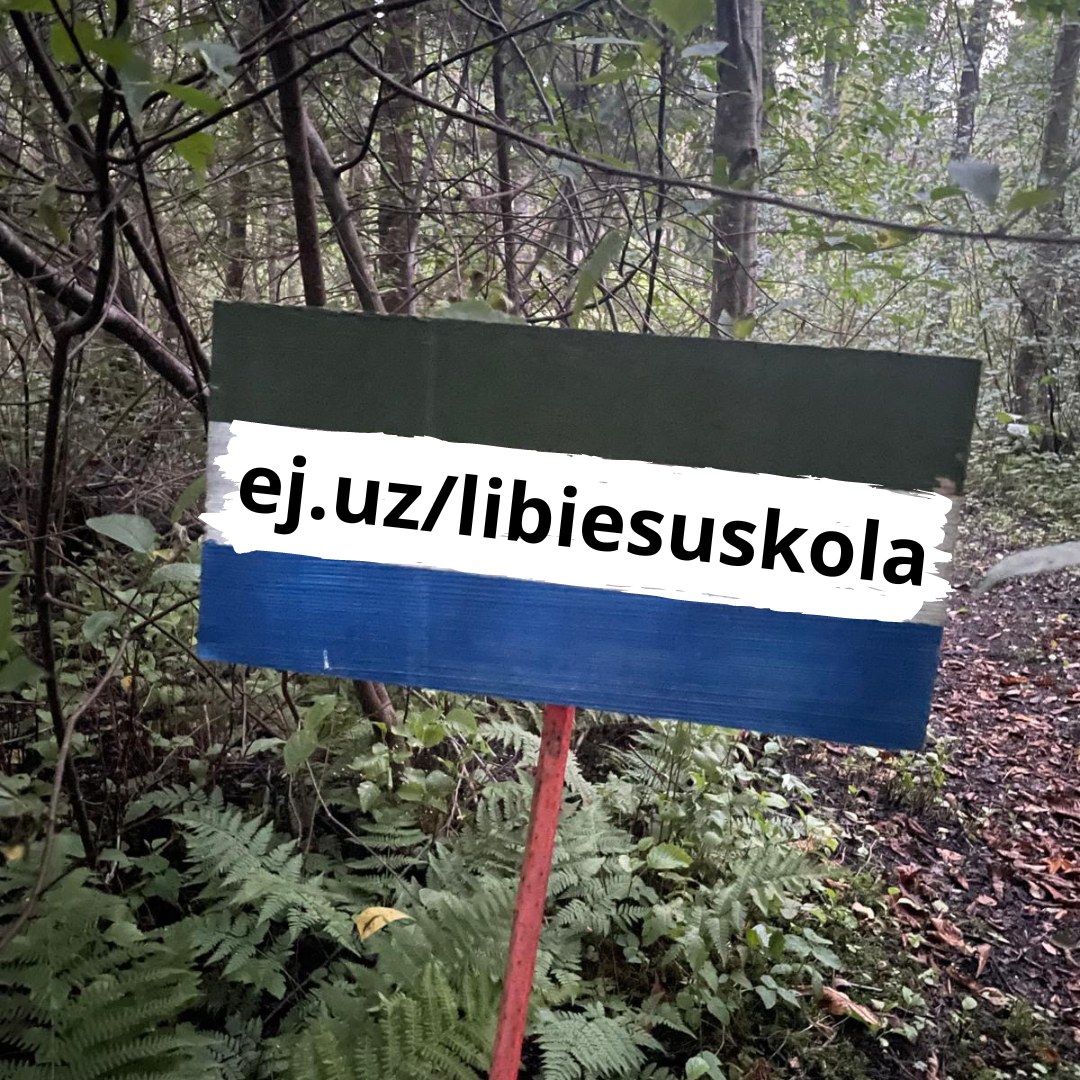
August 17
You can now also use the Livonian language on your device – mobile phone or tablet!
The keyboard for Android and iOS systems was created in collaboration with the Livonian Institute of the University of Latvia and the developers of Sami language resources at the Tromsø Arctic University “Divvun”, Sjur Moshagen, Srdan Kvrgic and Jack Rueter.
Find out how to use it on your device here.
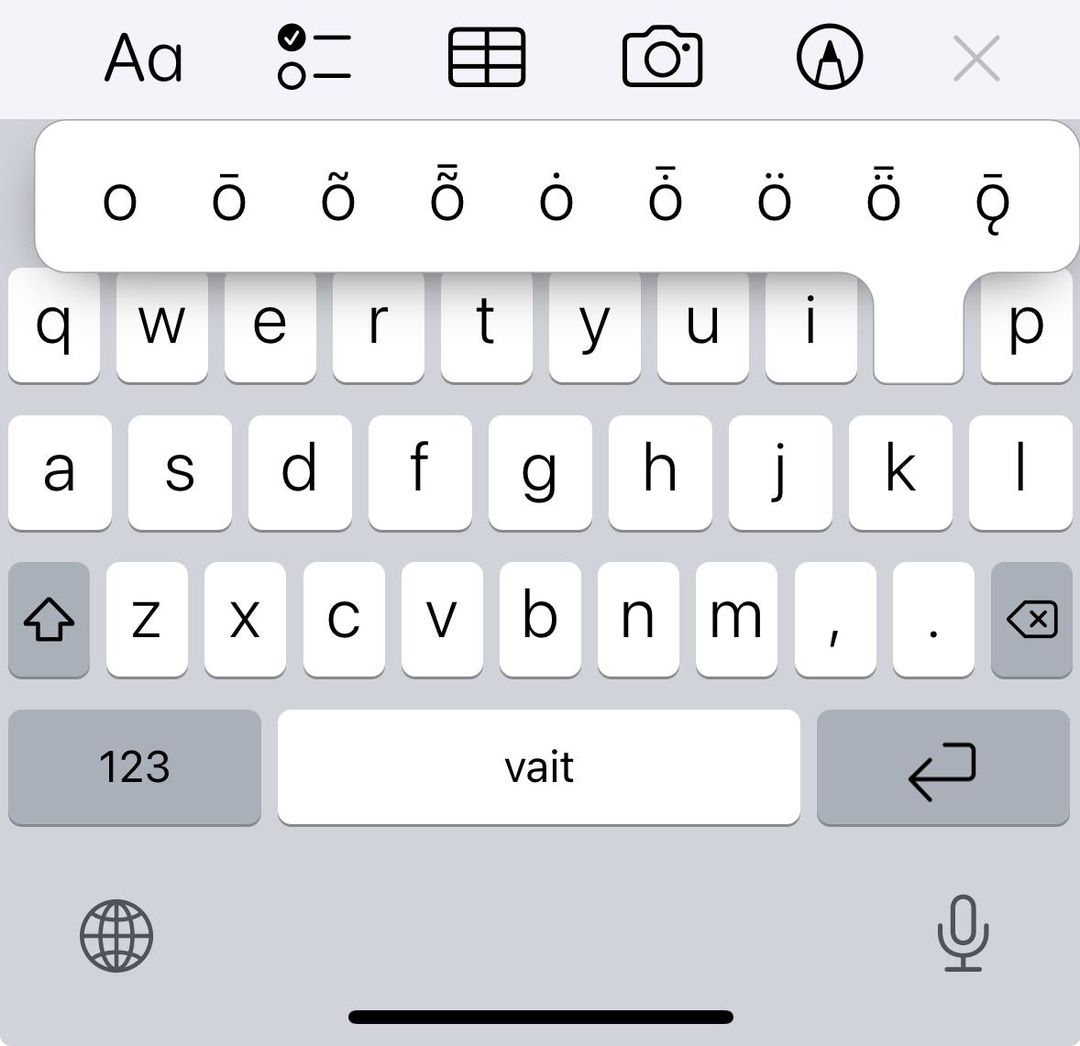
August 16
The seminar “Estonians of Ludza and parallels of the Soikāns family” is taking place at the Ludza Regional History Museum.
The seminar is organized by institute researcher Uldis Balodis. He is also one of the descendants of the Soikāns family and the most important documenter of the Estonian heritage of Ludza.
Find out more about the seminar here.
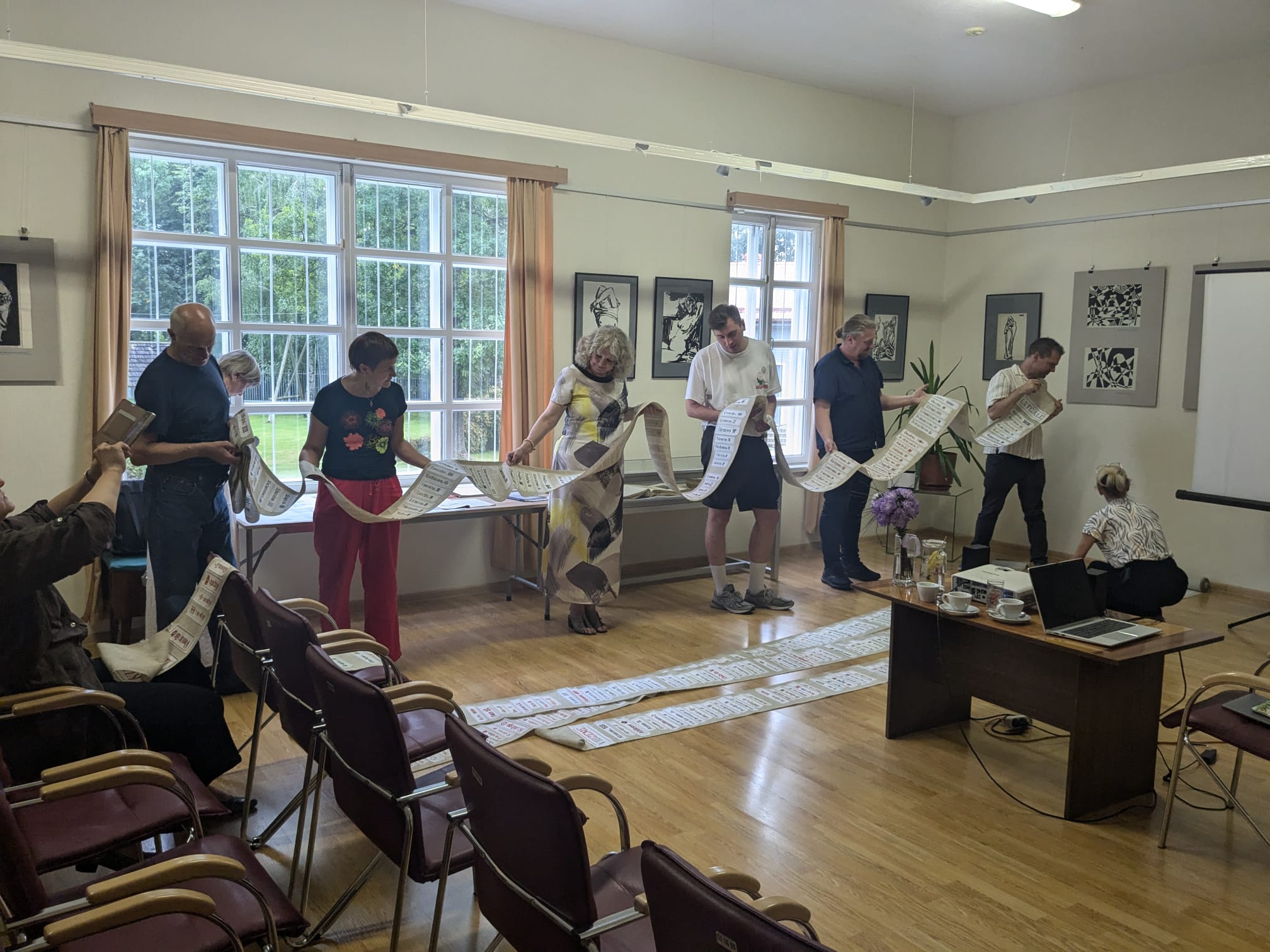
August 11
In Līgatne, the festival dedicated to writing, “Rakstivāls” is taking place, in which the director of the institute, Valts Ernštreits, is taking part.
At the festival, he also spoke about the importance of writing in creating and continuing the modern identity of Livonians, writing in the Livonian age of digital and artificial intelligence, and why the written word can be more effective than a voice message.
Find out more here.
August 7
The director of the institute Valts Ernštreits is a guest on Latvia’s Radio show called “Intermission with Toms Grēviņš”.
The program includes conversations about signs in the Livonian language, the present day of the Livonian people, youngsters, research and also the digital world, as well as Livonian music and poetry.
Listen to it here.
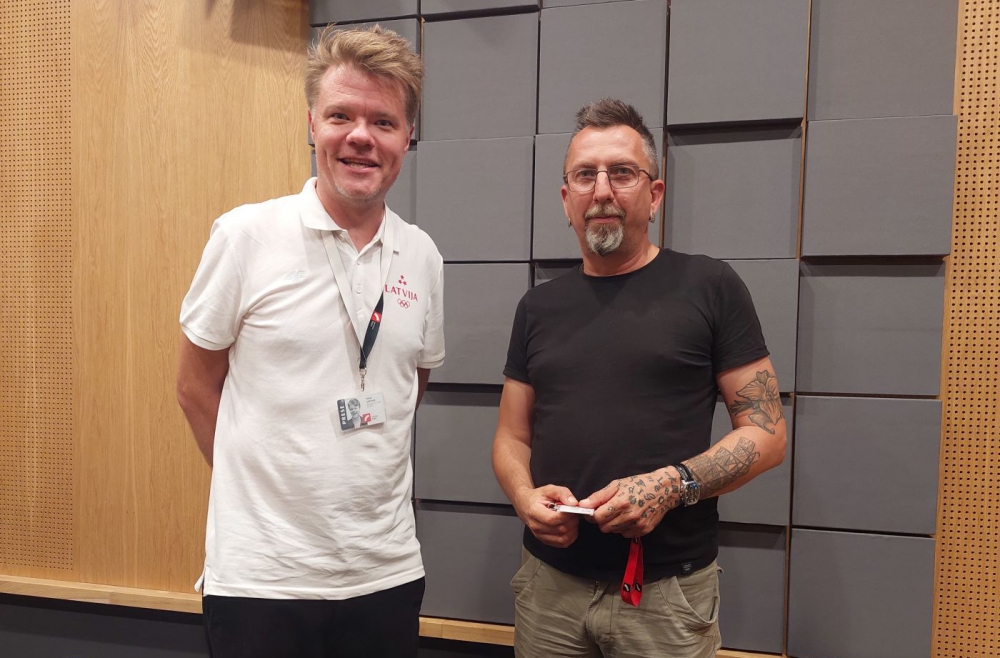
July 25 - August 4
The study program “Livonian Summer University” organized by the Livona Institute of the University of Latvia and the Institute of Estonian and General Linguistics of the University of Tartu is underway. The Livonian Summer University is taking place for the 4th time.
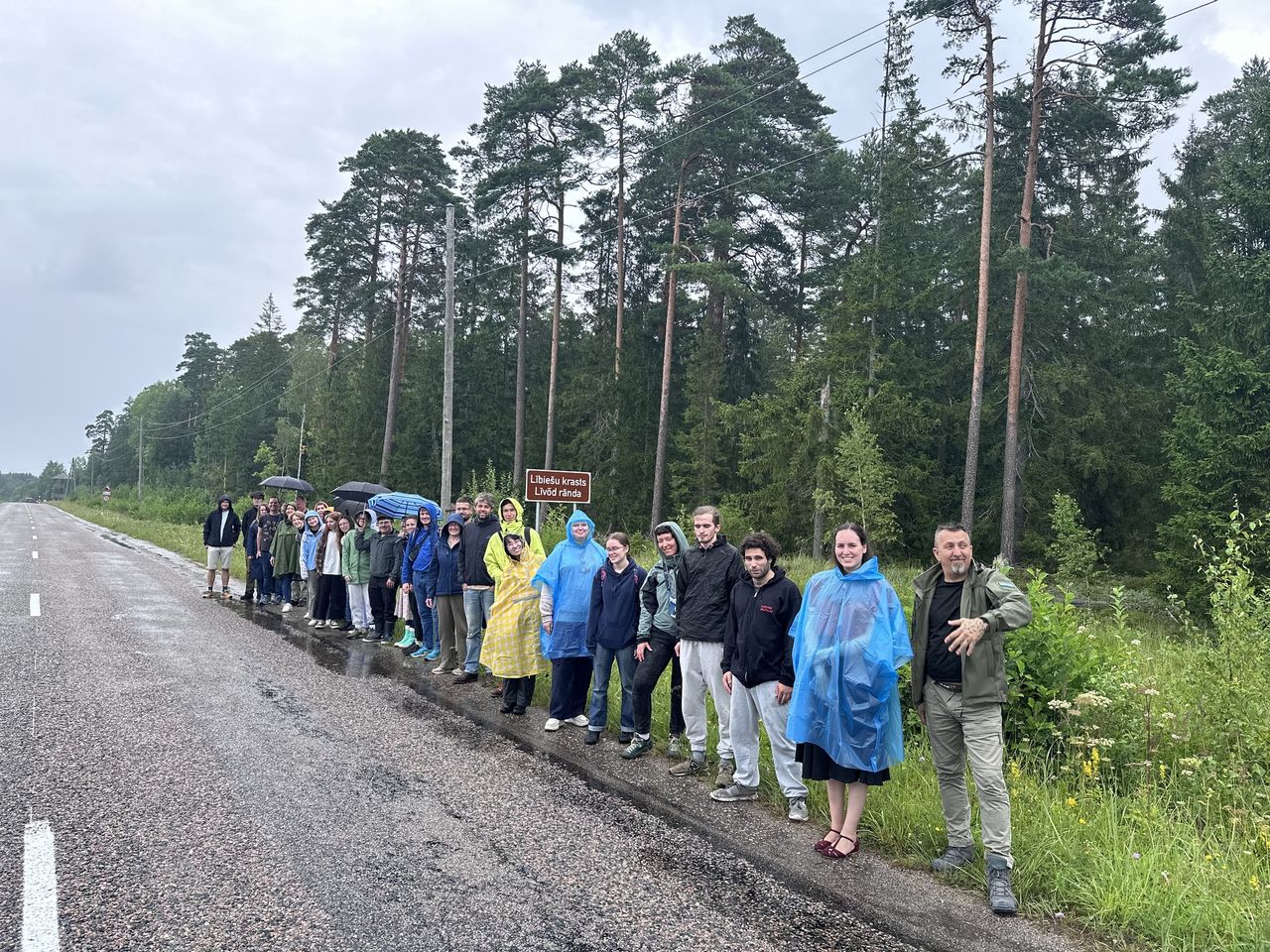
July 25 - August 3
The “Mierlinkizt” summer school for Livonian children and youngsters is taking place. It is taking place for the 30th time, and like every year, it is attended by Livonian children and young people who learn about the Livonian language, history and culture.
At the end of the summer school, a 30th anniversary concert “Min azūm” (“My summer camp”), prepared by the children themselves, will be held at the Livonian People’s House in Mazirbe on August 2 at 18.00
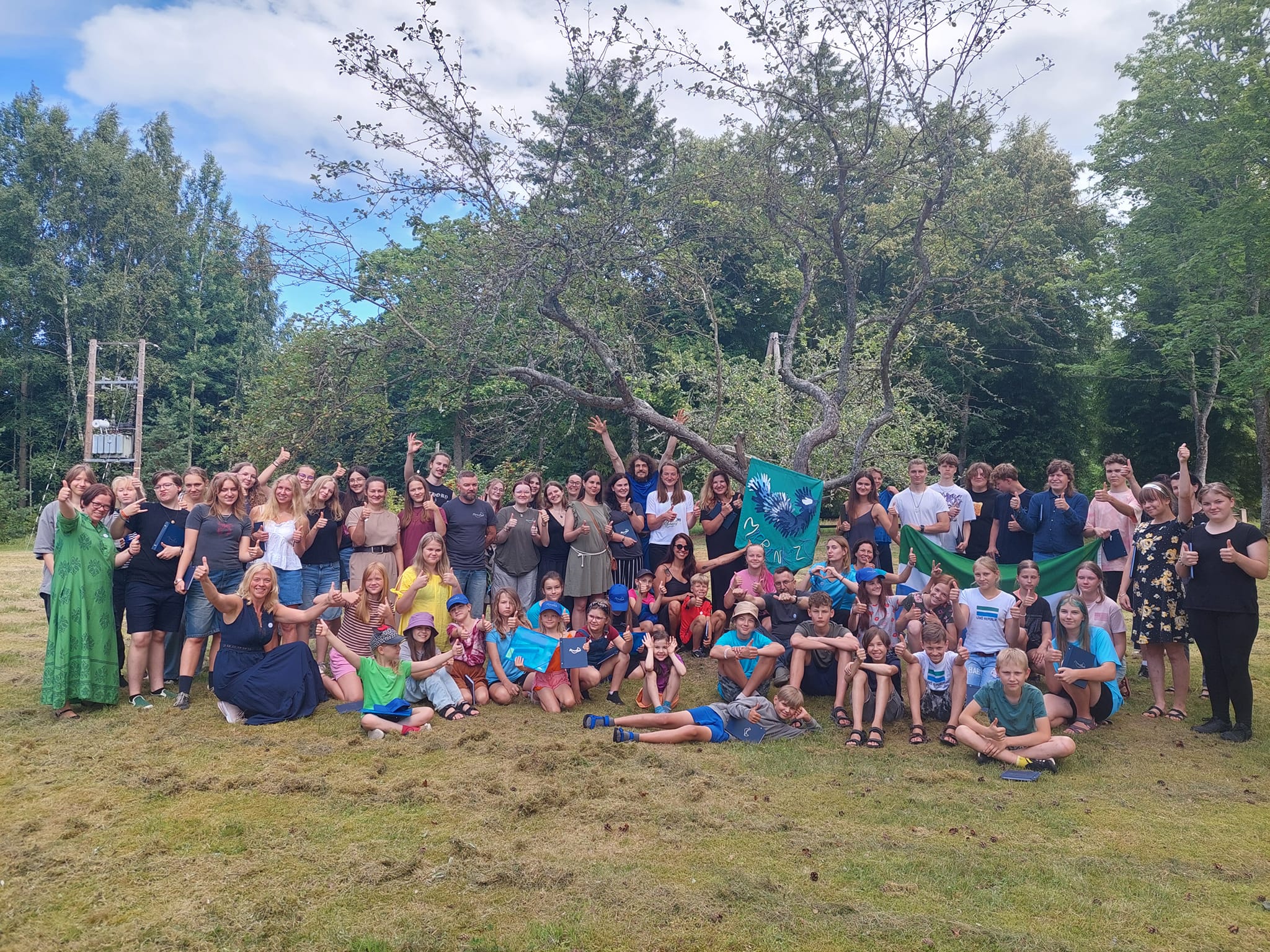
July 23 - September 30
“Volūda”, the Cultural Center of Latgale, the Latvian National Culture Center and the Livonian Institute of the University of Latvia are announcing the photo contest “JūrõTǟtõkst / PieZīmes / PīZeimis”!
The purpose of the competition is to draw attention to and remind people about the richness and diversity of the cultural and linguistic landscape of Latvia.
In the competition, all Latvian travelers are invited to capture in pictures and share the signs in the Livonian or Latgalian language they have noticed during their summer travels, or the border marks of Latvian historical lands. More: http://ej.uz/pizeimis
We definitely invite you to share your photos on your social media too!
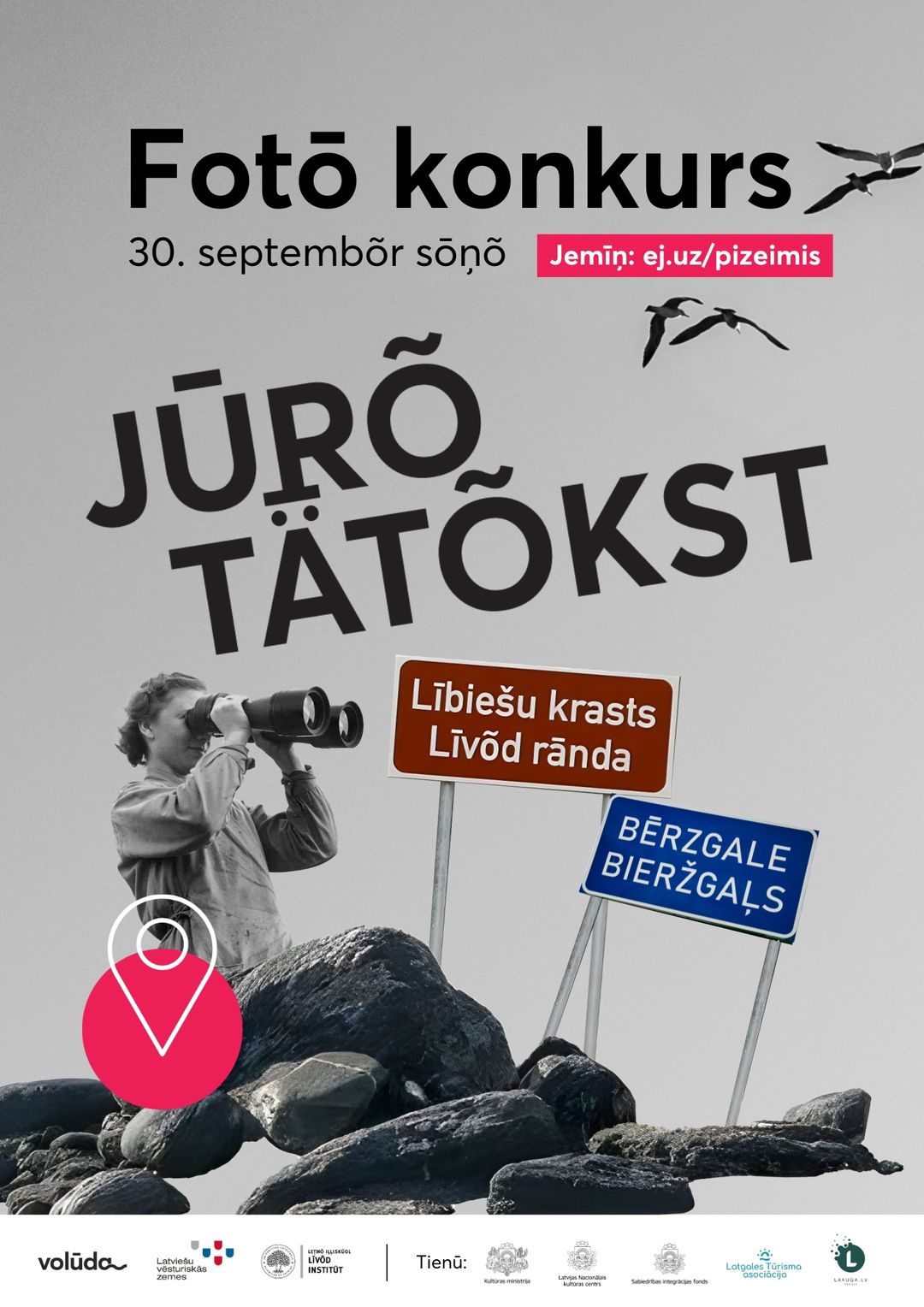
July 11
Institute researchers Valts Ernštreits and Gunta Kļava talk about the representation of Livonians and work in the expert groups of the UN International Decade of Indigenous Languages in the Latvian Radio program “Kultūras Rondo”.
Listen to it here.
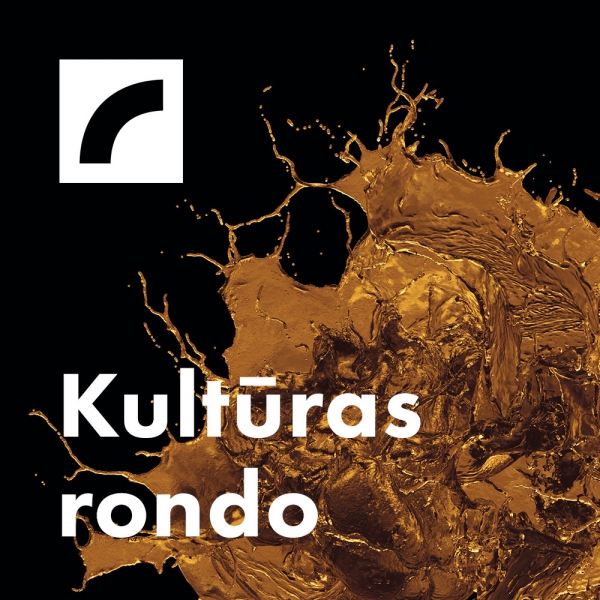
July 9
LU Livonian Institute researchers Valts Ernštreits and Gunta Kļava start work in expert groups of the UN International Decade of Indigenous Languages.
On 09.07.2024. a meeting of the Global Steering Group of the UN International Decade of Indigenous Languages (2022-2032) was held. It approved four expert (Ad-hoc) groups tasked with conducting research and making recommendations to the Global Steering Group for the Decade for Indigenous Language Learning, Heritage, Legal Status and Digital Equity.
In two of these expert groups, representatives of the Livonian Institute of the University of Latvia were also elected. The leading researcher of the institute, Dr. philol. Gunta Kļava will work in a group of experts whose focus is provision of education and domains for indigenous languages (Provision of education and domains for indigenous languages), while leading researcher Dr. Phil. Valts Ernštreits has been elected as the co-chairman of the expert group (Digital equality and domains) dedicated to the digital equality of indigenous languages and domains of digital use.
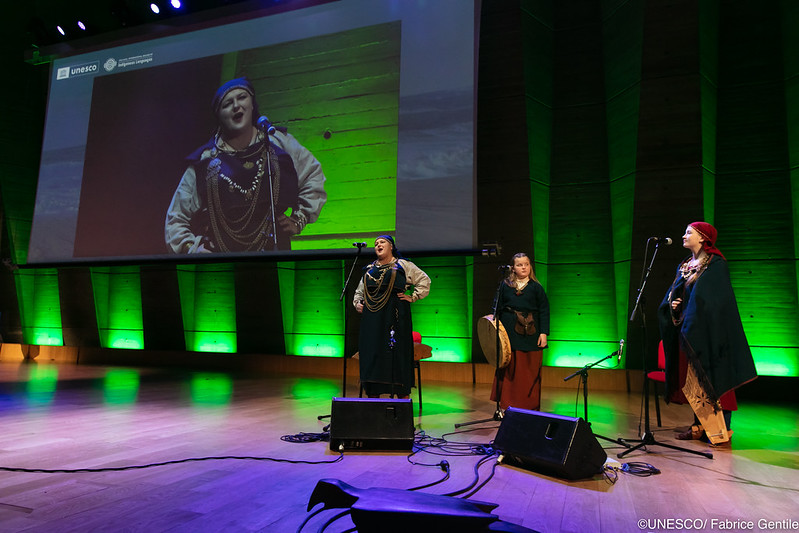
July 5-6
The Livonian tent at the Lampa discussion festival organized by the Livonian Institute.
Over the course of two days, talks about the Livonian language, history, culture and traces of the Livonians in the cultural landscape of Latvia take place in the Livonian tent.
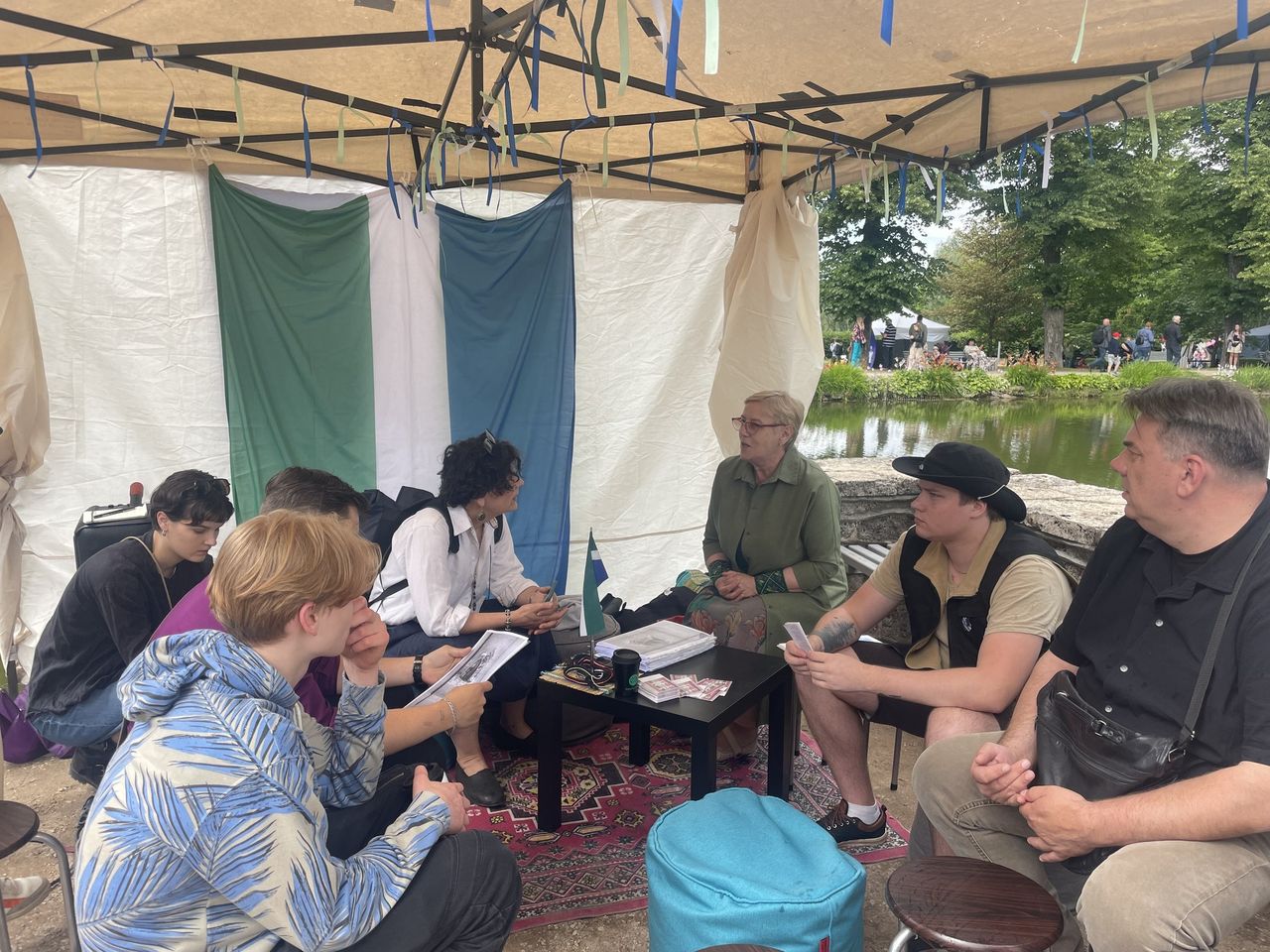
July 2-5
Tuuli Tuisk, a researcher at the Livonian Institute at the University of Latvia, is participating in the international conference “Speech Prosody 2024” in Leiden, the Netherlands.
More on the conference here.
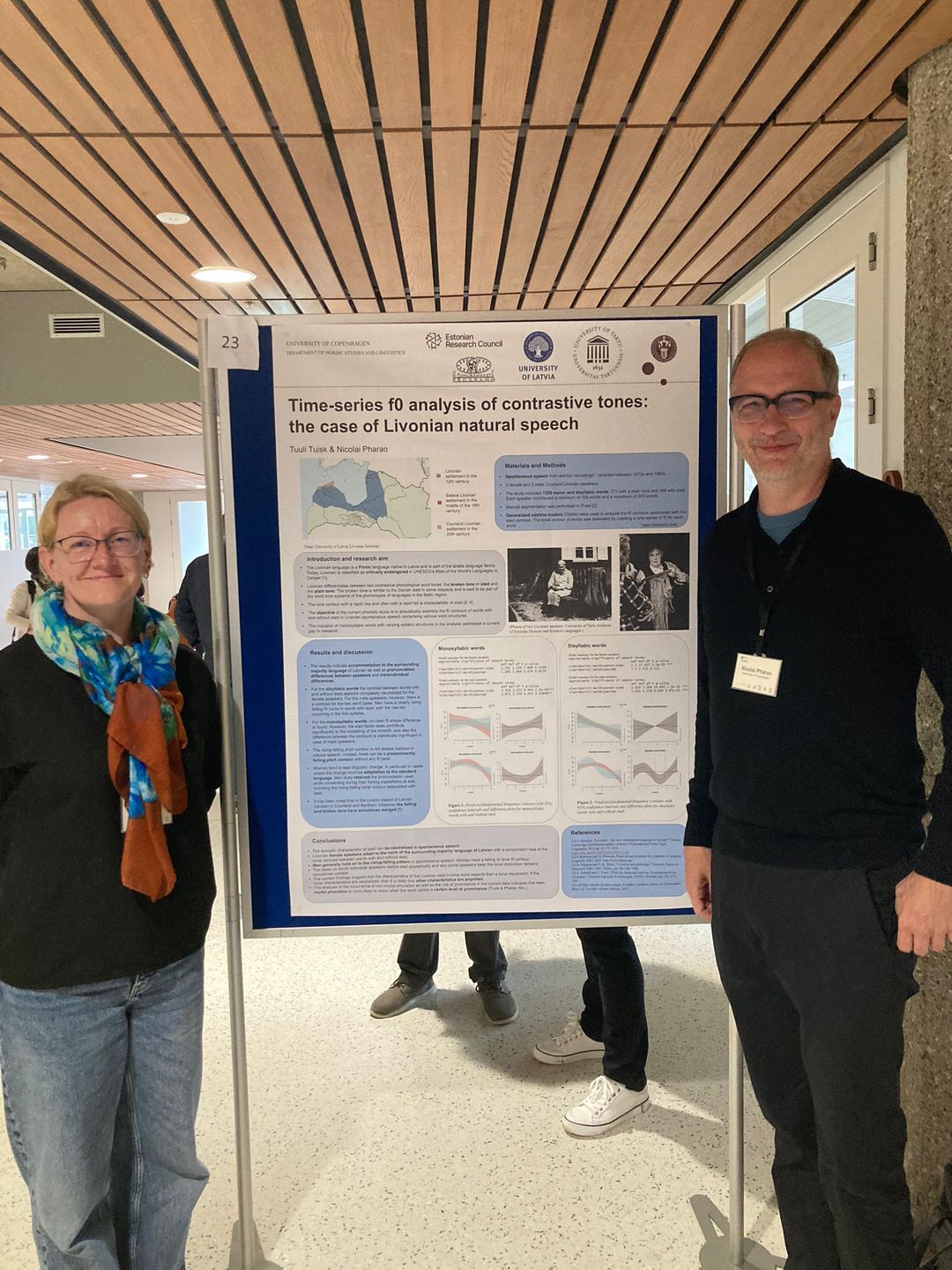
July 2
The participants of the event organized by the association Young Folks LV are visiting the LU Livonian Institute.
Young people visited the institute to learn more about Livonians, their history, culture and language. It is especially pleasant to hear that all young people became interested in Livonians at school, listening to their teachers talk about them!
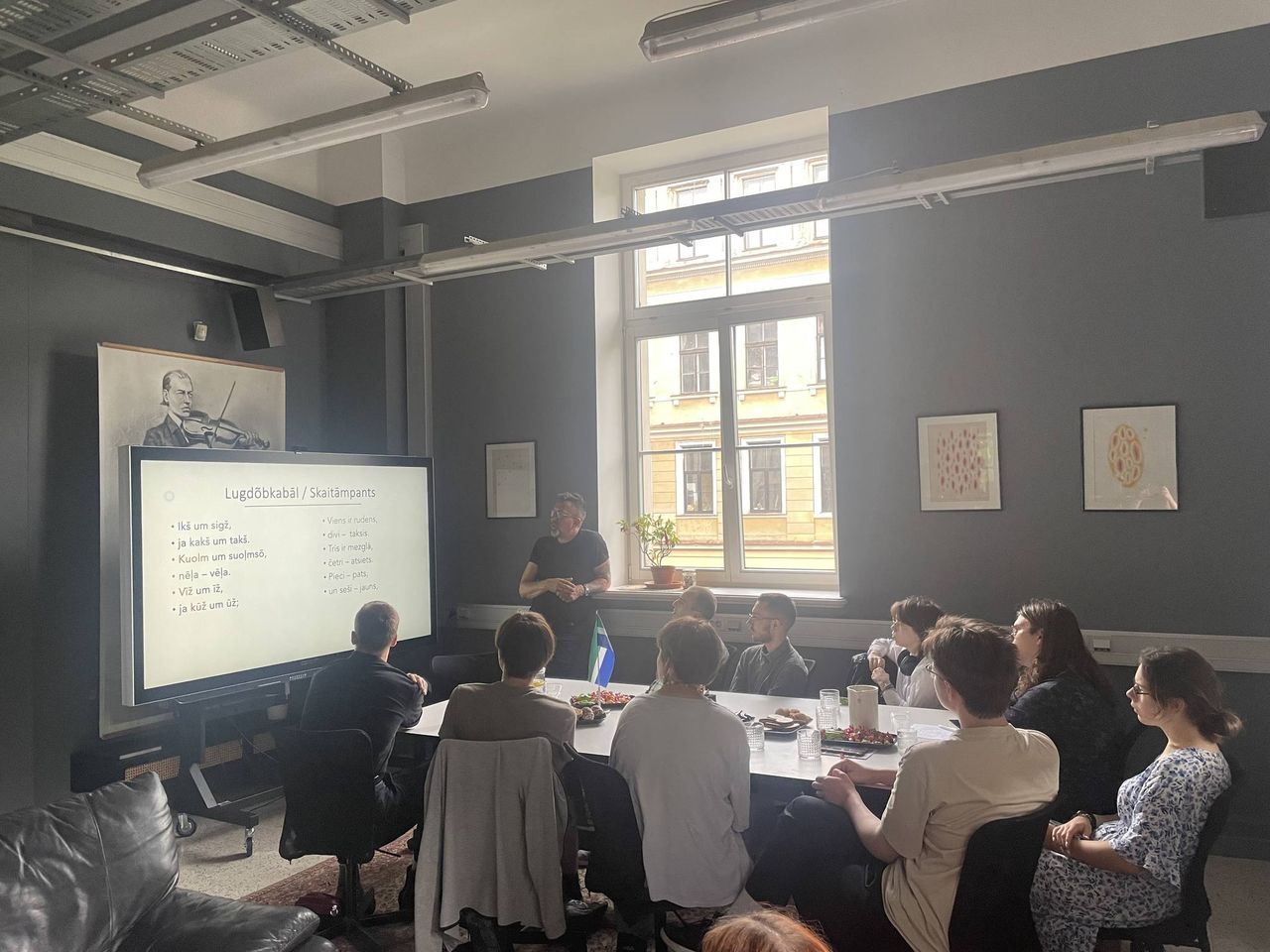
July 1
From July 1 to August 31, Gabrielė Repečkaitė, an ERASMUS+ exchange student from Vilnius University, will work at the Livonian Institute.
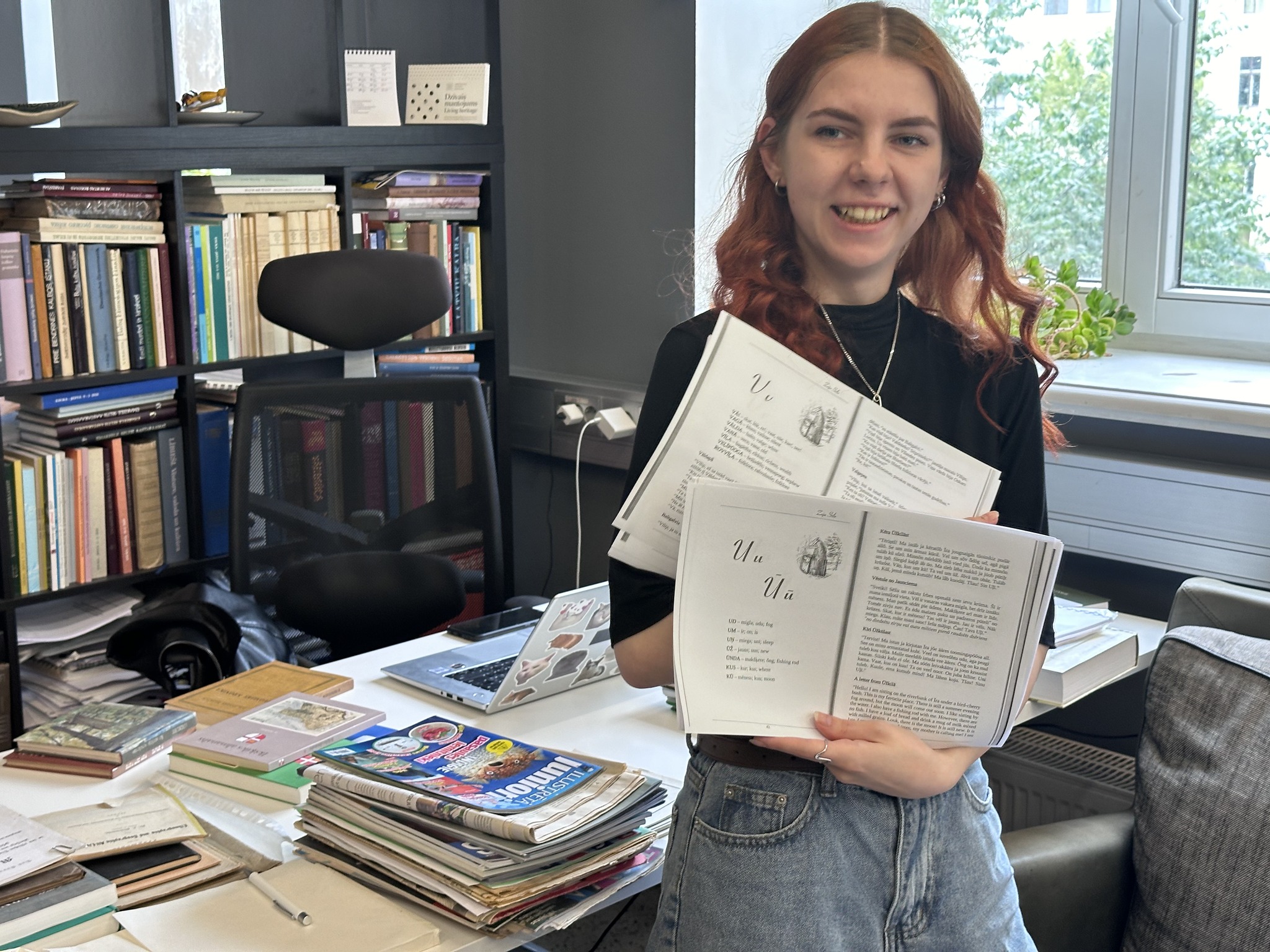
June 26-28
The international interdisciplinary conference “Livonica 3 + Minor Finnic Languages 2 = 5” is being held at the Livonian Institute of the Univerity of Latvia. It is organized by the Livonian Institute in cooperation with Tartu University’s Archaeology, Genetics and Linguistics Interdisciplinary Studies Board and Eesti Juured.
The conference is organized by combining two interdisciplinary conferences dedicated to the Finnic languages and cultures of the Baltic Sea and their contacts with neighboring languages and cultures. “Livonica” is a conference dedicated to studies related to Livonians, their language, culture and history. It was held for the first time in 2011 in Riga and Tartu, and the second conference was held in Riga in 2019. “Minor Finnic Languages” is a conference dedicated to the research of all Finnic languages of the Baltic Sea, except Finnish and Estonian. It was held for the first time at Uppsala University in 2022.
The joint conference “Livonica 3 + Minor Finnic Languages 2 = 5” will bring together historians, archaeologists, geneticists, anthropologists, folklorists, linguists and researchers from other fields, promoting the importance of an interdisciplinary approach to scientific excellence. In this conference, special attention is paid to the contacts between the languages and cultures of the Central Baltic Sea area. The purpose of the conference is to give researchers the opportunity to present their current research, to get acquainted with new research findings in related fields, as well as to participate in formal and informal discussions and, above all, to find new cooperation opportunities for joint future research.
The plenary sessions of the conference will be led by internationally recognized scientists in the relevant fields – professor of archaeogenomics Kristiina Tambets from the University of Tartu, professor of Finnic languages Rogier Blokland from Uppsala University and professor of Baltic languages Jurgis Pakerys from the University of Vilnius.
Members of the scientific commission of the conference: prof. Karl Pajusalu (University of Tartu), Dr. Phil. Valts Ernštreits (University of Latvia), prof. Petar Kehajov (University of Tartu), assoc. prof. Riitta Liisa Valijärvi (Uppsala University, University College London), prof. Ina Druviete (University of Latvia), prof. Mark Fishel (University of Tartu), Mg. history Eduards Plankājs (University of Latvia).
The conference programme can be found here.
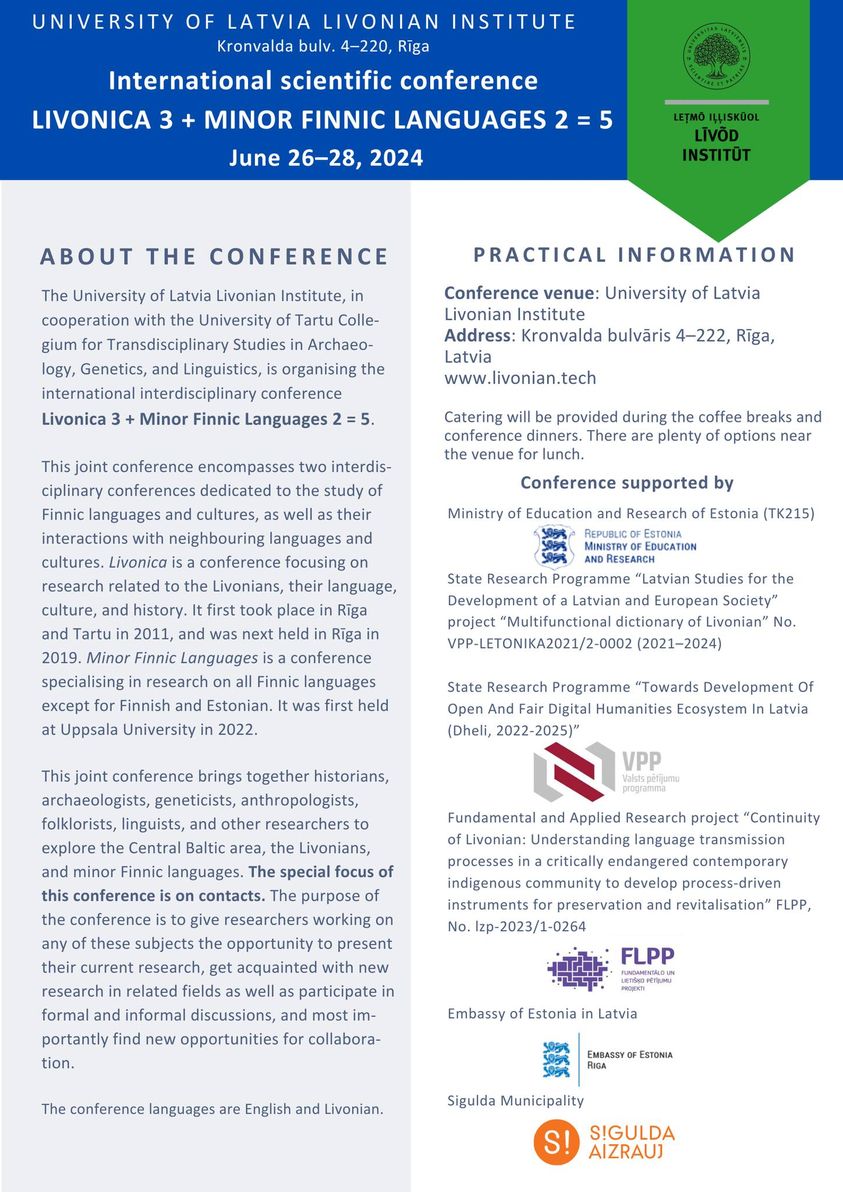
June 23
Happy Midsummer and have a wonderful summer! Knaššõ Jōņpäuvõ ja rikāzt sõvvõ!
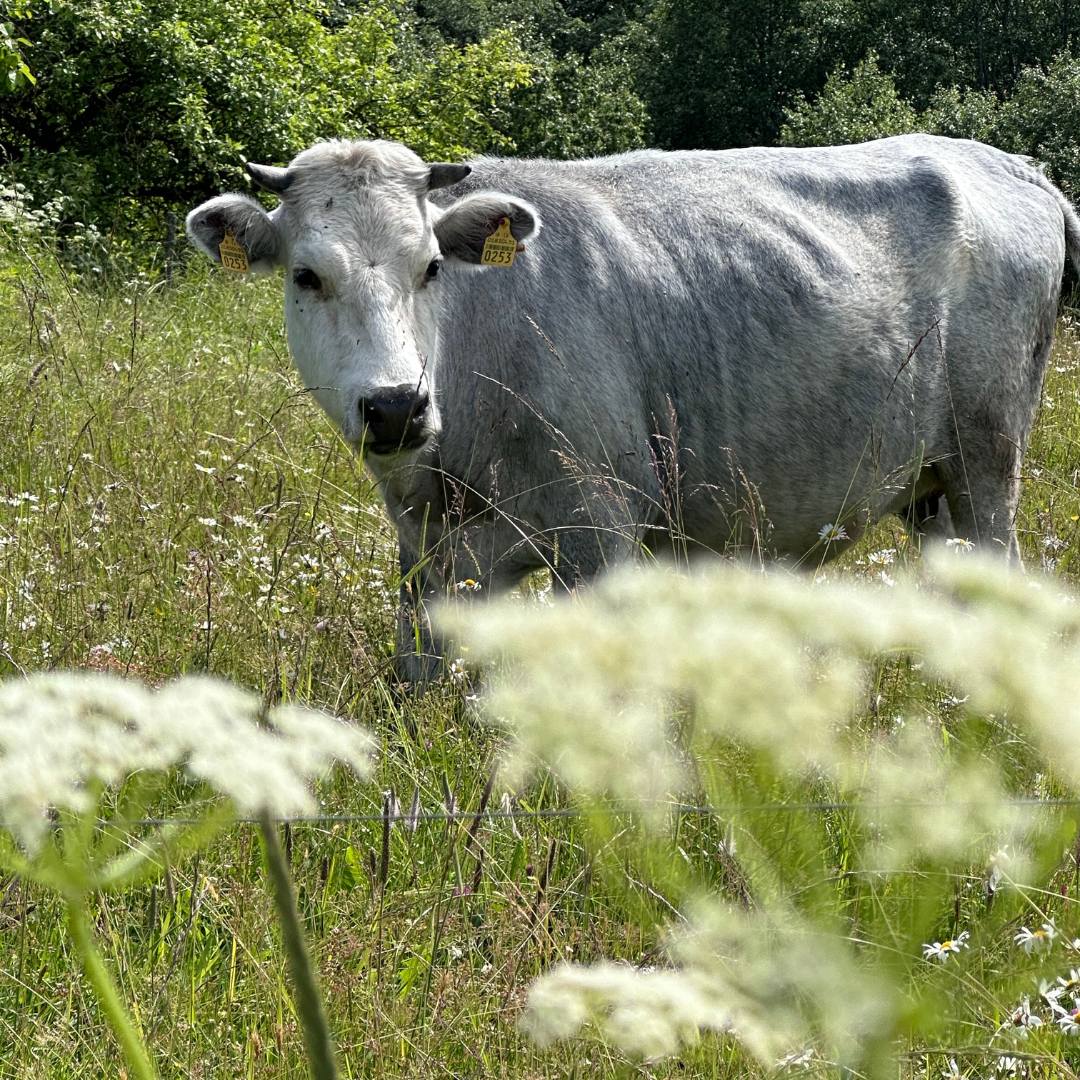
June 19
The final installment of the Livonian book club “Vešpraiga” before the summer vacation is held at the Livonian Institute of the University of Latvia.
The book reading club led by Zoja Sile will continue in autumn.

June 18
A new series of the digitalhumanities.lv broadcast “At-risk communities: Livonians and DH” has been created, in which Haralds Matulis talks with the director of the Livonian Institute of the University of Latvia, Valts Ernštreits.
The conversation is devoted not only to the digital resources of the Livonian language, but also to how the development of digital resources and tools of digital humanities, language and culture can help critically endangered languages - both in their preservation and research, as well as in the revitalization process.
June 13-16
The regular AABS (Association for the Advancement of Baltic studies) conference is held at Yale University in New Haven, USA, in which the Livonian Institute of the University of Latvia is widely represented.
More on the conference here.
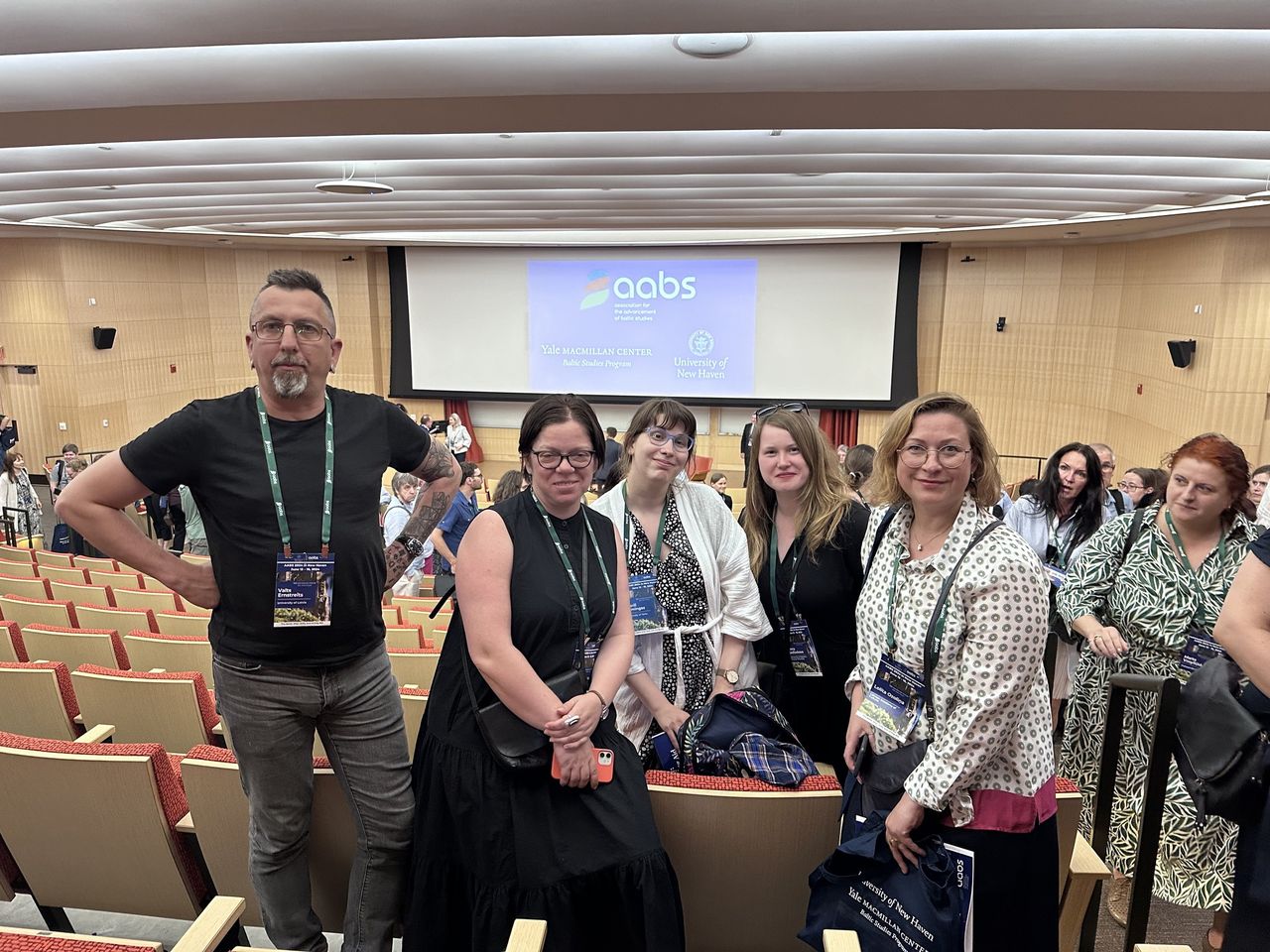
June 12
The regular meeting of the Latvian Historical Lands Development Council is taking place, in which the director of the institute, Valts Ernštreits, is taking part.
May 27-31
Two young researchers of the Livonian Institute, Arnita and Bridget, participated in the IFUSCO 2024 conference of Finno-Ugric students in Budapest.
They presented their research. Bridget spoke about the role that the members of the Livonian traditional music ensembles see for themselves in the revitalization process, while Arnita spoke about the first observations in the use of the passive present participle (-tõb) of the Livonian language. They had the opportunity to exchange with other young researchers and attend lectures on, for example, the current situation of the Khanty people.
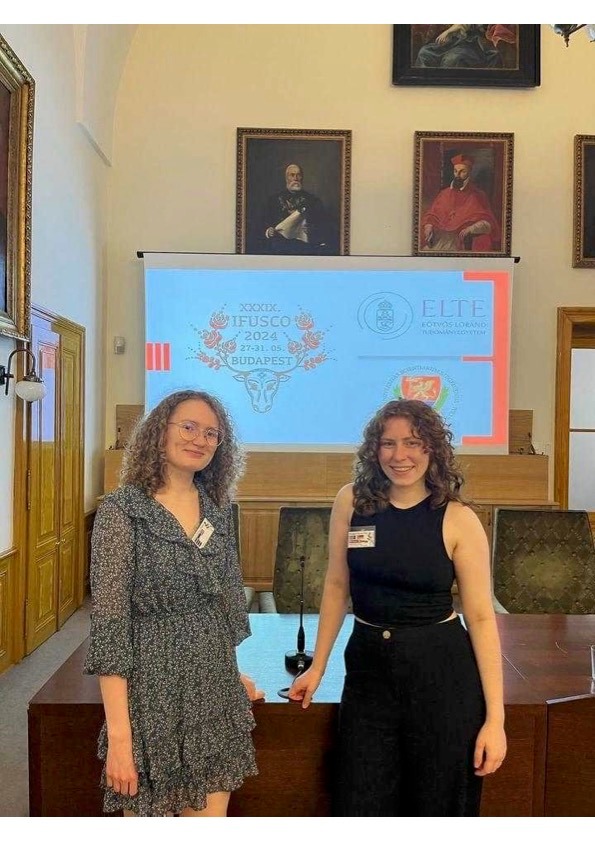
May 26-28
The first meeting and seminar of the partners of the Runksa project took place on Ruhnu Island. The project consists of documenting and popularizing the Swedish language used on the island.
The project is implemented by the Institute of Estonian and General Linguistics of the University of Tartu, Ruhnu Kultuuriruum, University of Gothenburg, Ruhnu Island Residents’ Association (Sweden) and the Livonian Institute of the University of Latvia. The project is supported by Nordplus Nordic Languages 2024.
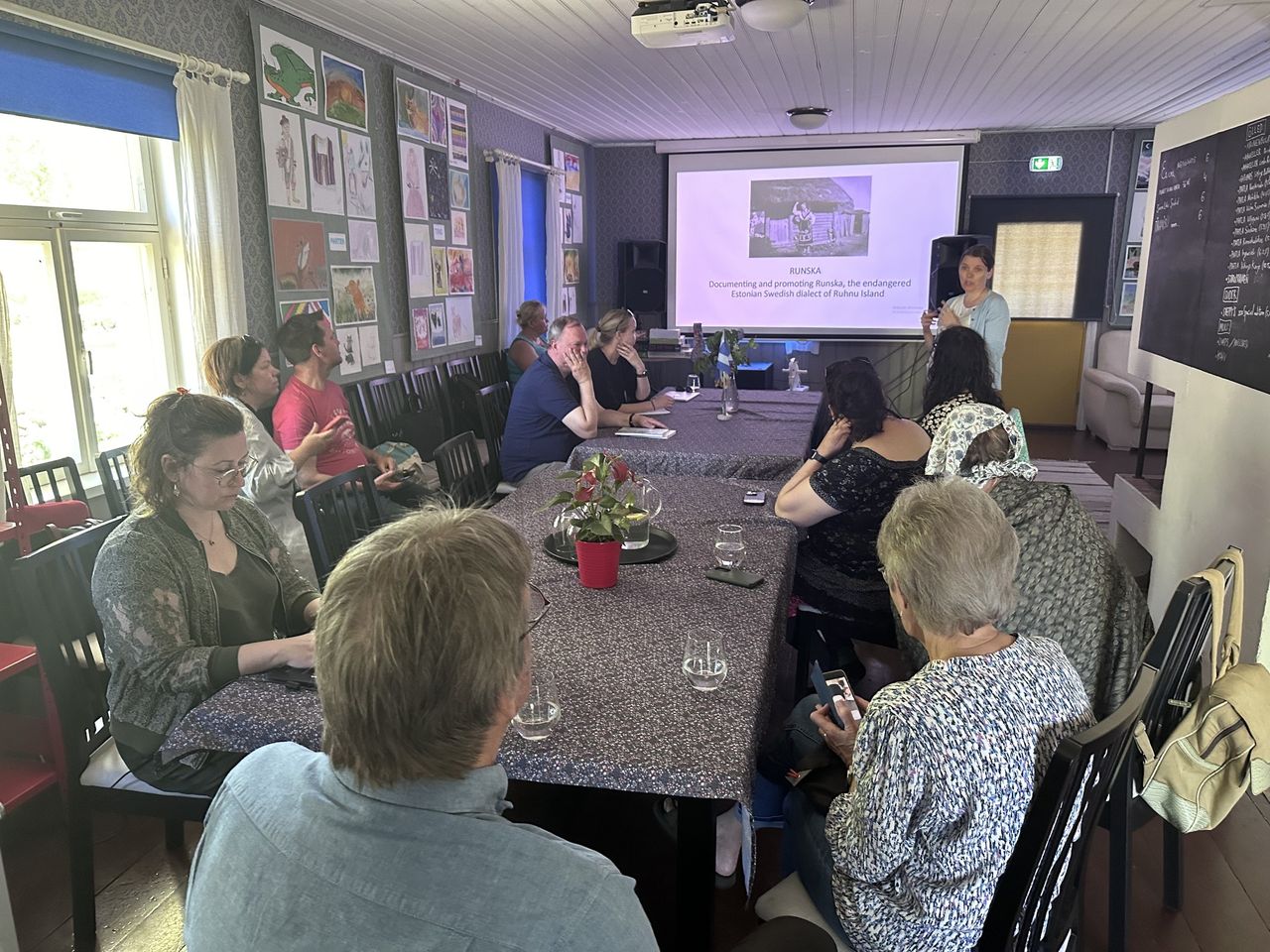
May 26
The Estonian linguistics magazine “Keel ja Kirjandus” published an interview with the director of the Livonian Institute of the University of Latvia, Valts Ernštreits, celebrating his 50th birthday.
Read the interview here.
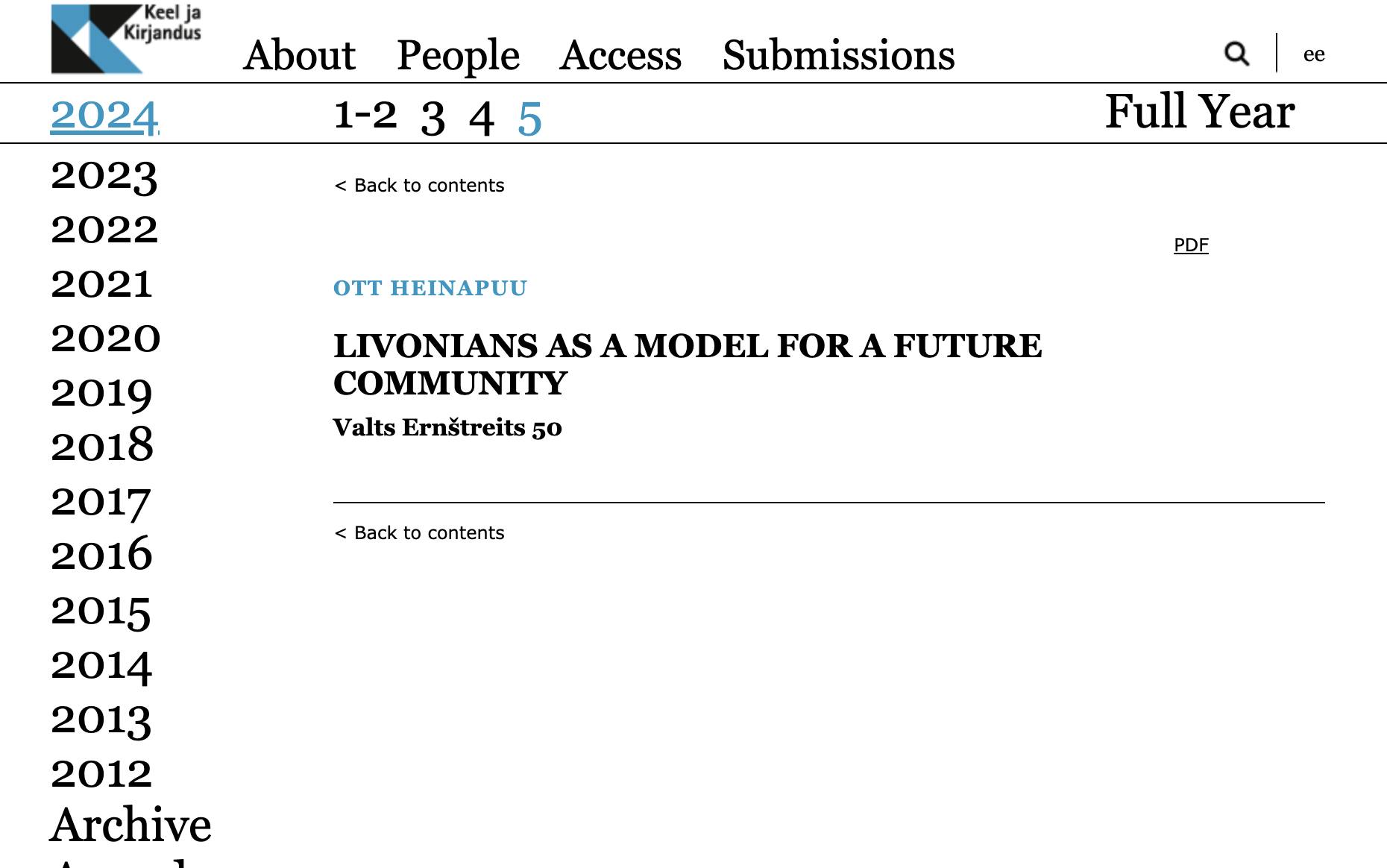
May 17
The leading researcher of the institute, Gunta Kļava, participates in the XXI international scientific conference of RTU Liepāja Academy “Language learning: problems and perspective” (“Valodu apguve: problēmas un perspektīva”).
In her report, G. Kļava talked about the possibilities of expanding the environment for learning and using the Livonian language.
More on the conference here.
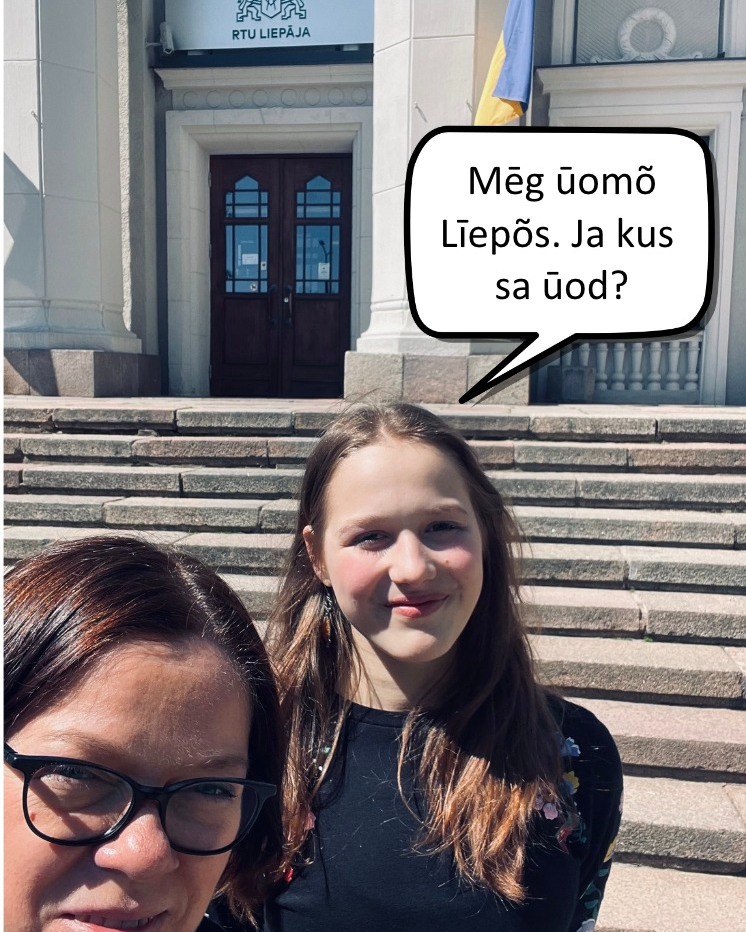
May 14
Students of the University of Tartu, who are also learning the Livonian language as part of their studies, visit the institute.
Students of the University of Tartu (TU) under the guidance of lecturers Miina Norvik and Tuuli Tuisk visit the institute every year, and it has already become a tradition. This year, the number of students of Livonian has reached a new record, and now there are already 15 students from different countries.
A special event this time was meeting TU student Marta Kohva, who once – 12 years ago – drew illustrations for Kārlis Stalte’s alphabet “Jelzi sõnā” (‘Living word’).
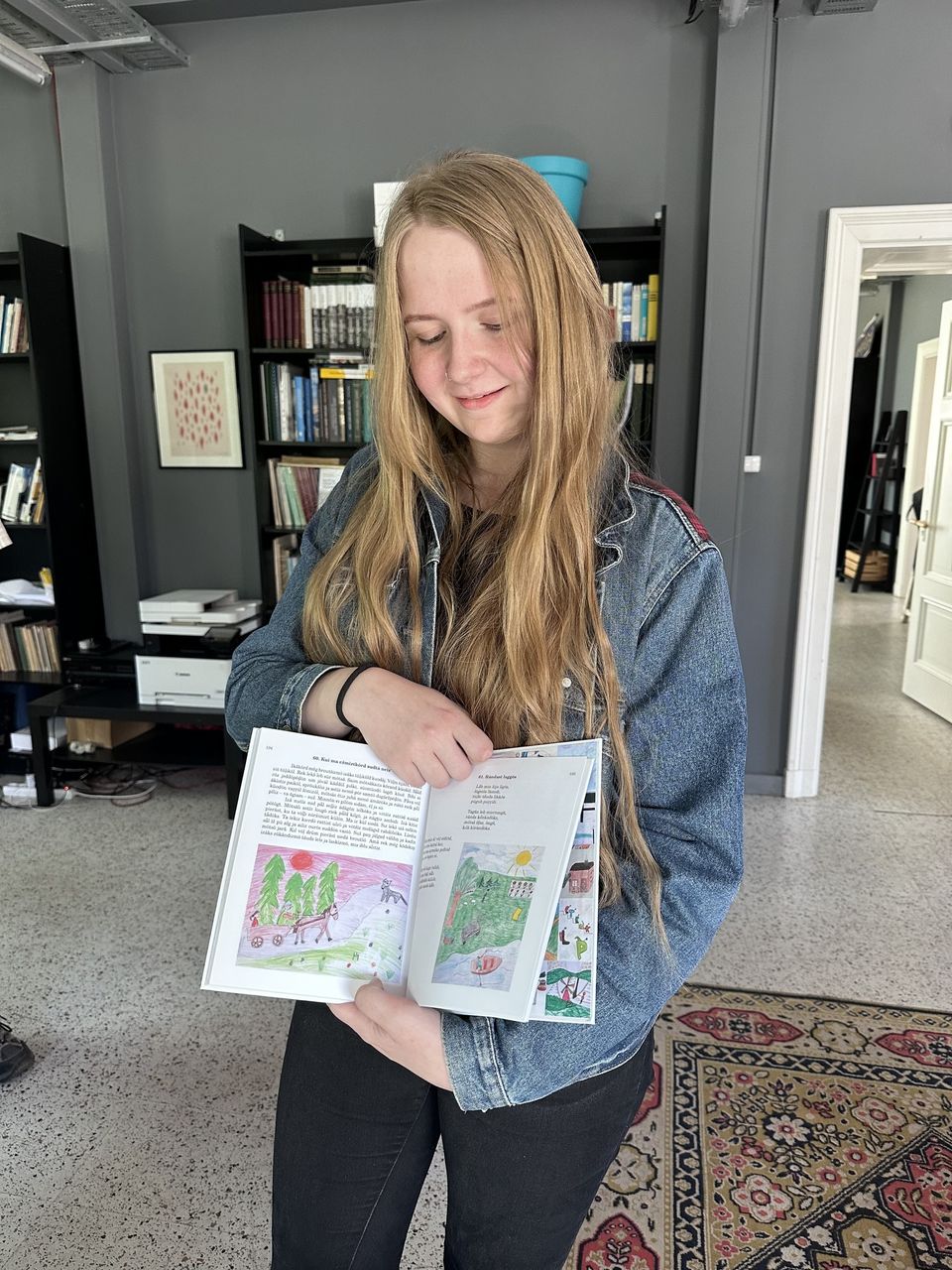
May 14
The director of the institute Valts Ernštreits visits Salacgrīva secondary school with stories about the Livonian language, culture and history.
When asked if any of the students knew about their possible Livonian origins, more than five hands went up in the air, including the hand of one of the teachers. As always, this confirms that the Livonians are still here, next to us!
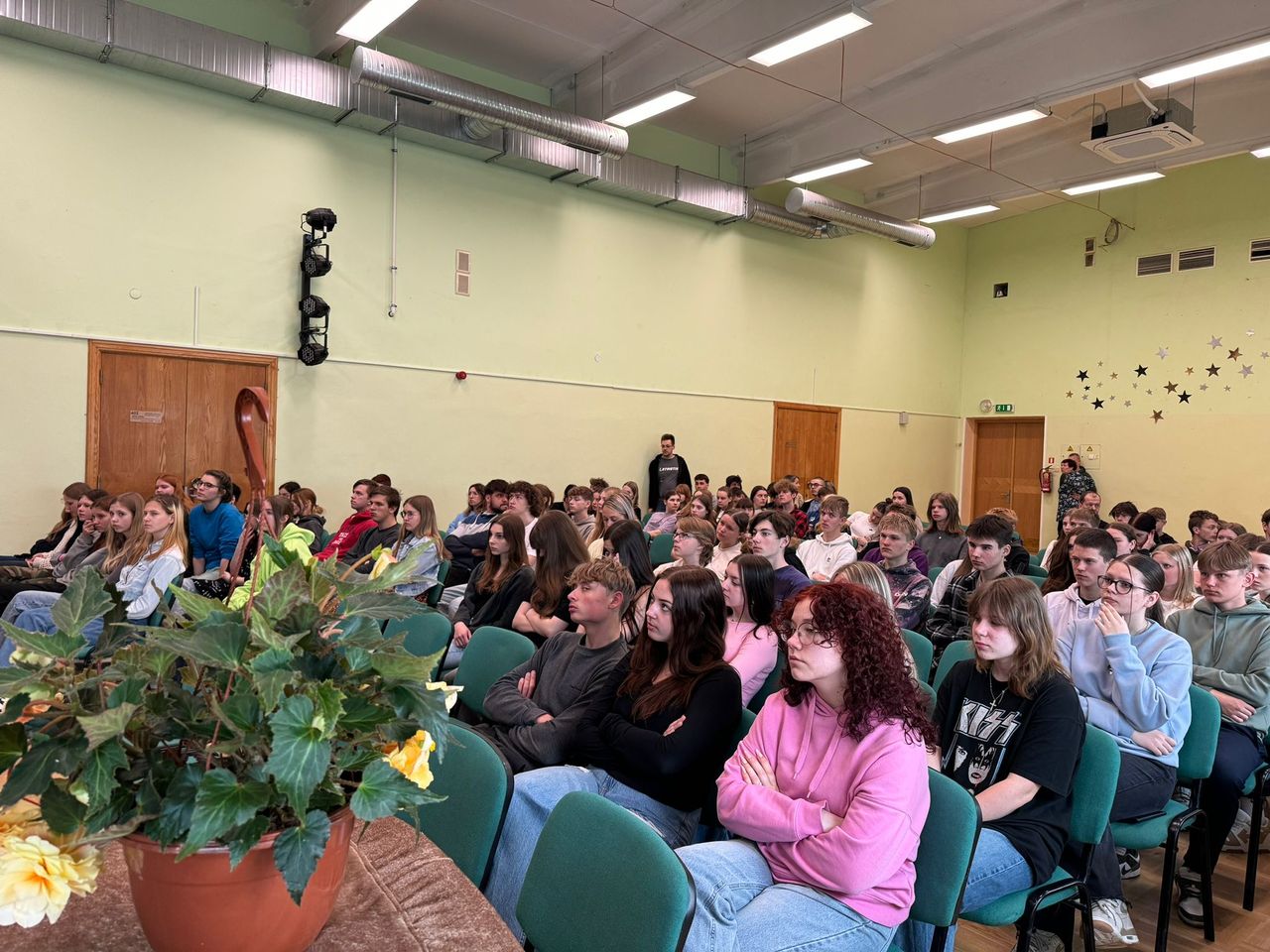
May 9
In the newspaper ventasbalss.lv, you can read an interview with our colleague Bridget Moran-Nae, conducted by historian Līga Gabrāne. Bridget studies Livonian ensembles and their role in the revitalization of the language.
Read the interview here.
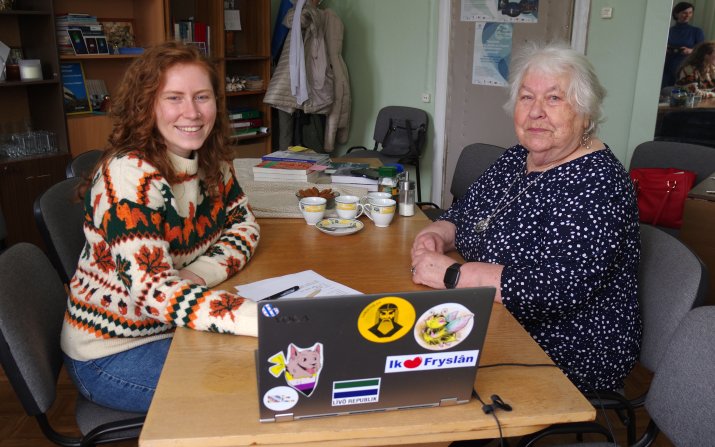
May 9-10
The 3rd international scientific onomastics research conference “Change of proper nouns” organized by the Institute of the Latvian Language of the University of Latvia is taking place.
The director of the Livonian Institute, Valts Ernštreits, is participating in the conference with a report on the heritage of Latvian place names and the problems of installing official signs.
Abstracts can be found here.
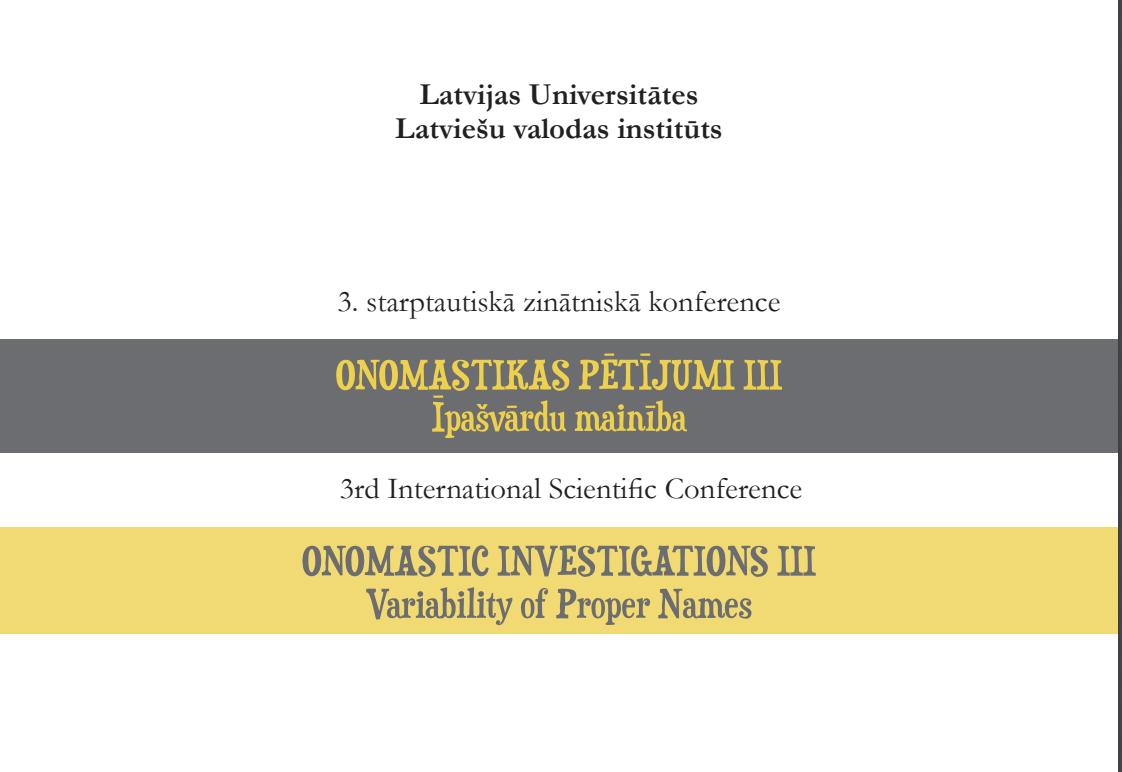
May 6-7
Institute researchers Valts Ernštreits and Gunta Kļava are visiting the Ludwig and Maximilian University in Munich.
Lectures on the Livonian language and culture, development and future issues of Livonian were held for the students of the Institute of Finno-Ugric Studies.
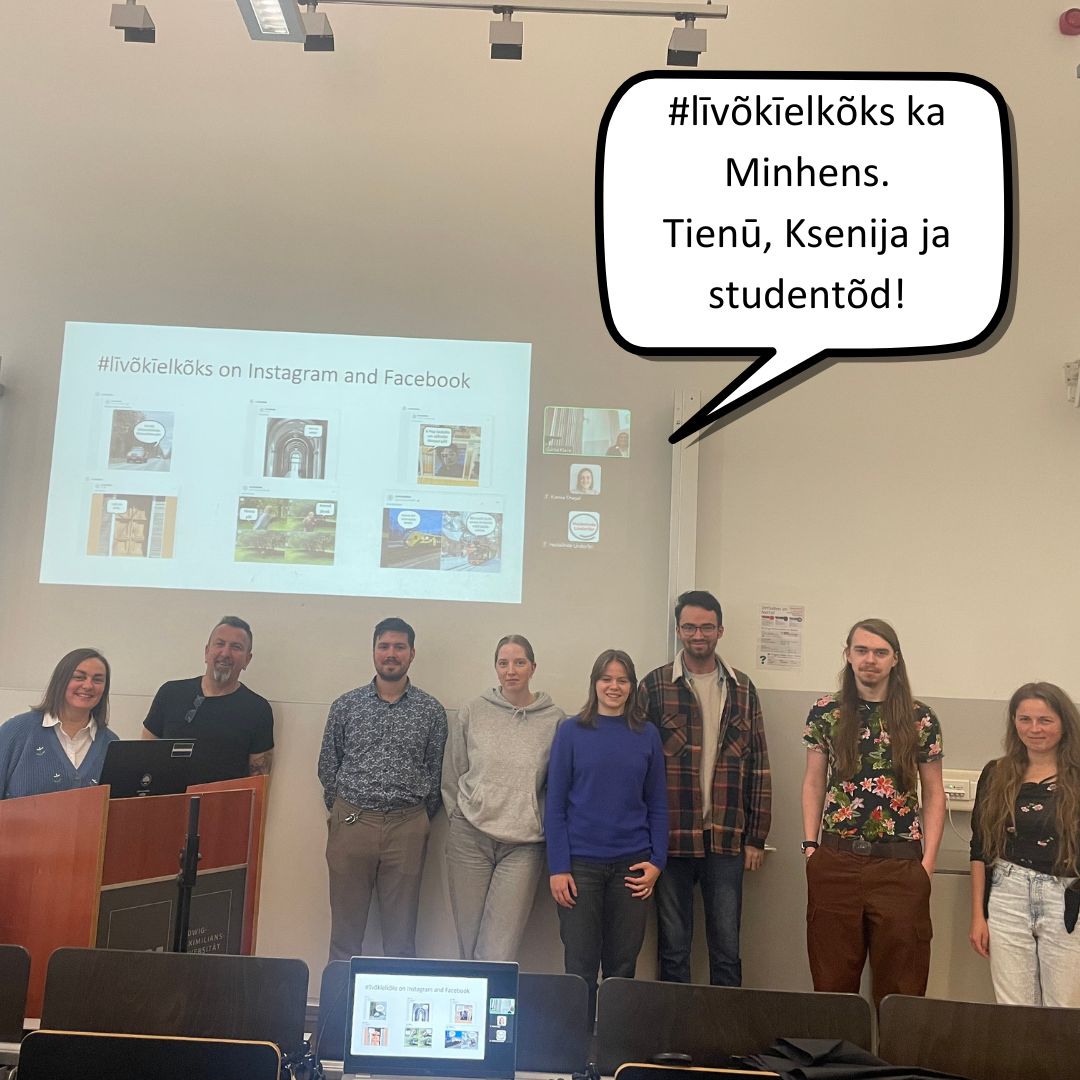
May 6
Institute researcher Milda Kurpniece held a seminar on the Livonian language and culture for the students of the Scandinavian Studies Center of the Philology Faculty of Vilnius University.
April 25-26
The Baltic Digital Humanities Forum is held in the House of Sciences of the University of Latvia, in which Valts Ernštreits participates in several panels and working groups, presenting the achievements of the Livonian Institute of the University of Latvia in this field.
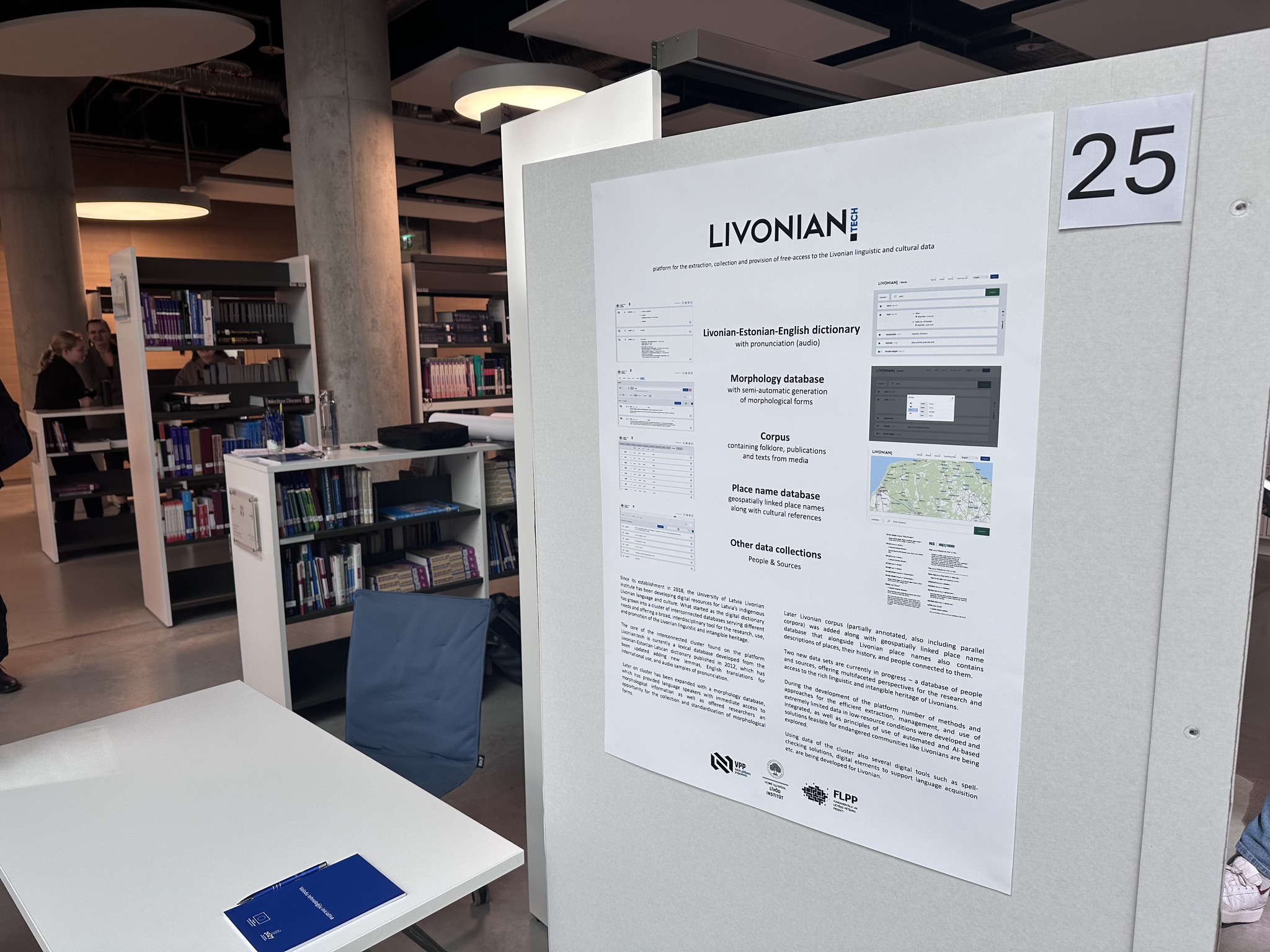
April 19
The newspaper “Ventas Balss” writes about the work of the institute’s researcher Bridget Moran-Nae.
The researcher in the Institute’s FLPP project “Continuity of Livonian: Understanding language transmission processes in a critically endangered contemporary indigenous community to develop process-driven instruments for preservation and revitalisation” studies the importance of Livonian music ensembles in the preservation of the Livonian language.
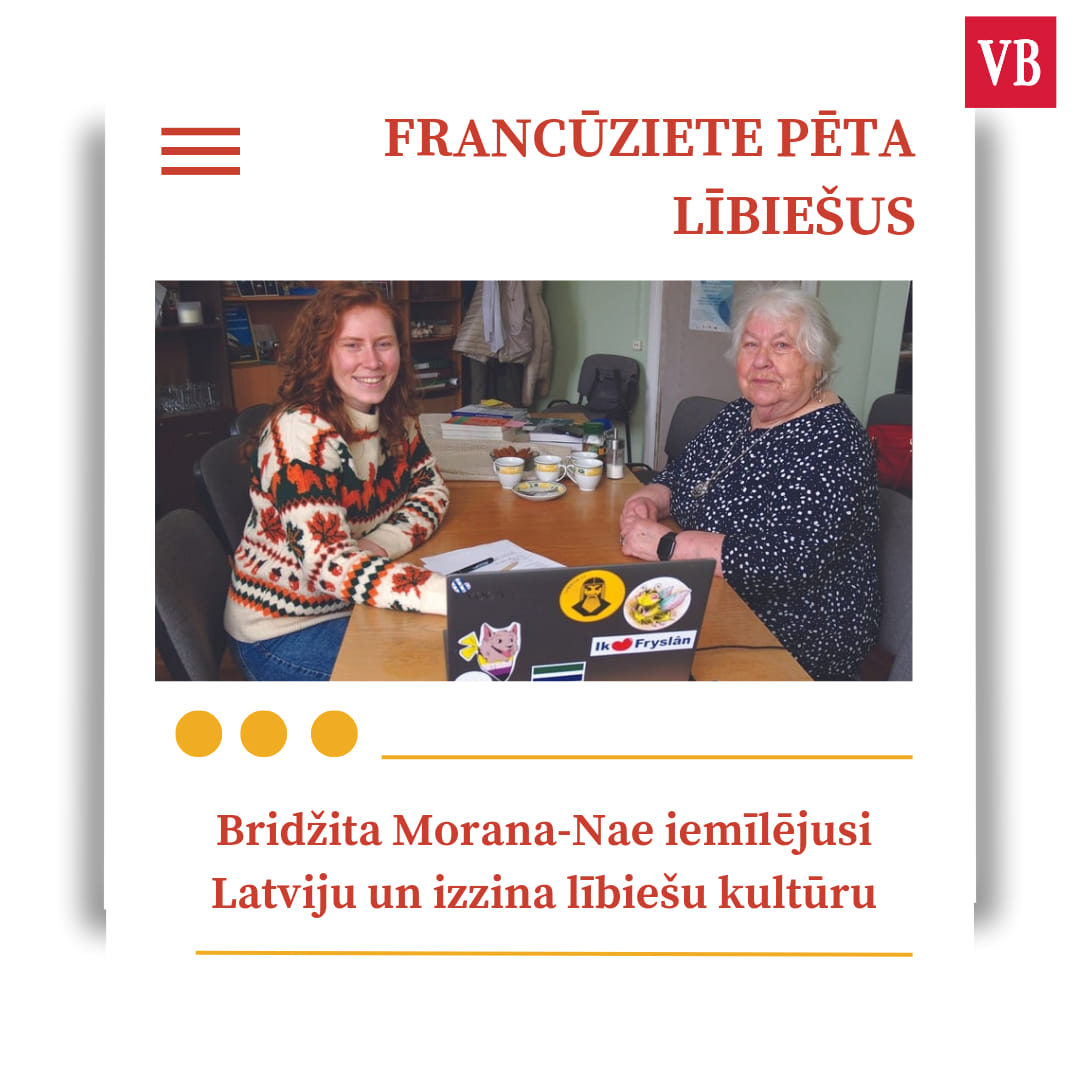
April 17
The first meeting of the weekly Livonian book club “Vešpraiga” organized by Zoja Sile is taking place at the Livonian Institute of the University of Latvia.
Meetings of the book club “Vešpraiga” are scheduled every Wednesday at 18.00 on the premises of the institute.

April 5
Milda Kurpniece, a researcher at the Livonian Institute of the University of Latvia, participates in the Young Doctors’ Conference of the University of Tartu.
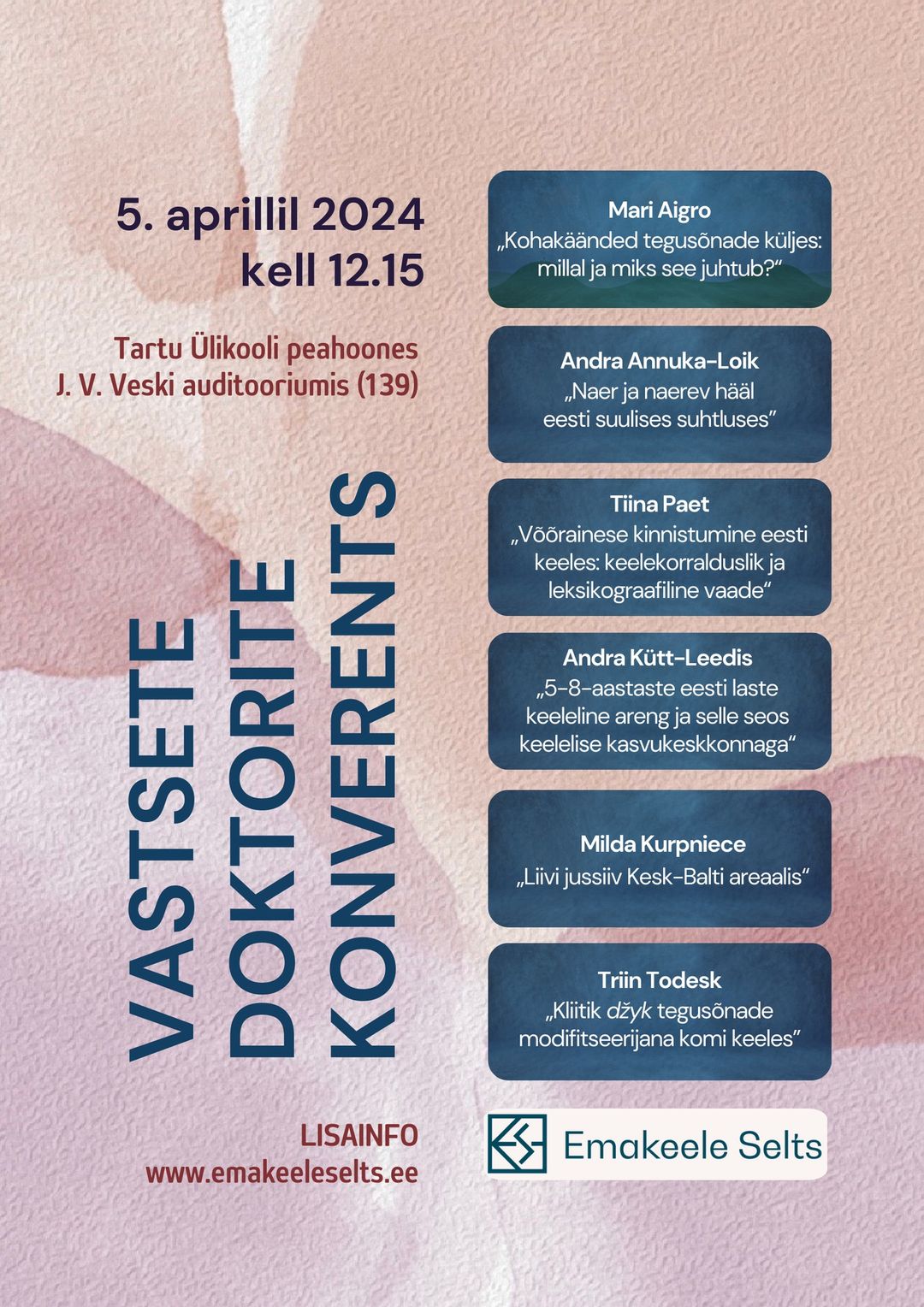
April 4
Students from Liepāja, Jelgava and Riga participated in Ēnu diena (Shadow Day) at the Livonian Institute of the University of Latvia, as well as the Latvian National Commission for UNESCO with students from Pāle. This means that the students got to follow the researchers of the Livonian Institute for a day to find out more about the work at the Institute and get career insights.
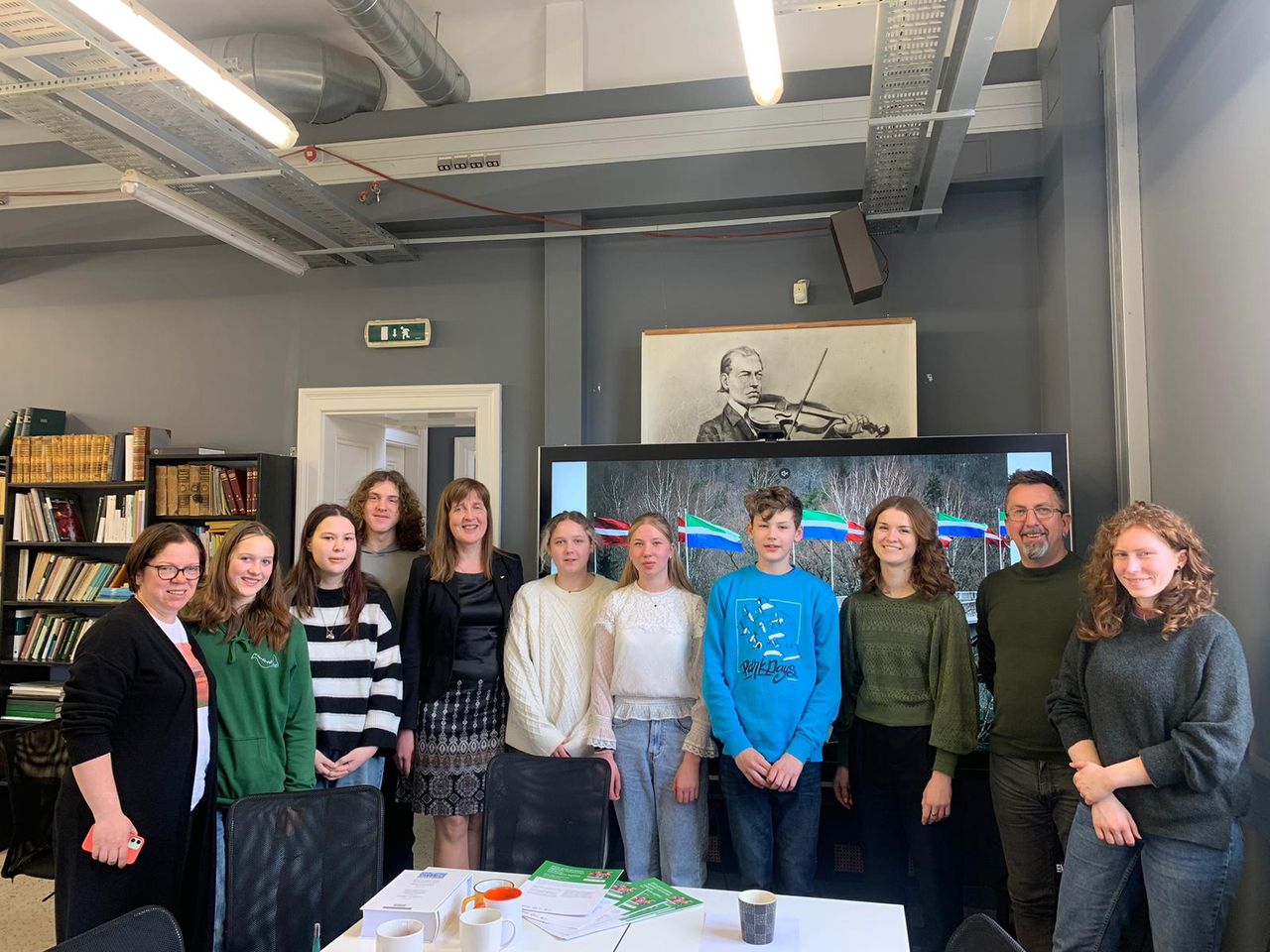
March 31
Happy Easter! Rīemliži Lejāvõtāmidi!
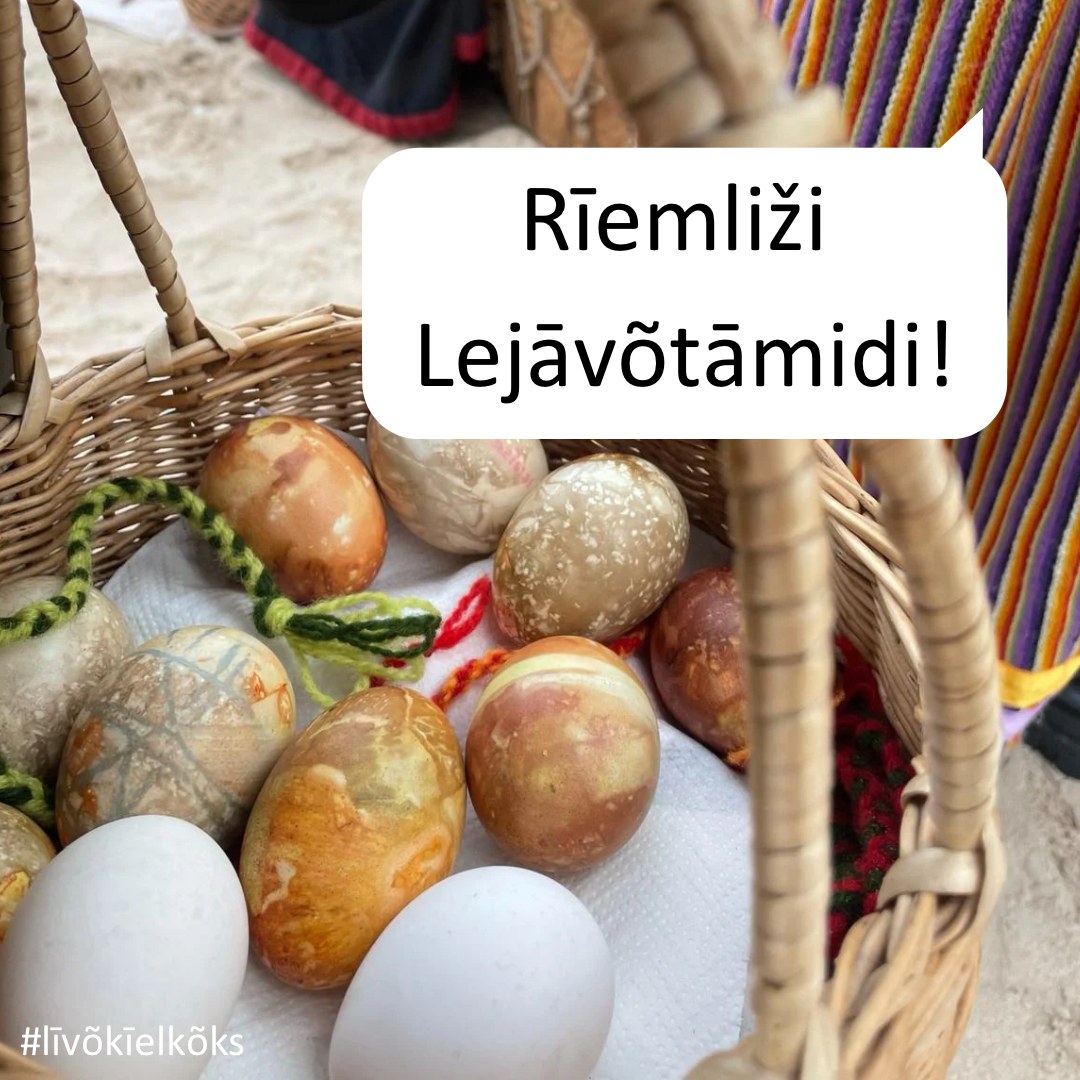
March 24
For the second time throughout Latvia, the Day of Livonian Heritage is celebrated in the regions once inhabited by the Livonians, which this year takes place on March 24 – the first Sunday after the spring solstice – with the awakening of birds and the raising of the Livonian flag.
This tradition is one of the central events of the Year of Livonian Heritage announced in 2023, which symbolically honored the Livonian roots of Latvian regions.
A description of the locations and traditions of the Day of Livonian Heritage is available at libiesugads.lv.
A look back at the events and developments of the 2024 Day of Livonian Heritage can be seen on the Facebook page of the Livonian Institute.
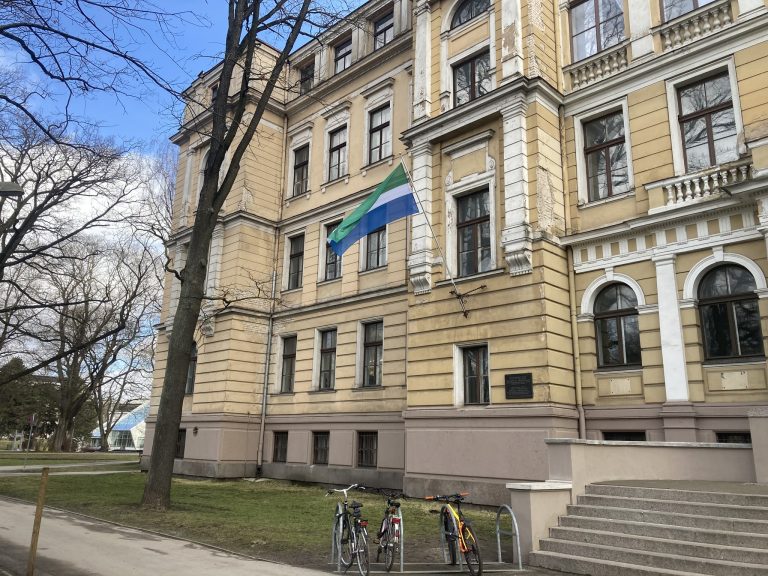
March 19
To introduce the Day of Livonian Heritage, Valts Ernštreits and Kārlis Vērdiņš visited Krimulda secondary school.
There they held a lesson on Livonian traditions, events for the Day of Livonian Heritage and poetry readings. Kārlis Vērdiņš published the collection of poetry “Livonian ballads” in 2023, translated into Livonian by V. Ernštreits.
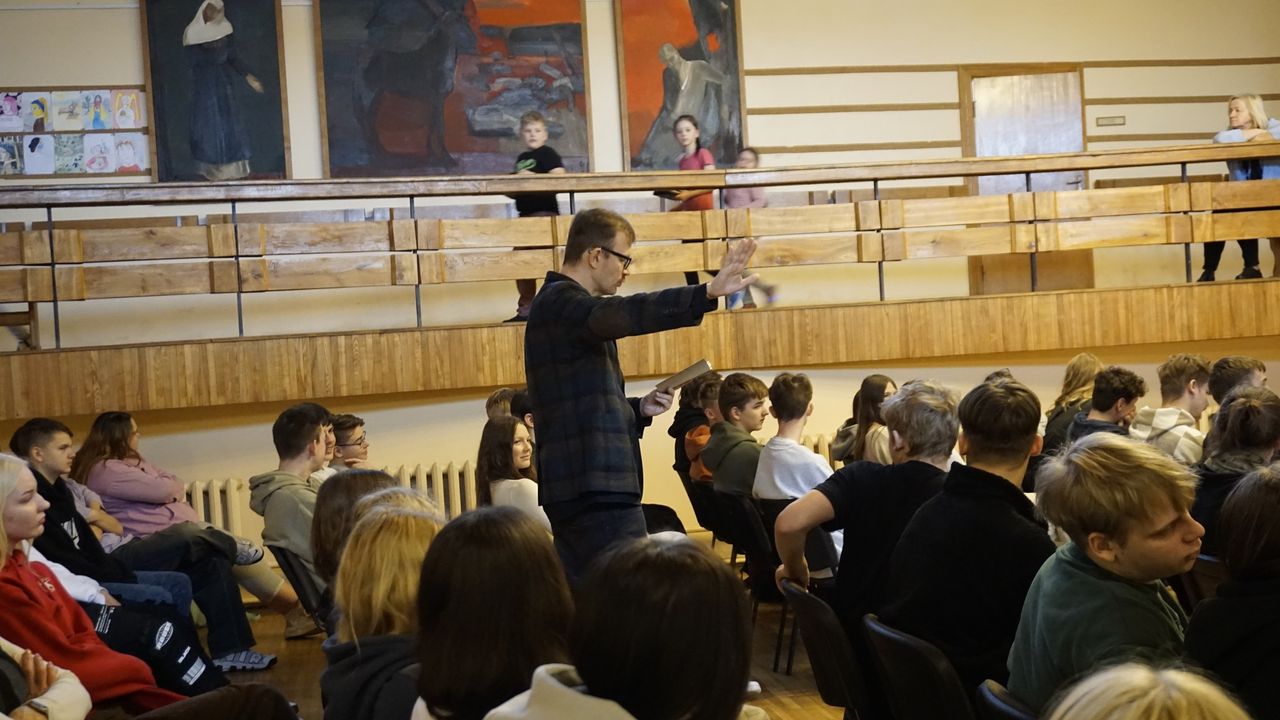
March 16
The Livonian language textbook compiled by Miina Norvik, a researcher and lecturer at the University of Tartu, and Tuuli Tuisk, a researcher at the University of Tartu and the Livonian Institute of the University of Latvia, has won a special award from the Ministry of Education and Science of Estonia.
We congratulate our colleagues and are proud of the important work in the research and preservation of the Livonian language!
March 15
The Commission of Livonian Language Experts established by the State Language Center met for its first meeting at the Livonian Institute of the University of Latvia. The language of its work and record keeping is the common language of all members of the commission is Livonian.
Thus, the Commission of Livonian Language Experts has become the first institutional formation since 1940 and the first state-established institution in the history of the Republic of Latvia, whose working and record-keeping language is Livonian (the commission’s minutes will also be available with a translation into Latvan). As of today, the State Language Center is considered to be the first state administration institution that officially uses the Livonian language as a working language.
At its first meeting, the commission elected its chairman – Tartu University professor Karl Pajusalu, and the secretary – head of the Livonian Institute of the University of Latvia and researcher of the Livonian written language Valts Ernštreits. The commission also includes Livonian morphology researcher Milda Kurpniece, phonetics researcher Tuuli Tuisk and Livonian language expert Gita Kūla. Several decisions were also made at the meeting, including the approval of the alphabet of the standard Livonian language and Salaca Livonian language. Recommendations for the use of local names and other issues were also discussed.
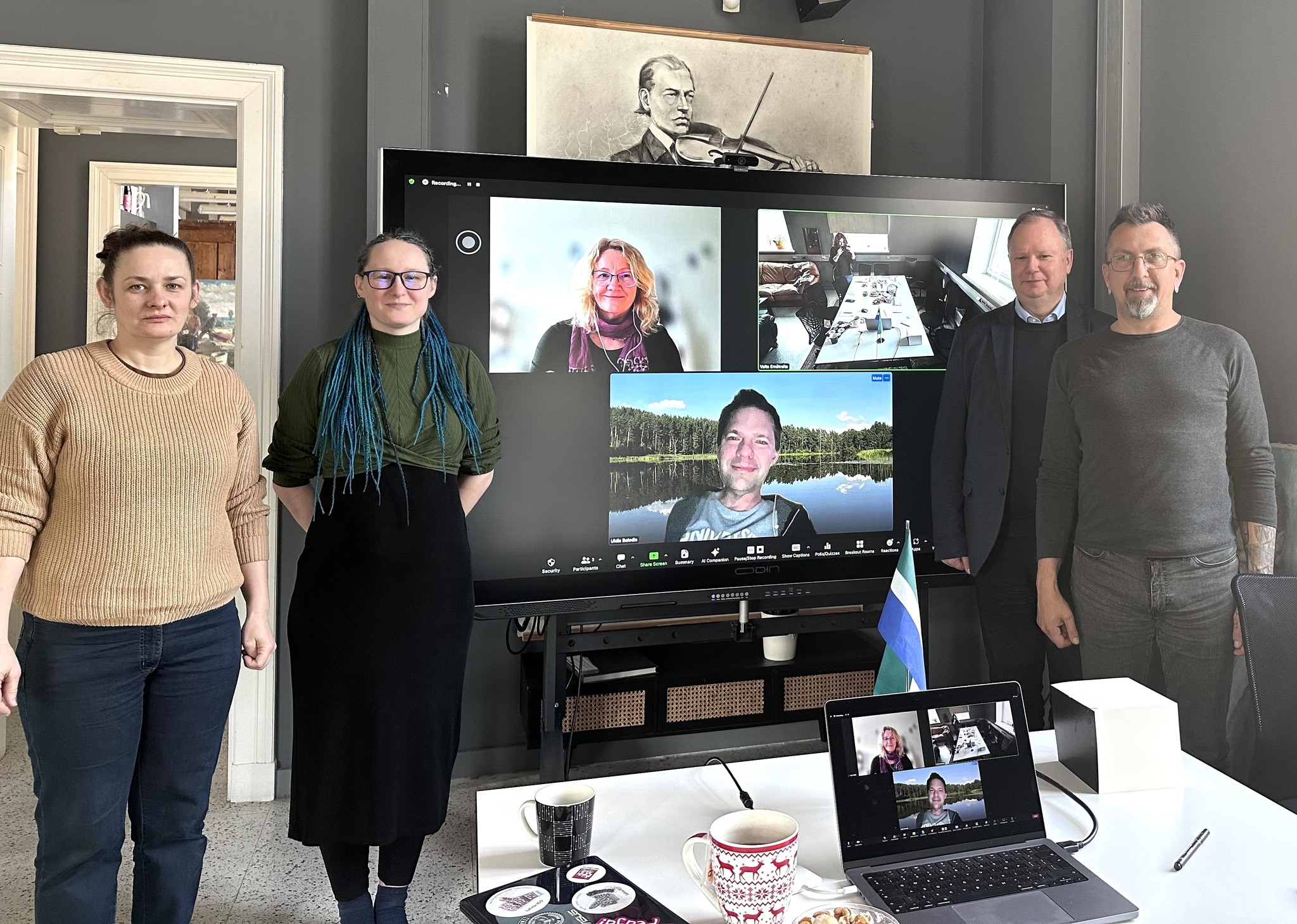
March 14
Today we are celebrating Estonia’s Mother Tongue Day alongside them. It is celebrated on the birthday of the first known Estonian poet, Kristjan Jaak Peterson, who was born in Riga.
On March 14, a moment of remembrance took place at the memorial of Kristjan Jaak Peterson in Riga, in the Great Cemetery, while at the Embassy of the Republic of Estonia, Karl Pajusalu, a professor of the University of Tartu, a Livonian researcher and a member of the scientific council of the Livonian Institute of the University of Latvia, told a story about the present day and history of the Estonian language.
The author of the memorial medal to Kristjan Jaak Peterson is Jānis Strupulis. Collection of Tenu Karma at the Livonian Institute.
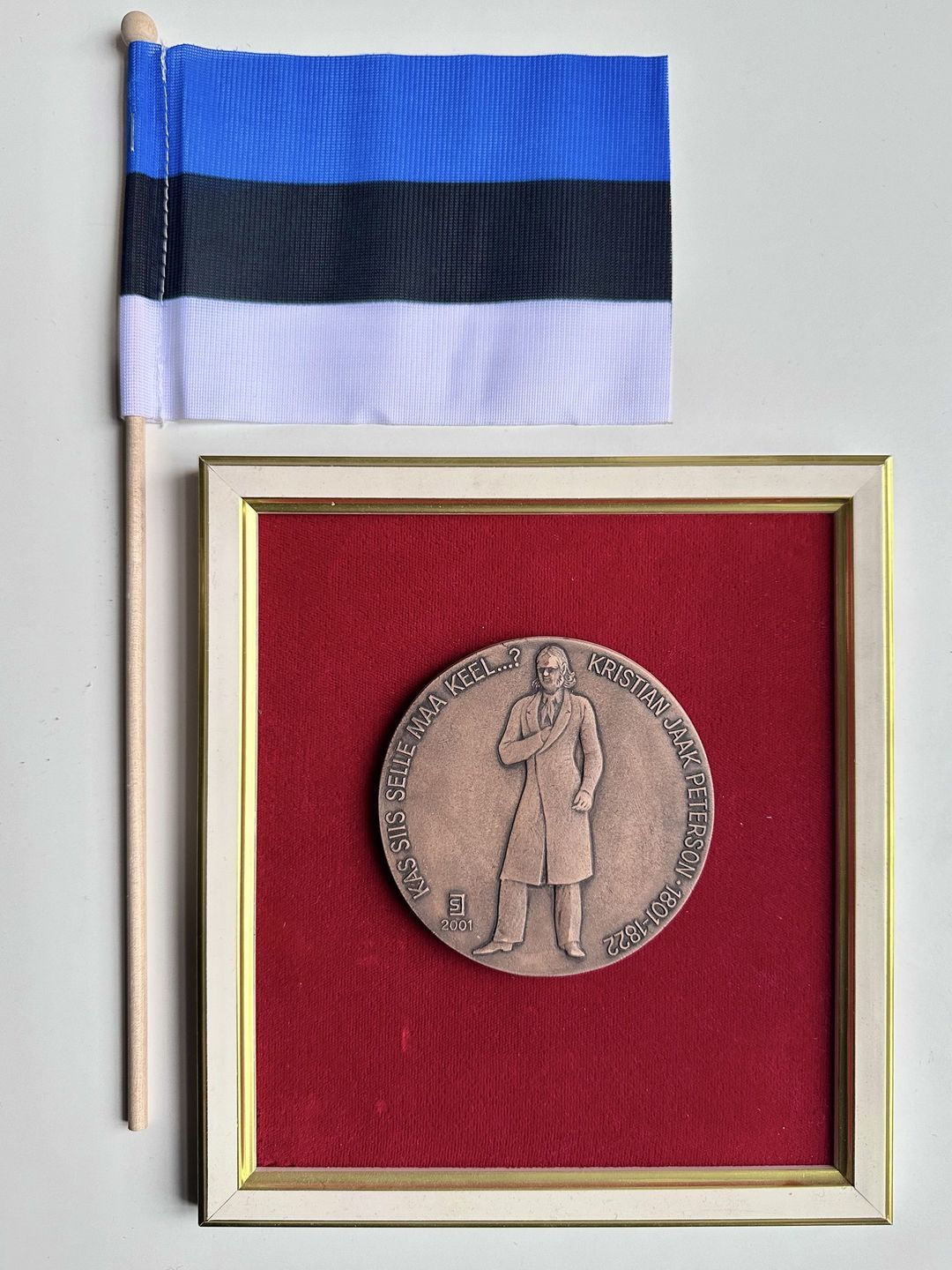
March 11-16
Karl Pajusalu, professor of the University of Tartu, member of the Scientific Council of the Livonian Institute of the University of Latvia, member of the Commission of Livonian Language Experts, and researcher of the Livonian language, is visiting Latvia.
At the Faculty of Humanities of the LU, the professor will give lectures to students of Finno-Ugric Studies.
On March 11, LU HZF in the 422nd auditorium at 10.30, the professor will give a lecture entitled “Finnic languages and dialects in the Central Baltic area”.
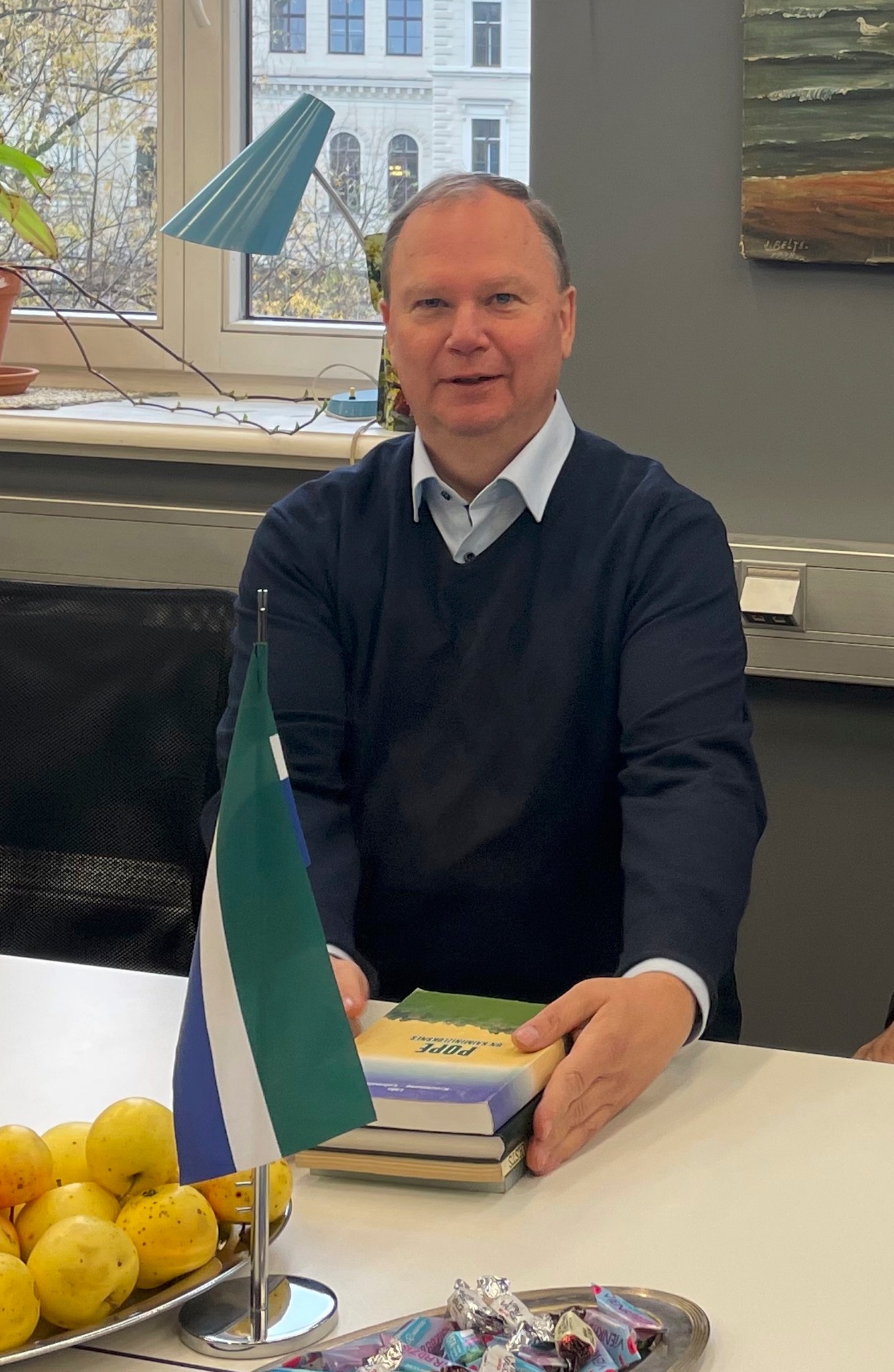
March 8 - April 14
From March 8 to April 14, Bridget Moran-Nae, who studies linguistics in the Netherlands, at the University of Groningen, will be visiting the Livonian Institute at the University of Latvia.
In her master’s thesis, she studies the role of music ensembles in the revitalization and transmission of the language, for which she will conduct interviews with members of Livonian music ensembles.
March 9
105 years ago – on March 9, 1909 – Pēteris Dambergs was born in Sīkrõg. He was a speaker of the Livonian language, storyteller, collector, researcher and teacher.
Damberg’s lifelong work in the maintenance of the Livonian language and his collections of the Livonian language are the basis of scientific works in the Livonian language and about the Livonian language.
Damberg’s collections cover all of the language system. They are used both in scientific research and in the creation of new products and materials of the Livonian language available to the general public. P. Damberg’s collection of Livonian place names, which has been transferred to the archive of the Livonian Institute with the kind care of his family, forms an important part of the database of Livonian place names created at the institute (livonian.tech). Also, in cooperation with SIA “Jāņa sēta”, a map of Livonian place names is available on the BalticMaps website.
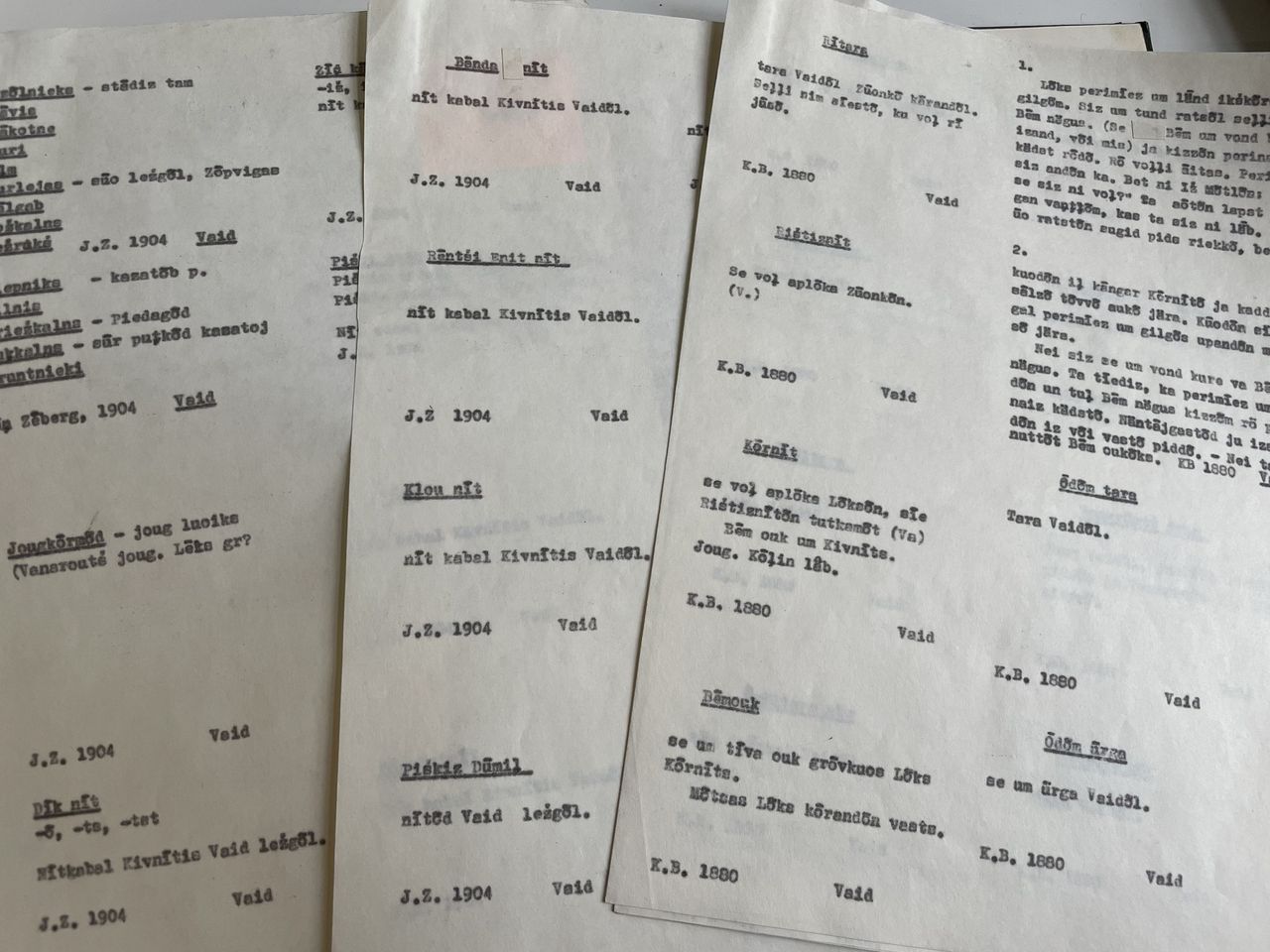
March 5
On the Latgalian cultural news portal “Lakuga”, you can read Edīte Laime’s interview with the maintainer of the Livonian cultural space of Vidzeme, doctoral student of the Latvian Academy of Culture and visiting researcher of the Livonian Institute Lolita Ozoliņa.
Read the interview here. Photo by Amanda Anusane.
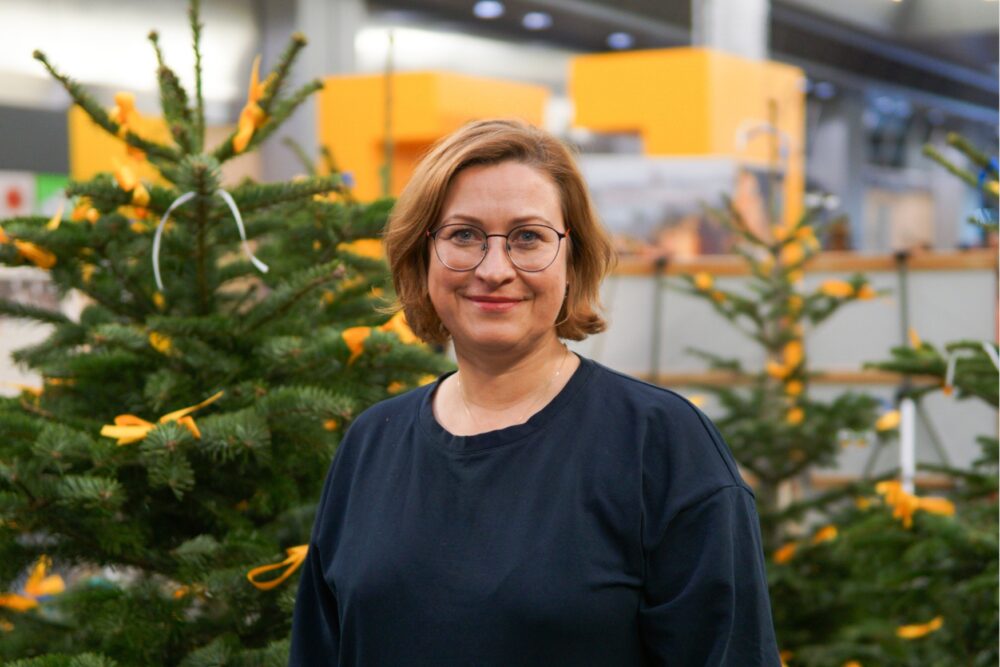
March 5
The University of Vienna has received funding for the Erasmus+ program project URSUS (Universities in Cooperation for Resilience and Sustainability in Uralic Studies), in which the Livonian Institute is one of the partner institutions.
19 European universities are cooperating in the project. Uralic (Finnish) languages are studied and taught at all of these institutions.
March 4-8
The course “Livonian language and culture” is held for the students of RTU Liepāja Academy’s Cultural Management Bachelor’s program, which is taught by researchers of the Livonian Institute.
This course is held for the third time. The participants of the course not only got to know the Livnian world, but also prepared conceptual sketches of ideas for the preservation and popularization of the Livonian language and culture, expanding their understanding of the diversity of Latvia’s culture and its importance in society. Therefore, the course served as a source of knowledge and inspiration not only for its participants, but also for us.
And one more insight that was revealed in the conversations with the course participants – even for a student who was already studying this second higher education program, this was the first time that Livonian was mentioned during their studies. We are glad that our course helps to change Latvian higher education and make it better, providing a high-quality and comprehensive picture of Latvia’s cultures and languages.
February 24
The winter session of the children’s and youth summer school “Mierlinkizt” is held at the institute.
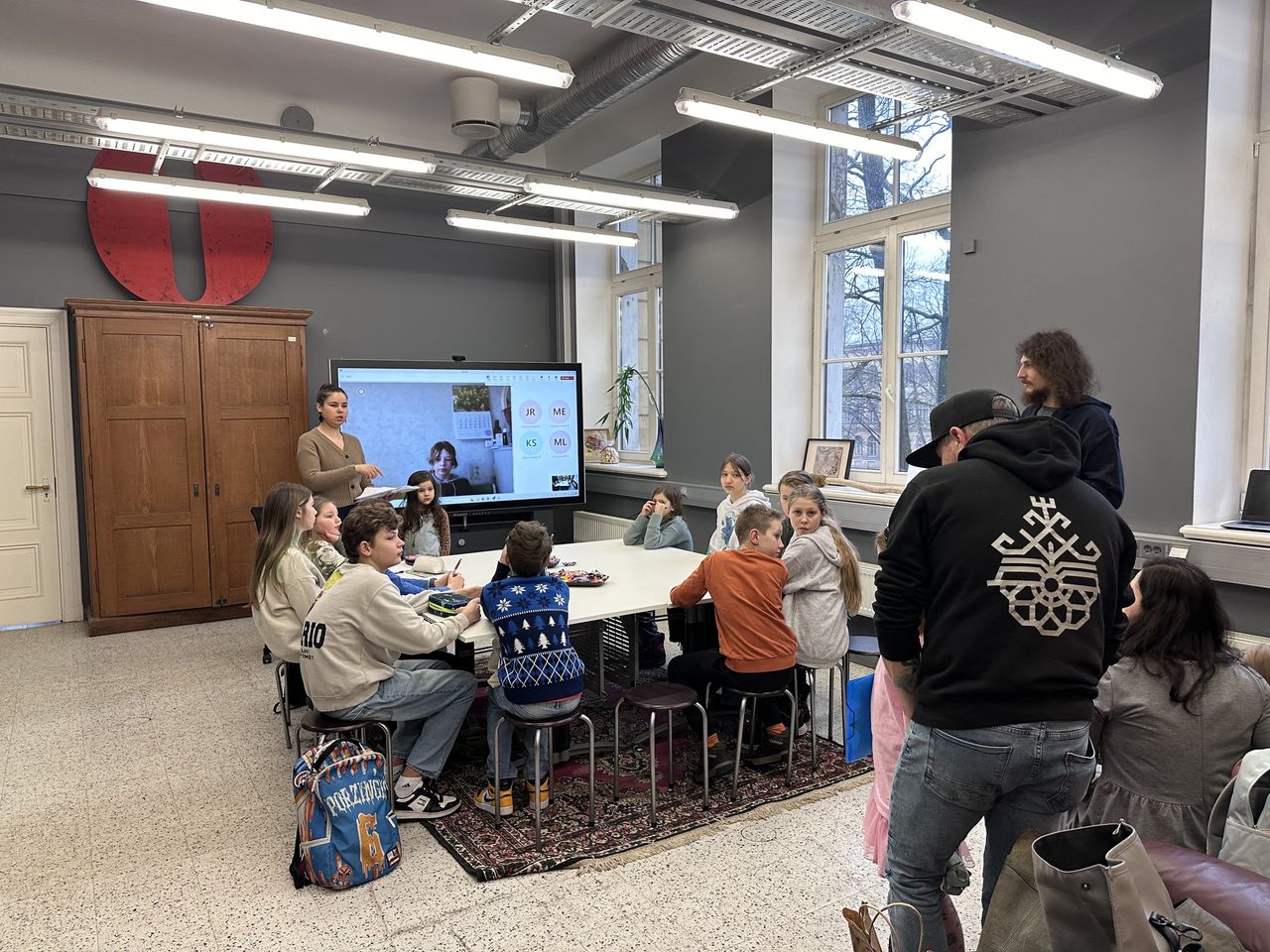
February 21
On the International Day of the Mother Tongue, the Livonian Institute listens to the sound of the Livonian language in the past and now.
At the institute, we celebrate this day by interviewing speakers of the Livonian language – both the long-time teacher of Livonian, Zoja Sīle, and our colleague Gita Kūla and her mother Maija Norenberga, both of whom have inherited and preserved their knowledge of the Livonian language in the family.
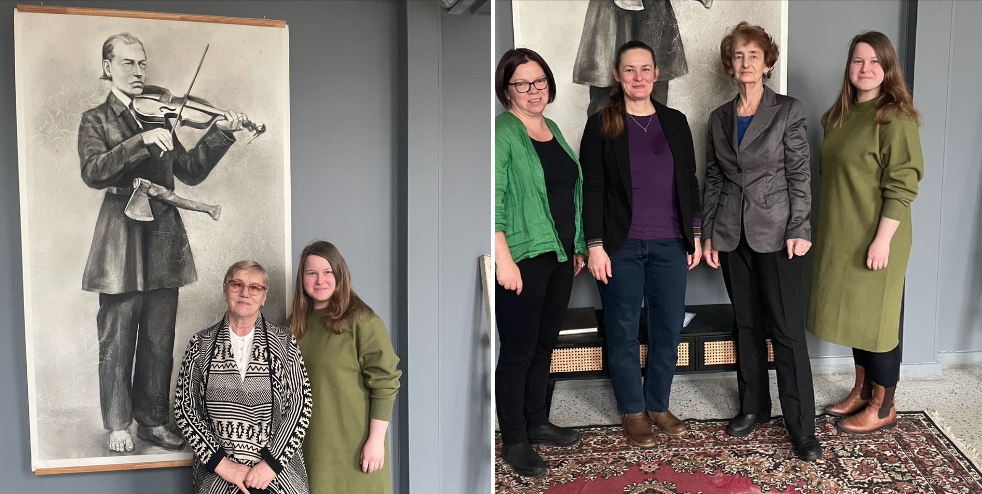
February 5-10
Uppsala University in Sweden is hosting the 2024 Winter School of Finno-Ugric Studies, which is part of the Erasmus+ funded strategic partnership REMODUS.
The program was attended by students and researchers from various European universities – Budapest, Hamburg, Helsinki, Munich, Riga, Szeged, Tartu, Turku, Uppsala and Vienna.
The event was attended by the researchers of the Livonian Institute – Milda Kurpniece and Anna Sedlačkova. They had the unique opportunity to learn more about, for example, the ancient Finnish language and participate in seminars on language revitalization in theory and practice. Milda also informed participants about the upcoming conference “Livonica 3 + Minor Finnic Languages 2 = 5” organized by the Livonian Institute, while Anna spoke about the assessment of vitality and future perspectives of minority languages in the Baltics.
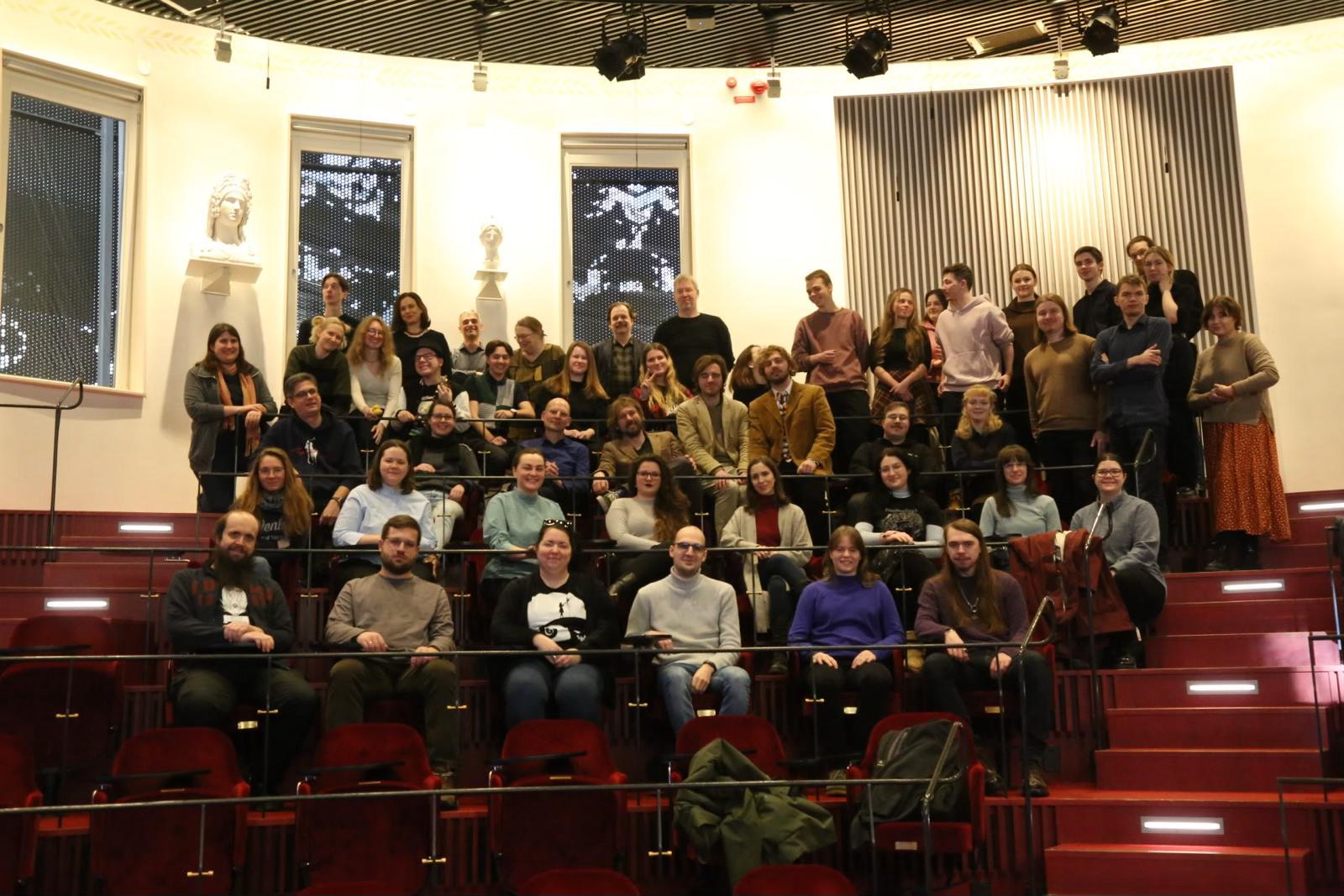
February 5
The 11th episode of the documentary series about peoples of Estonian descent, which can be viewed on the Estonian public media, is dedicated to the Livonian Institute of the University of Latvia.
Watch it here.
January 31
The section “Grammar and language electronic resources” (“Gramatika un valodas elektroniskie resursi”) of the 82nd international scientific conference of the University of Latvia is held at the Faculty of Humanities of the University of Latvia.
Researcher Milda Kurpniece participated in the conference with a report on how we at the Livonian Institute teach technology to recognize whether a language phenomenon is an individual feature of human language or characteristic of a community language, and how it can help in the creation of Livonian language learning and research resources.
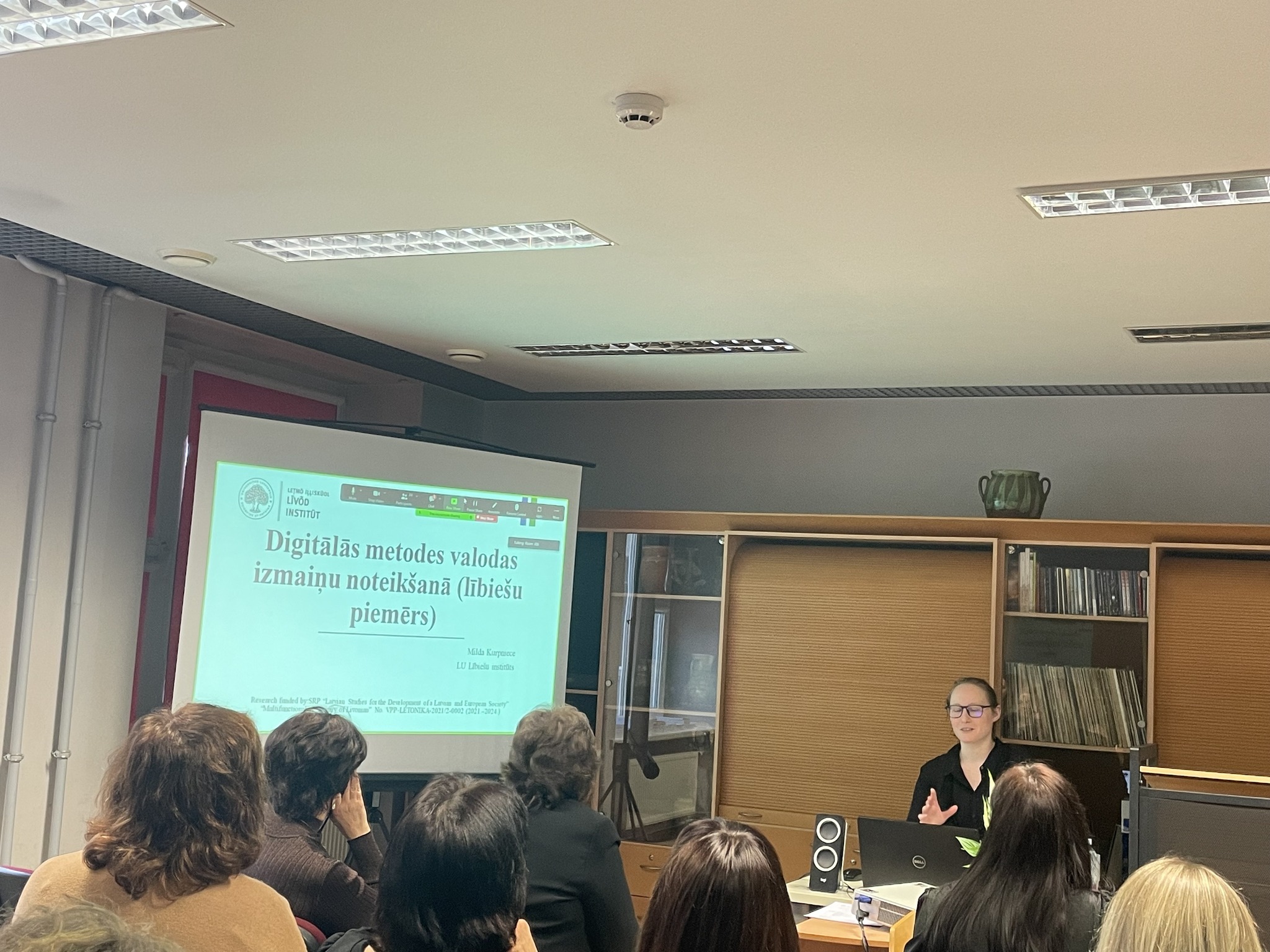
January 30
Estonian public media is showing a documentary series about peoples related to Estonia, and its 10th episode is dedicated to Livonians and was filmed around the time of last year’s Livonian festival.
In the program, through the eyes of the Estonian film crew, you can look back at the celebrations and the president’s visit, as well as a little at the Livonian Institute of the University of Latvia and the traces of the Livonians in Riga.
Watch it here.
January 25
“Livonian ballads / Līvõd balādõd” by Kārlis Vērdiņš has been nominated for the LSM annual award “Kilograms of Culture”.
Kārlis Vērdiņš’ latest collection of original poetry “Livonian ballads” is a bilingual collection in Latvian and Livonian (translated by Valts Ernštreits).
The collection was published by the publishing house “Neputns” in 2023.
Watch the LSM report about it here. The book can be purchased here.
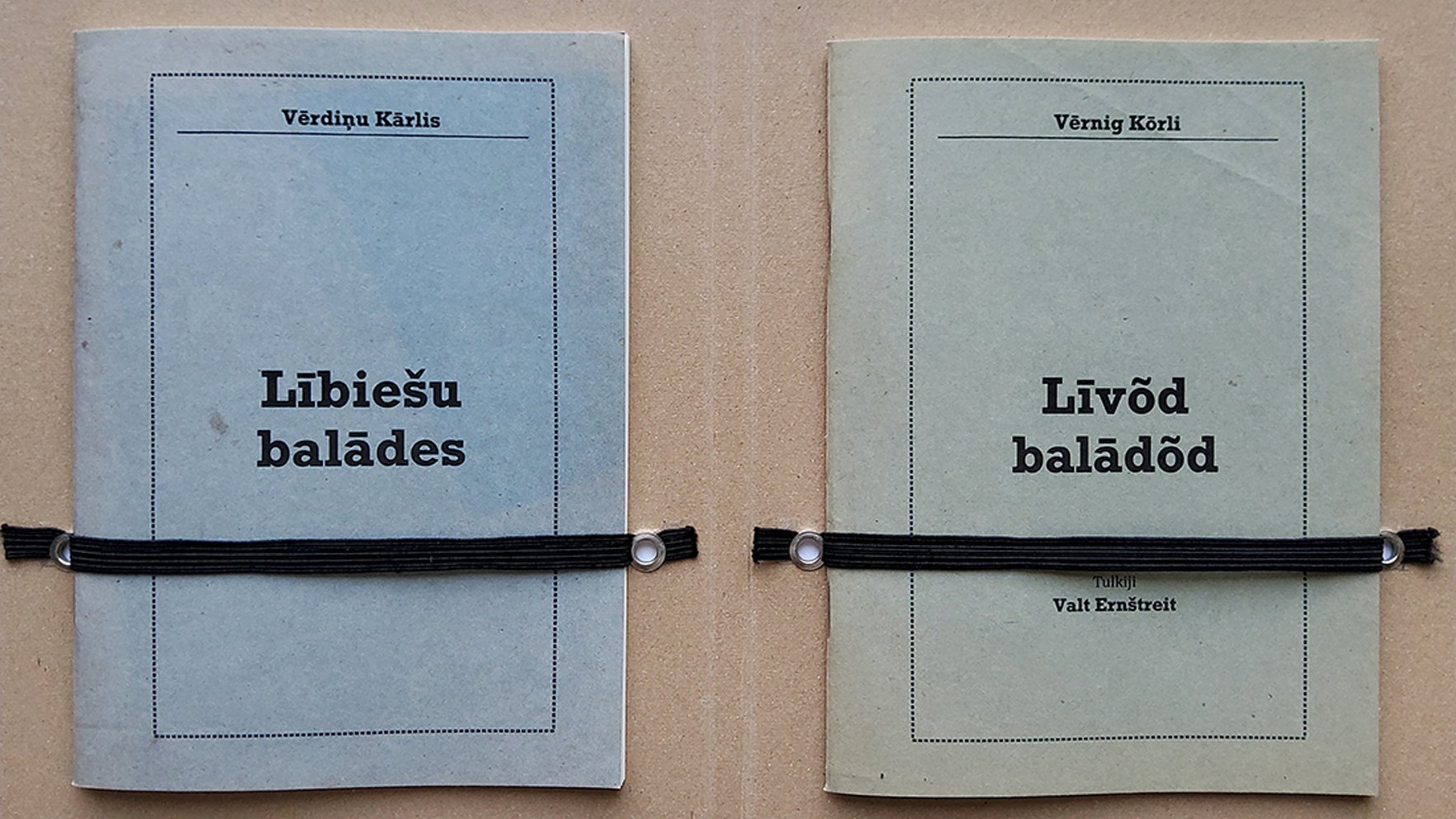
January 22
The database of Livonian place names developed by the Livonian Institute is available on the “Jāņa sēta” map on the website www.BalticMaps.eu, which can be set to display text in Livonian.
The Livonian place names gathered and standardized in the Fundamental and Applied Research Program project “Identification, mapping and creation of the register of official place names” (“Lībiešu vietvārdu apzināšana, kartēšana un oficiālo vietvārdu reģistra izveide”) (No. LZP-2019/1-0240) – from countries to streams, houses and even trees. The website texts themselves were also translated, which hopefully will serve as a good example for others as well.
The database of place names can also be viewed on the Livonian language and culture resource platform www.Livonian.tech.
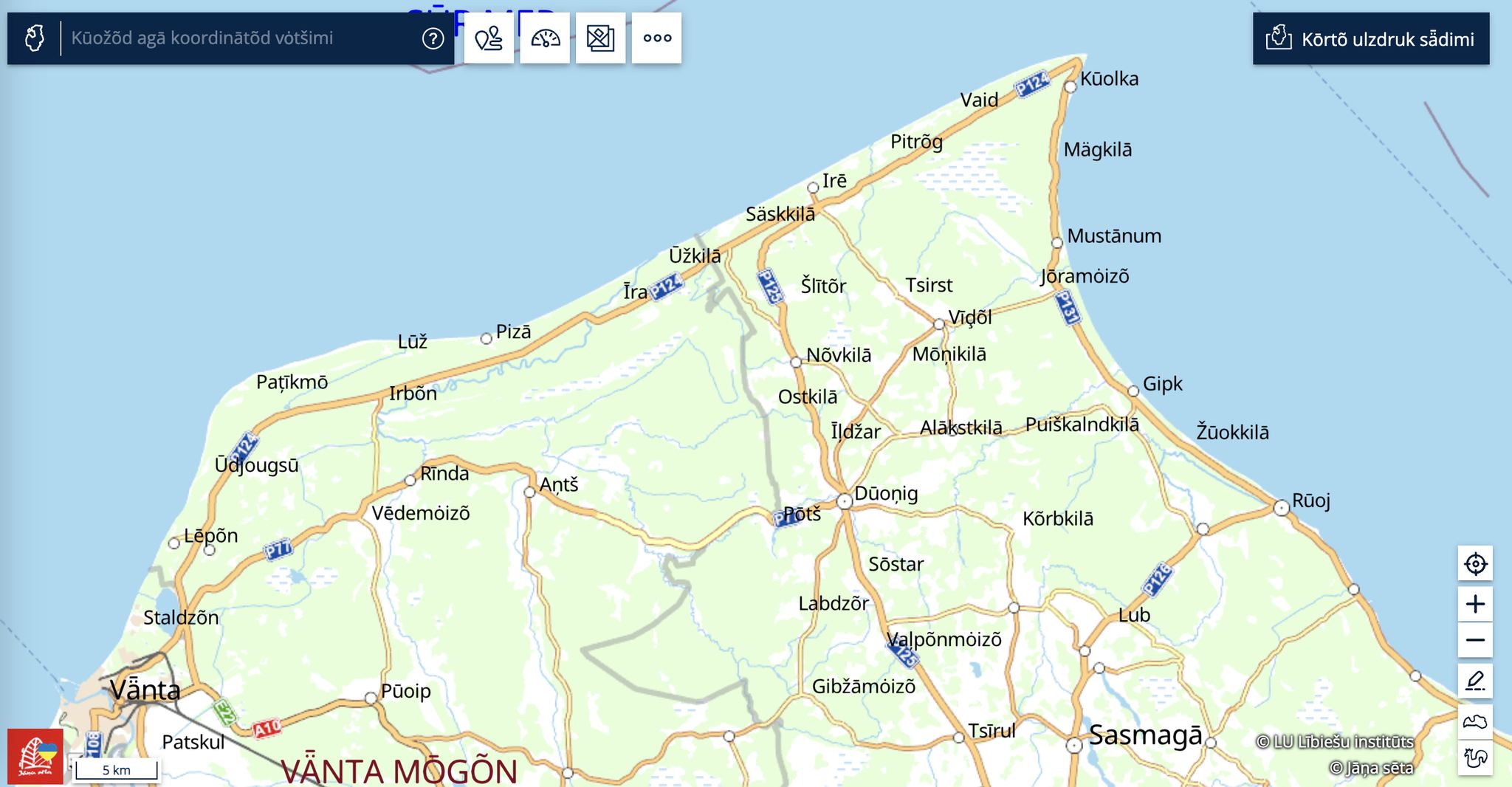
January 15
The Commission of Livonian Language Experts was established by the decision of the State Language Center.
It will feature Gita Kūla, Milda Kurpniece, Karl Pajusalu, Tuuli Tuisk and Valts Ernštreits. The commission’s tasks will include various issues of spelling and standardization of the Livonian language.
January 10
In the district of Aizkraukle, the event “Event of the year in Aizkraukle” (“Gada notikums Aizkrauklē”), which celebrates the most important events of 2023, the project “Traces of the Daugava Livonians in Aizkraukle district” implemented by the Culture Department of Aizkraukle district in cooperation with the Livonian Institute of the University of Latvia became the event of the year in the nomination “Heritage”.
Thank you to the district of Aizkraukle for their cooperation, for the recognition and the fact that it was the involvement of the district of Aizkraukle in the events of the Year of Livonian Heritage that made the year and the Livonian heritage shine brightly in all areas historically inhabited by the Livonians.
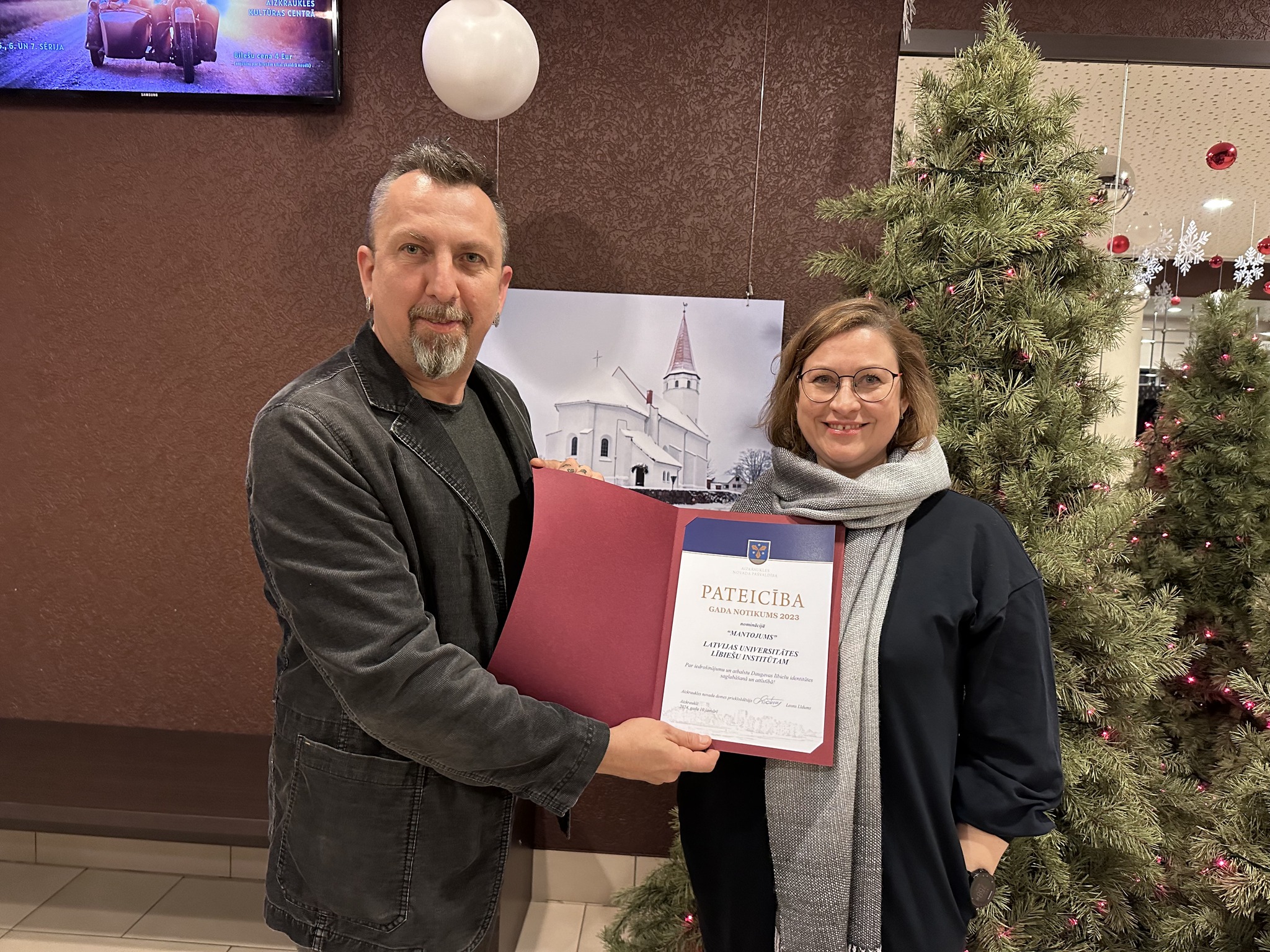
January 10
In Estonia, in Ikla, by the Latvian border, in a cafe with the Livonian name “Ovat” (Source), information stands have been set up, introducing the Livonians and their heritage.
The idea was created in cooperation between Vidzeme’s Livonian cultural space and the Institute of Estonian and General Linguistics of the University of Tartu and with the practical support of the Livonian Institute, and it continues the work of popularizing Livonian roots, which started in the Year of Livonian Heritage.
The location of the exhibition has been purposefully chosen to introduce residents and guests of the Estonian-Latvian border to the shared heritage – the Livonians of Vidzeme, the historical territory inhabited by them, the most characteristic archaeological evidence – clothing and ornaments, as well as the customs of seaside life, the Livonian language of Salaca, and the names of birds and seasonal events.
The project was implemented within the framework of the international project “Re-voicing cultural landscapes: narratives, perspectives, and performances of marginalized intangible cultural heritage”.
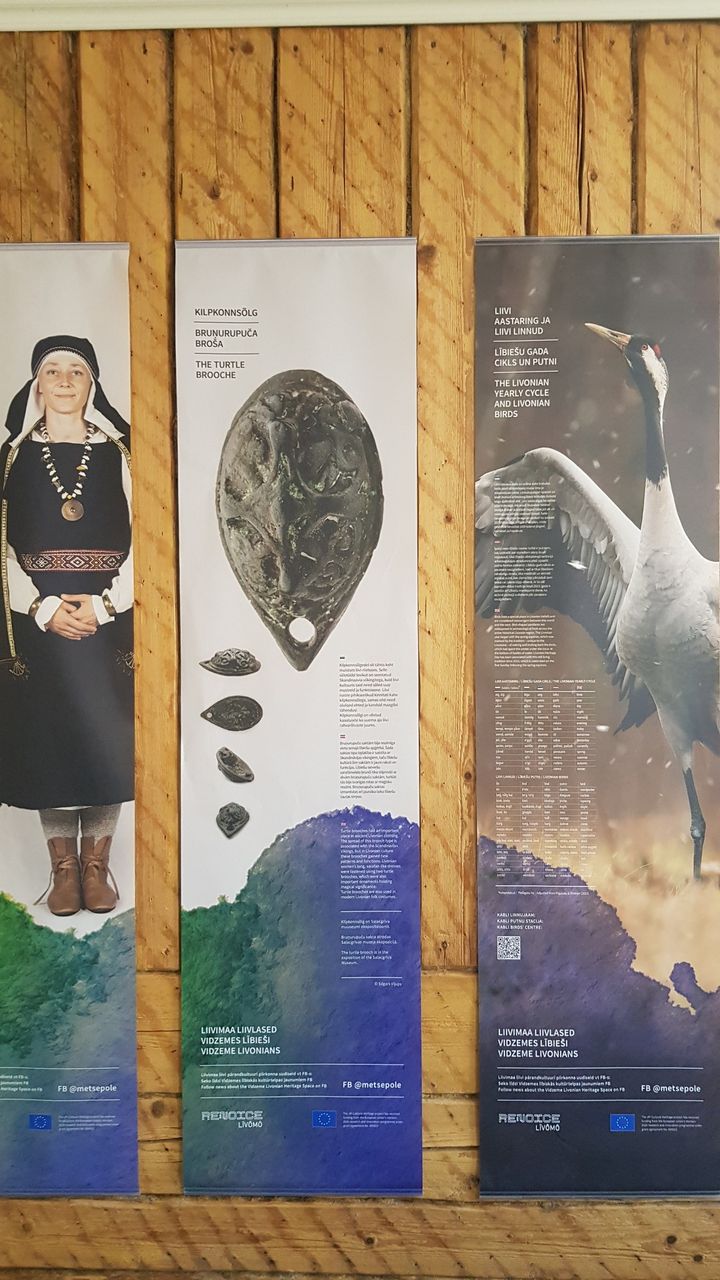
January 5
TV9 Pakalni broadcast about a historical event – road signs installed on the coast in the Livonian language.
There are fewer of them than initially expected, but Livonians are happy about the first step.
Watch it here.
January 1
The Livonian Institute of the University of Latvia is launching the implementation of the project “Lībiešu valodas pārmantošana: zināšanas par kritiski apdraudētas valodas transmisiju mūsdienās kā pamats procesā balstītu valodas saglabāšanas un revitalizācijas instrumentu izveidē” (Continuity of Livonian: Understanding language transmission processes in a critically endangered contemporary indigenous community to develop process-driven instruments for preservation and revitalisation) from the Fundamental and Applied Research Program project competition (2023) (principal investigator – Gunta Kļava; No. lzp- 2023/1-0264).
The project will study the processes of transmission of the Livonian language, so that in the near future it will be possible to create the most effective solutions for the preservation and development of the language, based on the ways of passing on the endangered language to future generations today.
The project will last from 01.01.2024. until 31.12.2026
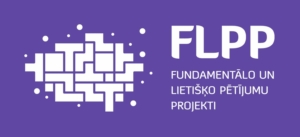
January 1
The Latvian National Commission for UNESCO, the Livonian Institute of the University of Latvia and the Latvian National Cultural Center have issued a calendar for 2024.
The calendar is a retrospective of the events of the Year of Livonian Heritage and the UN Decade of Indigenous Languages jointly announced by its creators.
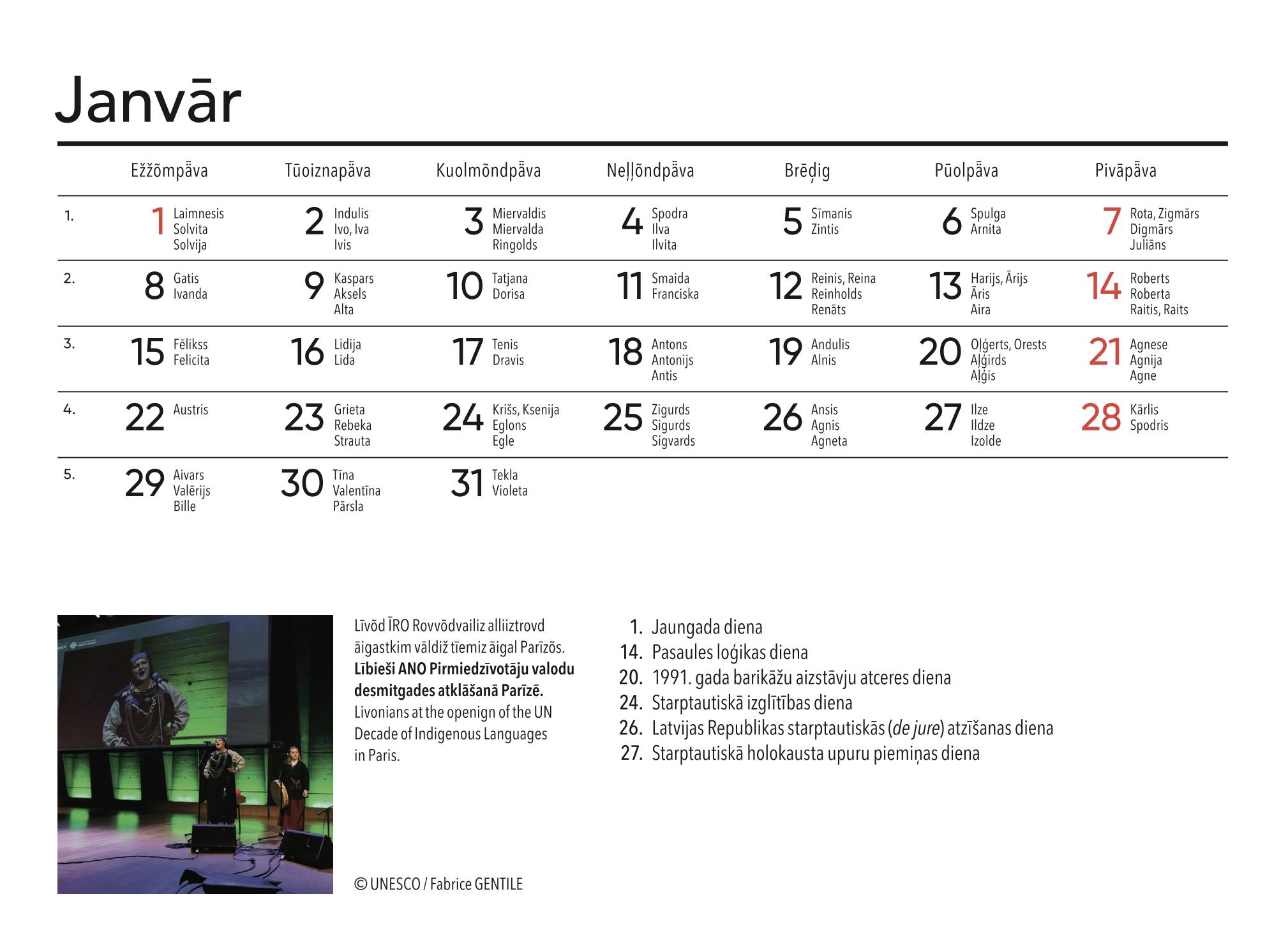
26. novembris

26. novembris

2. decembris

2. decembris

2. decembris

2. decembris



